Maps & Merlot

African Safari Travel Tips: 20 Top Things to Know Before Going on Your First Safari
Welcome to the wild and wonderful world of African safaris! If you’re anything like me, you’ve probably dreamed about going on an African safari for as long as you can remember. The thought of being immersed in the breathtaking landscapes, encountering majestic wildlife, and creating unforgettable memories is simply irresistible. Well, guess what? I FINALLY had the opportunity to embark on my first safari, and let me tell you, it was an experience like no other. But here’s the best part: I learned so much along the way, and now I’m here to share my top 20 African safari travel tips with all of you.
From picking the right time to visit to packing the right gear, and from capturing jaw-dropping photographs to avoiding the less pleasant nuisances (dust, malaria), these tips will help ensure that your first safari is nothing short of extraordinary. So, grab your binoculars, pack your khaki, and join me as we delve into the 20 things you need to know before going on your first African safari!
This post may contain affiliate links.
Overview: African Safari Travel Tips
In case you need it, here are your top African safari travel tips and the best things to know before going on your first safari. I get into loads of detail below, but keep this list as a cheat sheet!
- Pick the Best Time to go on Safari
- Plan for At Least 1 Week
- Incorporate a Rest Day After Your Flight
- Plan for Laundry
- Dress the Part
- Prepare for Cold, Heat, Rain, & Sun
- Purchase (or Rent) Quality Camera Gear
- Take lots of Photos
- Bring Binoculars
- Decision Time: Private Guide vs. Group
- Wake Up Early
- Bathroom on Safari
- Prepare for Dust
- Be Medically Prepared
- Enjoy Sundowners
- Patience is Key
- Communicate with Your Guide
- Bring Cash for Tips
1. Pick the Best Time to go on Safari
Choosing the best time to go on safari is a key factor in ensuring an incredible wildlife experience. I went to Tanzania in the first week of September, precisely when the Great Migration of wildebeest was putting on its grand show across the Mara River. From July to October, millions of wildebeest, zebras, and gazelle journey across the Serengeti in the “Great Migration.” But the real showstopper is the river crossing—wildebeest braving crocodile-infested waters and avoiding rampaging hippos. One word of advice, though: during popular times like the Great Migration, top safari lodges and tour operators can fill up over a year in advance.

However, it’s important to note that the best time to go on safari may vary depending on the specific wildlife sightings you desire and the region you plan to visit. Each season and month offers unique experiences and opportunities, from calving season to the epic river crossings.
In general, the dry season, which typically occurs in winter months, tends to be high season; vegetation is thinner and wildlife tends to congregate around water sources, making animals easier to spot. However, it’s worth noting that the dry season can also be the busiest and most expensive period, as it attracts a larger number of tourists.
On the other hand, you have wet season, which typically occurs in the summer months. The landscape becomes lush and vibrant, and you have more newborn animals. For example, wildebeest calving season usually occurs in the Southern Serengeti in the January-March timeframe, so if seeing baby wildebeest is your ultimate goal, this is your time to go! Although game viewing can be more challenging due to thicker foliage, the wet season tends to have fewer crowds and lower rates for accommodations.
2. Plan for At Least 1 Week
Stay longer than you think! When it comes to going on an African safari, it’s crucial to allocate enough time for your adventure. While you may be tempted to squeeze it into a few days, trust me, you’ll want to extend your stay. The captivating landscapes and incredible wildlife sightings deserve more than just a fleeting visit – every day is different and catching sight of the animals in their natural habitats almost becomes addicting!
I’d recommend allocating at least a week to your safari adventure. Plus, the flights from the US tend to be ridiculous (I think ours was around 30 hours), so I definitely was not in any hurry to get back on the plane and rush home. You won’t regret it, and your safari experience will be all the more rewarding.
3. Incorporate a Rest Day
After a long journey to Africa, it’s essential to allow yourself some time to rest and adjust to the new time zone before embarking on your safari adventure. Consider scheduling a rest day upon arrival to recharge your energy and acclimate to the surroundings. Use this day to relax, explore the area, and get a sense of the local culture. It will ensure that you start your safari feeling refreshed and ready for the incredible experiences that lie ahead.
I am usually not one to pencil in a rest day, but I cannot stress this enough. I landed at 10pm the night before and in no way would have been ready to go on safari the following day. Instead, I caught up on sleep, enjoyed a fresh breakfast, and then spent some time at Kikuletwa Hot Springs. If you’re going on safari in Tanzania and flying into Arusha, I would highly recommend this as a chill day 1 option. This is one of the key African safari travel tips for first-timers.
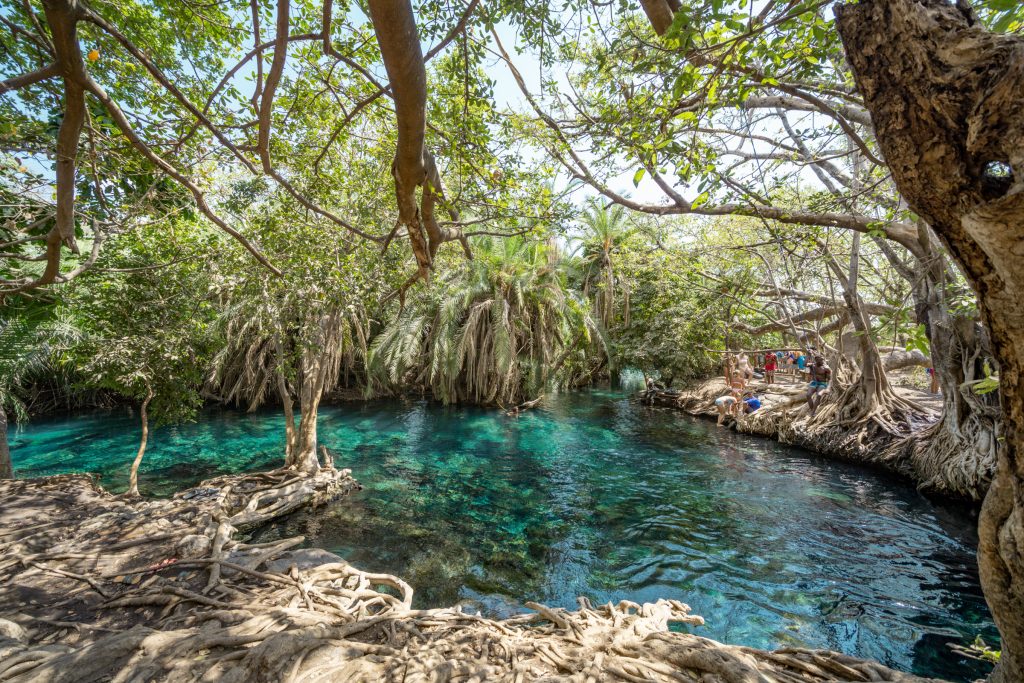
Recommended Tour : Kikuletwa Hot Springs Tour
4. Pack Light
When preparing for your African safari, it’s essential to pack light and efficiently. Keep in mind the baggage allowance on bush planes, as they often have strict weight restrictions. The restrictions also vary by airline. Some allow 15kg (33 lbs), while others allow 20kg (44lbs); some are super strict about hard-sided bags, while others are more lenient. It is definitely worth to investigate in advance.
When packing, choose versatile clothing items that can be easily layered and re-worn. This allows you to maximize your outfit options while minimizing the amount of luggage you need to bring. Plus, some safari camps offer laundry services, so you can refresh your clothes during your stay. I was able to get laundry done mid-trip, so I really only needed a handful of outfits. Plus, you can easily re-wear pants day over day.

5. Plan for Laundry
Speaking of laundry…when it comes to laundry on safari, many hotels offer convenient laundry services to keep your clothes fresh and clean during your adventure. However, it’s important to note that for cultural reasons, the staff do not handle the washing of women’s undergarments, so you’ll need to take care of these items yourselves.
Keep in mind that in more remote or mobile migration camps, laundry facilities might not be readily available, so seize the opportunity to do laundry when it’s offered. I had access to laundry at both of my traditional hotels, but it was not available at the migration camp. Making the most of the available options ensures that you’ll be able to pack minimally and have clean clothing throughout your safari experience.
6. Dress the Part
Dressing the part for a safari is one of the most talked about African safari travel tips. When venturing into the wild, it’s important to dress appropriately to adapt to the environment and weather conditions. Go for lightweight, breathable clothing in neutral colors such as khaki, light grey, light blue, and olive green. These colors help you blend in with the environment. If you’re wondering how in the world to look cute while rocking khaki, don’t worry! I put together a guide on what to wear on safari for women .
Related Post : What to Wear on Safari for Women: 10 Cute Safari Outfit Ideas
Choose long-sleeved shirts and pants to protect yourself from the sun, bugs, and prickly grass. Don’t forget a wide-brimmed hat to shield yourself from the sun’s rays and questionable hair days! Comfortable closed-toe shoes are a must for walking safaris, and I also preferred them even on game drives for whenever I exited the vehicle (bathroom time). Layering is key as temperatures can vary throughout the day, so pack a fleece for chilly mornings or evenings.
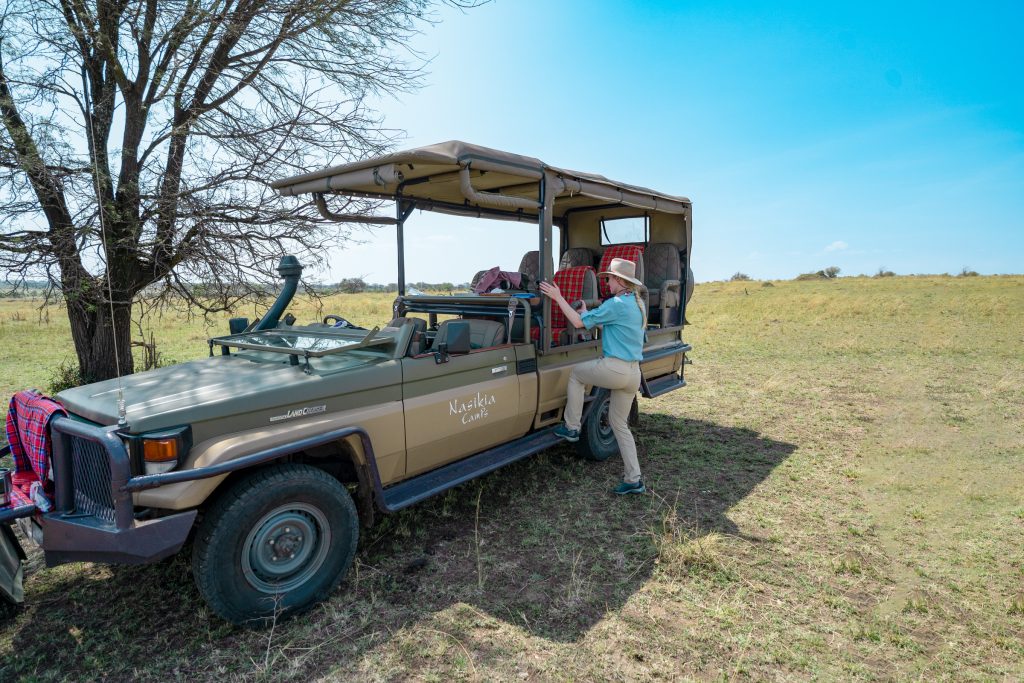
7. Prepare for Cold, Heat, Rain, & Sun
Africa’s climate can be unpredictable, so it’s crucial to come prepared for all types of weather conditions. While the days may be warm and sunny, the evenings and early mornings can get quite chilly. Pack a mix of lightweight and warm clothing, including long-sleeved shirts, fleece jackets, and a good pair of comfortable closed-toe shoes. Don’t forget a hat, sunglasses, and sunscreen to protect yourself from the African sun. Additionally, pack a raincoat in case of sudden rain showers.
During my time in Tanzania, I can confirm that I experienced 40 degree swings in temps during a single day, sudden downpours, tons of dust, and plenty of African heat. Being prepared for various weather scenarios ensures that you can fully enjoy your safari adventure, rain or shine.
8. Purchase (or Rent) Quality Camera Gear
Photography plays a significant role in capturing the magic of your African safari adventure. Invest in quality camera gear to ensure you can capture those memorable moments of hippos yawning, lion cubs playing, and rhinos charging across the Serengeti at sunrise (yes, we saw all of that!)
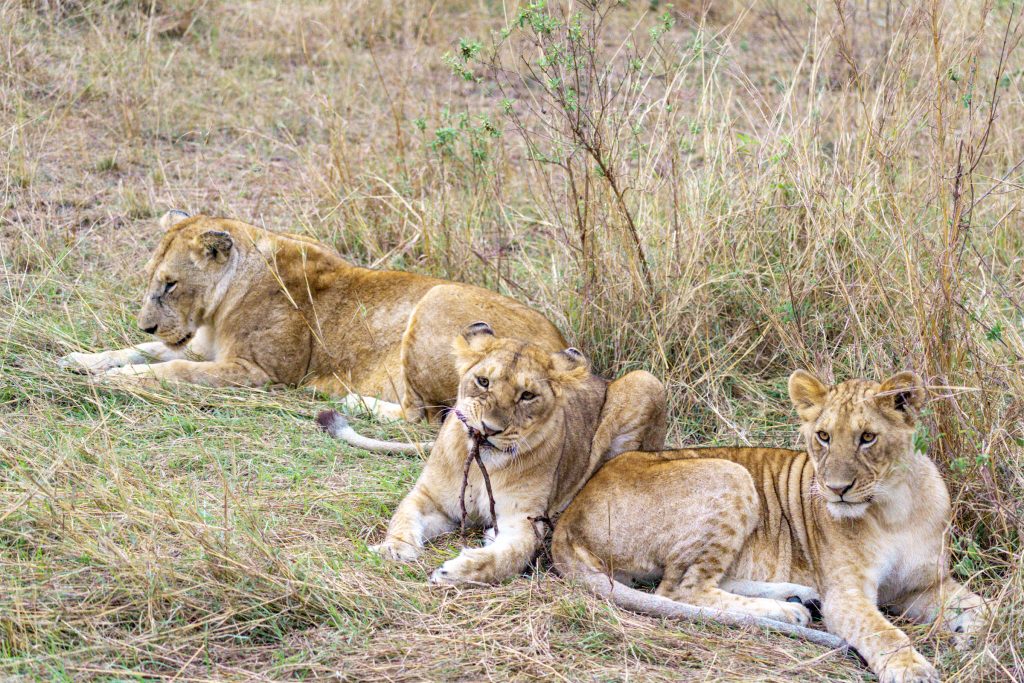
If you don’t have your own equipment, consider renting professional-grade cameras and lenses from reputable providers. Having the right gear will enable you to capture stunning wildlife shots and breathtaking landscapes. You may be tempted to quit your job and become the newest member of the Nat Geo photography team…I know I was! Make sure to familiarize yourself with your equipment before your safari, so you can make the most of every photographic opportunity. Safari photography is very different than my traditional travel photography (people and landscapes), so I’d definitely recommend exploring the best camera settings for safari photography and these African safari photography tips !
Related Post : Best Camera Settings for Safari Photography
9. Take Lots of Photos
Prepare to channel your inner wildlife paparazzi! On the first day of your safari, you might find yourself in a frenzy, snapping away at zebras like a camera-crazed tourist. And that’s perfectly understandable (and definitely what I did)! However, as the days go by and you’ve accumulated numerous wildlife photos, you’ll likely become more selective in snapping pictures. By the last day, the only times a zebra made it onto my camera roll was if it was an adorable baby, all fuzzy and irresistibly cute, and the one time when a zebra walked onto the airport runway in the Serengeti – that was a sight to see!
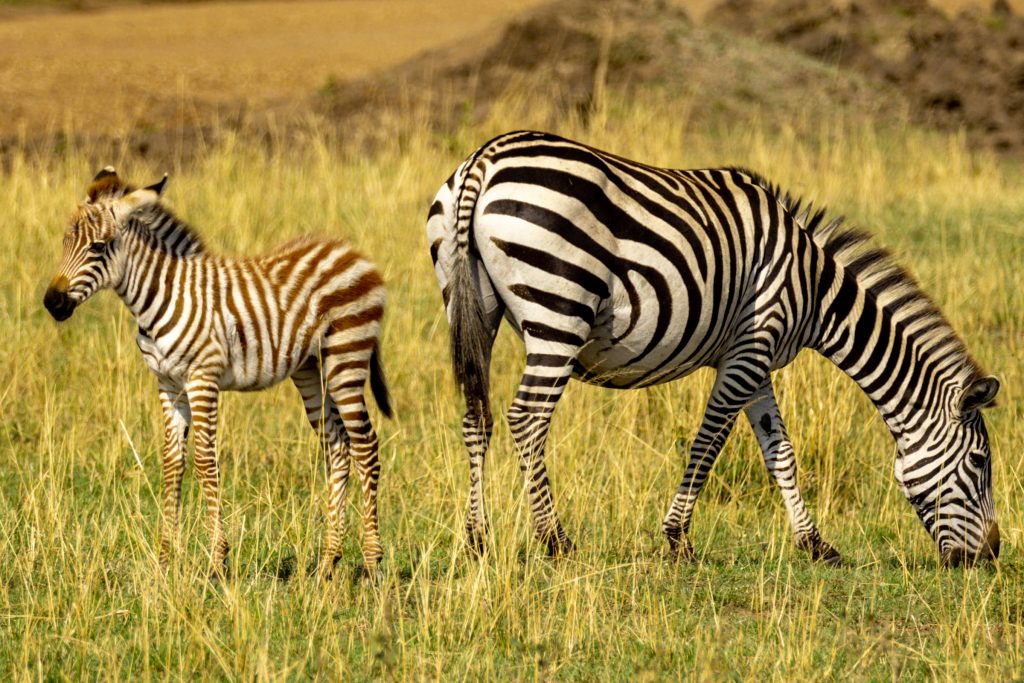
In any case, let your camera lens capture the extraordinary moments, the mischievous antics of wildlife (we got to see two male giraffes in a ridiculous neck-swinging fight over a female giraffe), and the jaw-dropping sunsets over the Serengeti. Get creative, experiment with different angles, and remember to take the time to appreciate the animals in person and not just through your camera’s viewfinder.
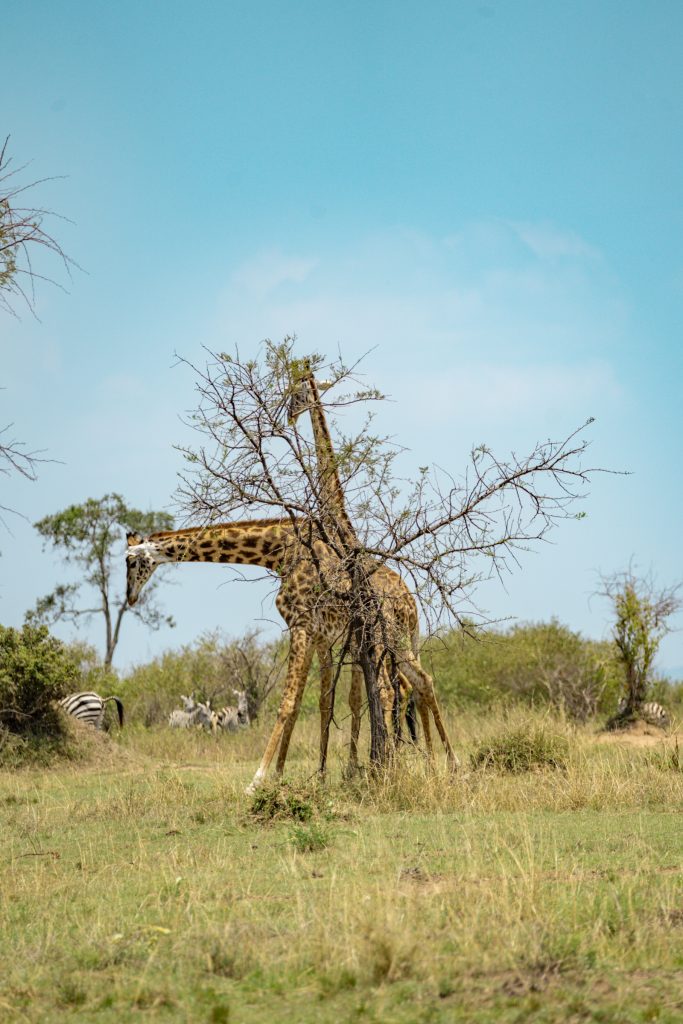
10. Bring Binoculars
Bringing a pair of binoculars on your safari is one of my top African safari travel tips. It allows you to get a closer look at the incredible wildlife that may be far off in the distance. Even with contacts, I have pretty horrendous eyesight, so my binoculars were an absolute lifesaver! We spotted our first lion through the binoculars and caught a good view of a leopard lounging in a tree, as well. Some safaris do provide binoculars for their guests, but it by no means a given, so I would recommend checking in before your safari.
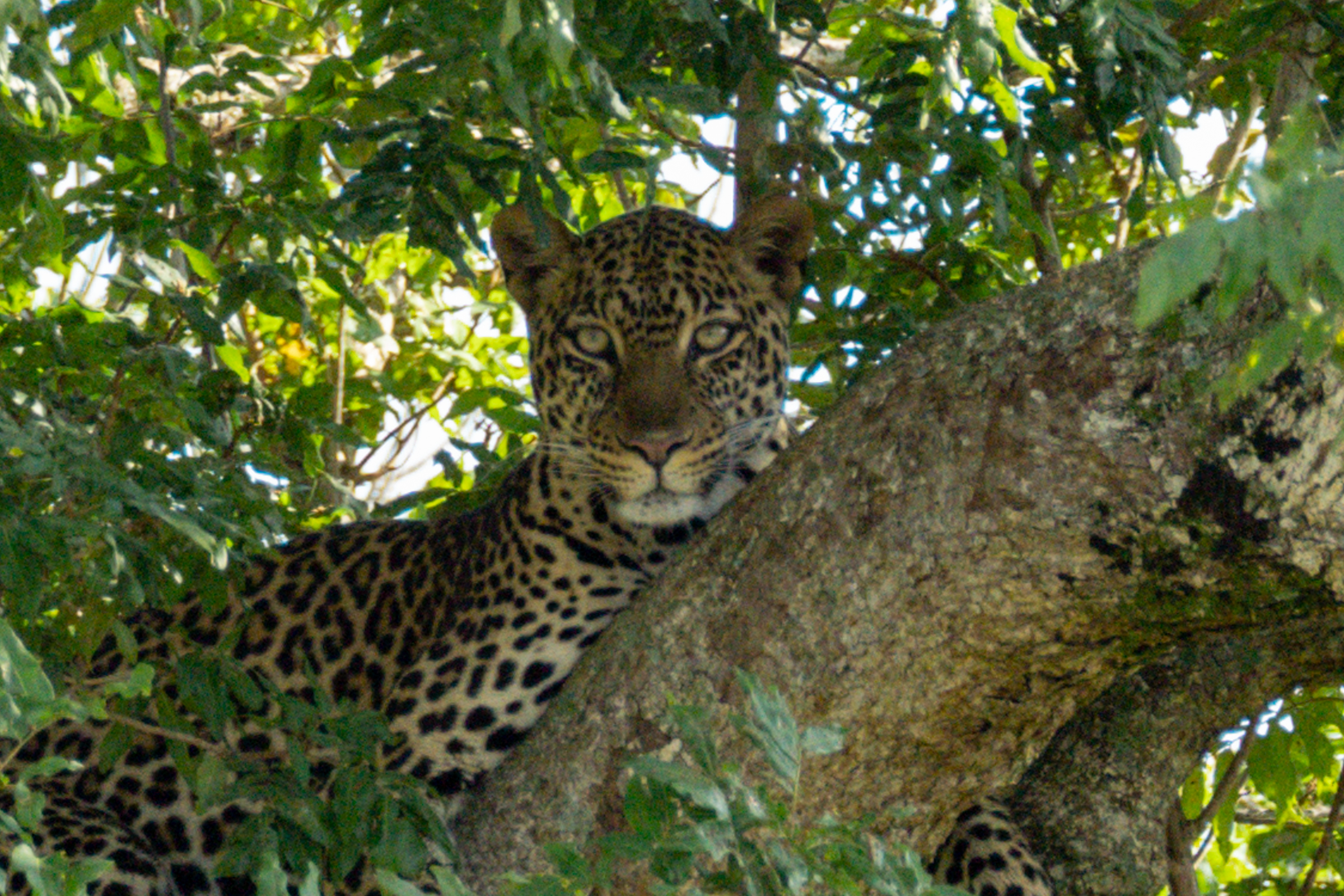
11. Decision Time: Private Guide vs. Group
When planning a safari, one important decision to make is whether to choose a private guide or group safari experience. Group safaris are typically slightly cheaper as the costs are shared among a larger number of participants. However, keep in mind that group safaris typically have fixed departure times and itineraries, which may limit your flexibility. Additionally, you’ll be sharing the safari vehicle with other travelers, all of whom may have different preferences. This can sometimes lead to compromises on the specific sightings or activities you’d like to prioritize. Another aspect to consider is the seating arrangement in the vehicle. With a group safari, you may not always get the best seat for optimal wildlife viewing or photography.
On the other hand, private safaris offer more freedom and flexibility. While they tend to be more expensive, you have the luxury of designing your own itinerary, choosing your preferred departure date and time, and tailoring the experience to your specific interests. You’ll have the vehicle all to your group, ensuring maximum comfort and the freedom to spend as much time as you desire at each sighting. For me, I decided on a private guide so that I could have all of the flexibility in deciding my itinerary. If you are comfortable with the higher budget, I would absolutely recommend this option.
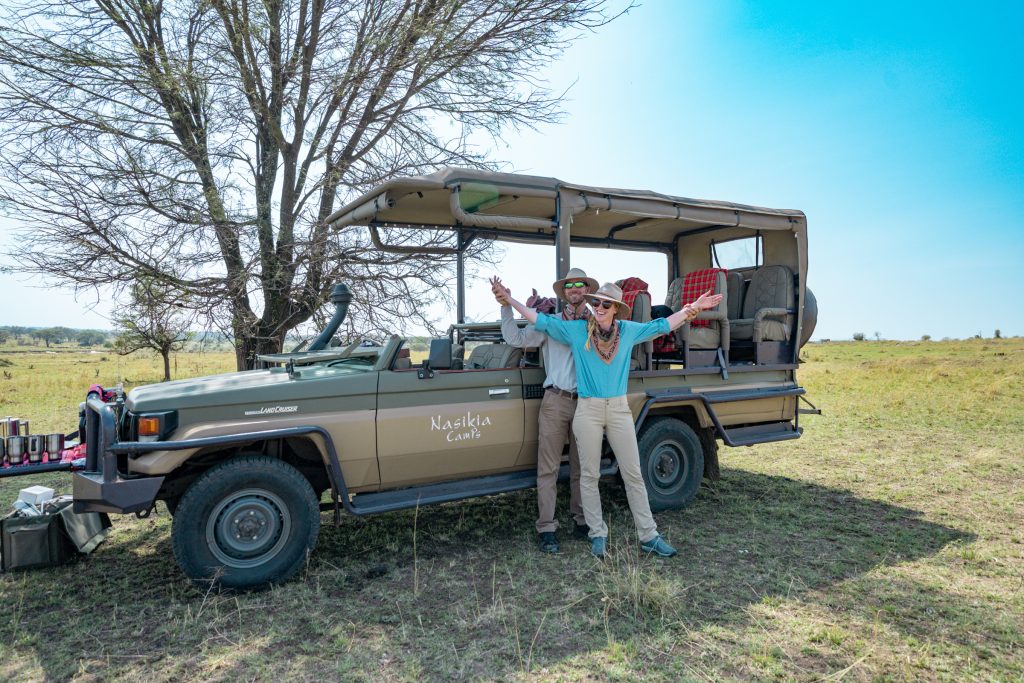
12. Wake Up Early
One of the most thrilling aspects of an African safari is observing wildlife in their natural habitat. Animals are most active during the early morning and evening, making these the prime times for game drives and wildlife viewing. Trust me on this…most times we saw lions during the day, they were stretched out and snoozing.
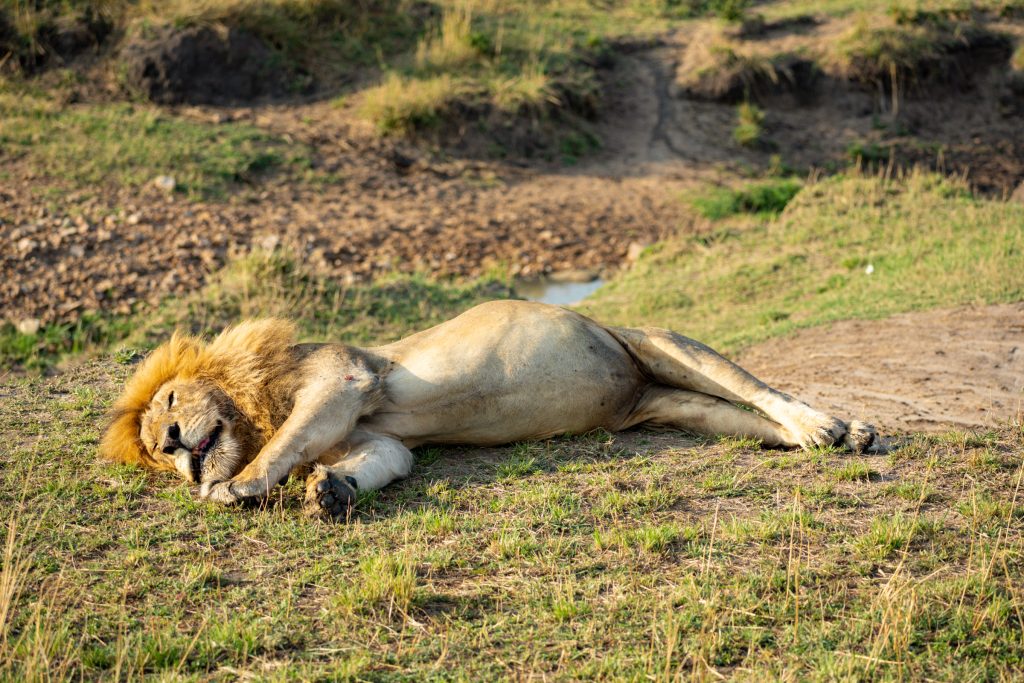
Set your alarm clock and embrace the early wake-up calls. By venturing out at dawn, you’ll have the chance to witness incredible animal behaviors, catch stunning sunrises over the Serengeti, and enjoy the peacefulness of the wilderness before the heat of the day sets in.
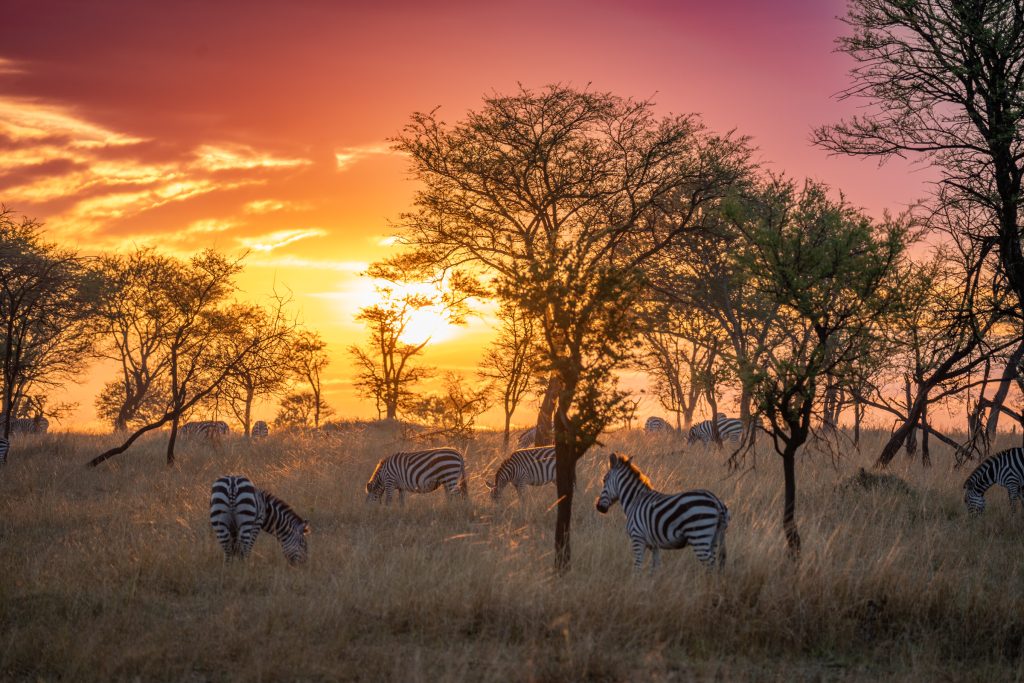
13. Bathroom on Safari
When nature calls on safari, it’s a unique experience that requires a bit of creativity. The bathroom situation in the wilderness is obviously quite different from the comforts of home. To give you an idea…my most common “bathroom” on the Serengeti was behind any number of tall termite mounds.
Remember, your safari guide is there to ensure your safety, and that even extends to bathroom breaks. Before bathroom breaks, they’ll scout the area to make sure it’s clear of any potential danger. Ladies, you might hear your guide suggesting to “pick a flower” as a discreet euphemism, while gentlemen may be asked if they’d like to “check the tires.” It’s all part of the adventure, so embrace the humor and follow their lead. Just remember to respect the environment and leave no trace behind.
14. Prepare for Dust
Dust, the not-so-glamorous companion on your safari adventure. As a contact lens wearer, I quickly learned the art of keeping my eyes protected from the ever-present dust. Carry extra contact lens solution, eye drops, and a spare pair of lenses, just in case. I’d also recommend keeping your sunglasses on – even when it’s not that sunny – they work great as an extra layer of protection for your eyes. A handy bandana is also helpful to pull up over your mouth during particularly dusty patches.
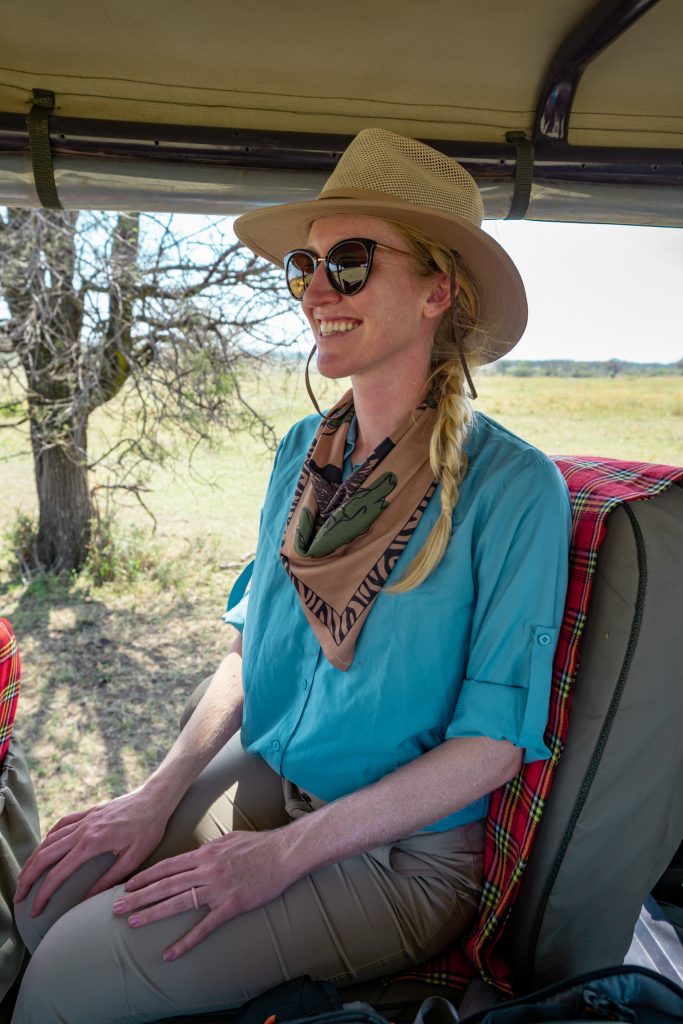
And don’t forget about your camera lenses! Dust has a sneaky way of finding its way onto them, causing potential smudges. Keep a lens cleaning kit in your day bag for quick lens cleaning, and keep your lens cap on when not using the camera. Remember, dust may be inevitable, but with a bit of preparation, you’ll be ready to conquer the dusty safari trails like a pro!
15. Be Medically Prepared
Being medically prepared is one of the key African safari travel tips for first-timers. Before your trip, make sure you visit a travel clinic or consult with your healthcare provider, and check the CDC’s recommendations to ensure you are up to date on any recommended vaccinations.
In addition, make sure to pack some bug spray to protect you from those pesky bugs and potential diseases they may carry. You won’t find a convenient CVS in the heart of the Serengeti, so it’s crucial to pack a well-stocked first-aid kit that includes essential items like band-aids, Cortaid, Advil, Pepto, and any personal medications you may require. Taking these precautions will provide peace of mind and ensure that you’re ready to handle any minor health concerns that may arise during your safari expedition.
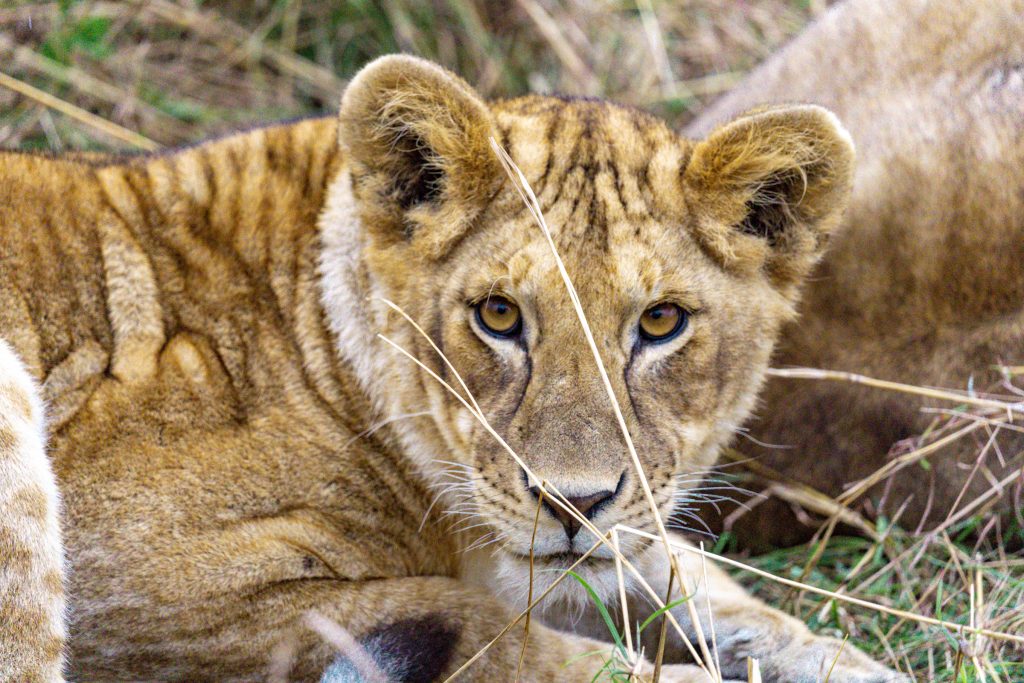
Like this post?! How about…
14 Outstanding African Safari Photography Tips
16. Enjoy Sundowners
Ah, the magical time when the sun begins its descent over the Serengeti. It’s the perfect moment to unwind and indulge in a tradition long cherished by safari-goers – the legendary “sundowners.” Picture this: sipping on your favorite beverage, feeling the gentle breeze on your face, and toasting to the day’s wildlife encounters. This was definitely one tradition I could get behind. Cheers to nature’s happy hour!
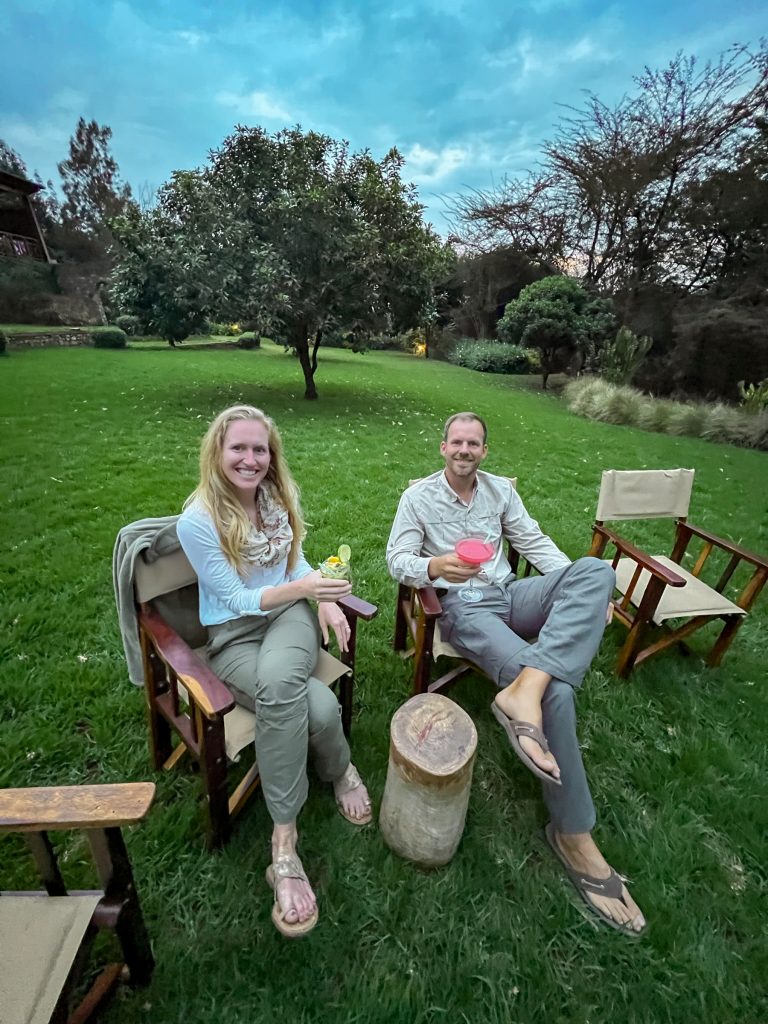
17. Snack Time
Snack time on safari is a delightful surprise that adds an extra touch of magic to your wildlife adventure. During my first game drive in Tarangire National Park, our safari guide announced a break for morning tea and snacks. I was totally unsure of what to expect considering that we were surrounded by water buffalo and in the middle of nowhere. Cue my surprise when we get hot tea, delightful biscuits, and more – all served on a checkered tablecloth! And it wasn’t just our first day…every morning and afternoon that we were out on safari, we were treated to a delightful spread for snack time. I was 100% on board with this custom!
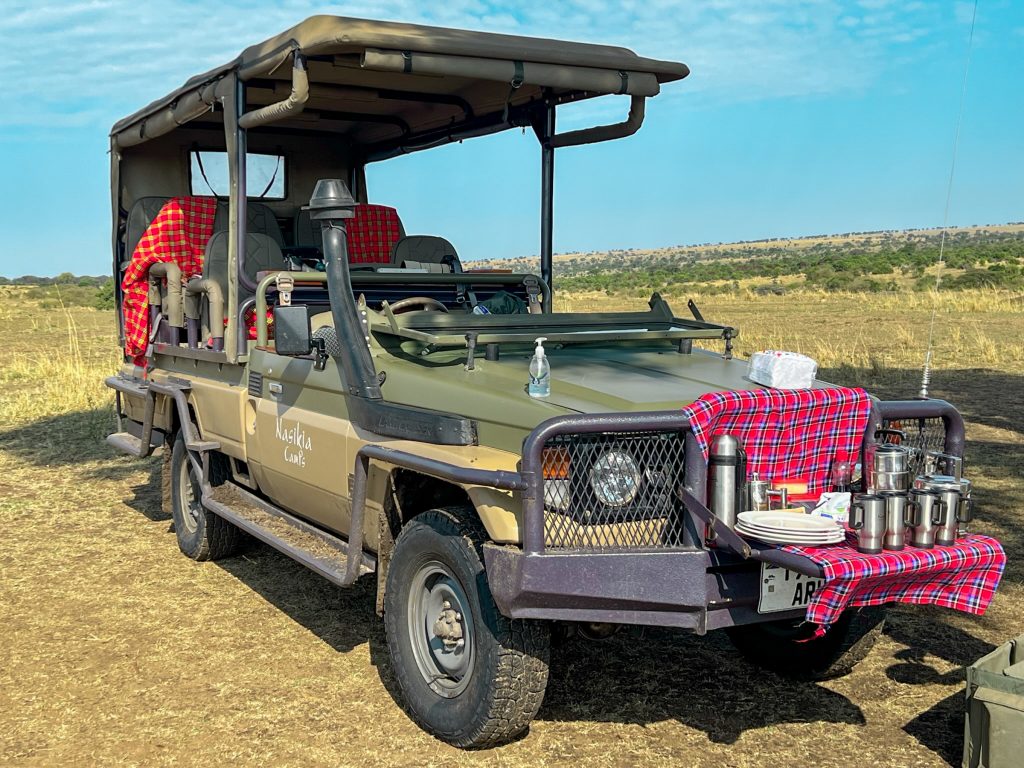
18. Patience is Key
When it comes to safari adventures, patience truly is key. Animals in the wild operate on their own time, and definitely don’t adhere to any schedule. It’s important to embrace this unpredictability and understand that the best sightings often come to those who wait. If you find yourself waiting at a specific spot during your game drive, trust that your guide has a good reason for it. Safari guides are experts in their field and have an uncanny ability to anticipate animal behavior.
To give you an idea…for the wildebeest river crossing (photo below), we waited on and off for nearly six hours! During that time, we would sometimes go and look at other animals, but we never strayed far from the river. We had seen smaller crossings while we were there, but this crossing was on a completely different scale with thousands of wildebeest all crossing at once. The crossing was a huge bucket list item for me, and I am SOOO glad that I had the patience to wait it out. Even if you impatient like me, remember that patience is one of the most important African safari travel tips.
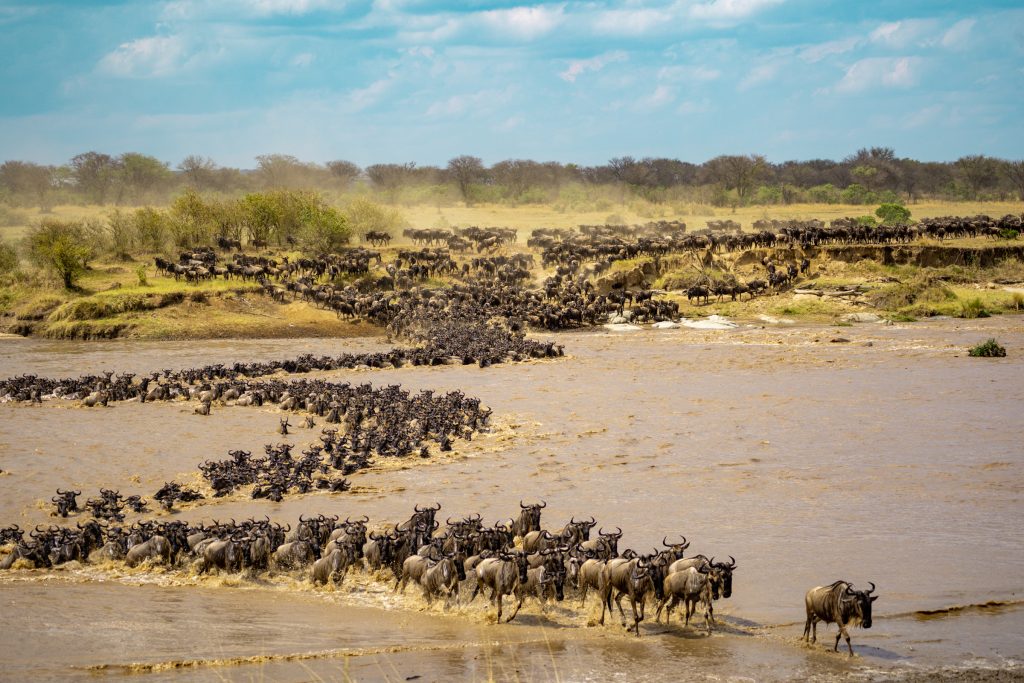
19. Communicate with Your Guide
When on safari, don’t hesitate to ask your guide plenty of questions. They are a wealth of information and have quite literally studied for years to become a guide. However, it’s important to be mindful of your surroundings and respect the environment. You do not want to be “that person” who disrupts the tranquility by loudly calling out or making unnecessary noise at inopportune times. Instead, observe quietly and engage with your guide at appropriate moments.
Aside from learning from your guide, you also need to respect your guide and follow all safety rules. Respecting the instructions of your guide ensures that you navigate the safari experience in a way that minimizes potential risks. Safari guides are well-versed in reading animal behavior and will maintain a safe distance to ensure that the animals’ natural behavior is not disturbed while still working to provide you the best safari experience possible. Remember that we are guests and need to respect both the animals and their environment.
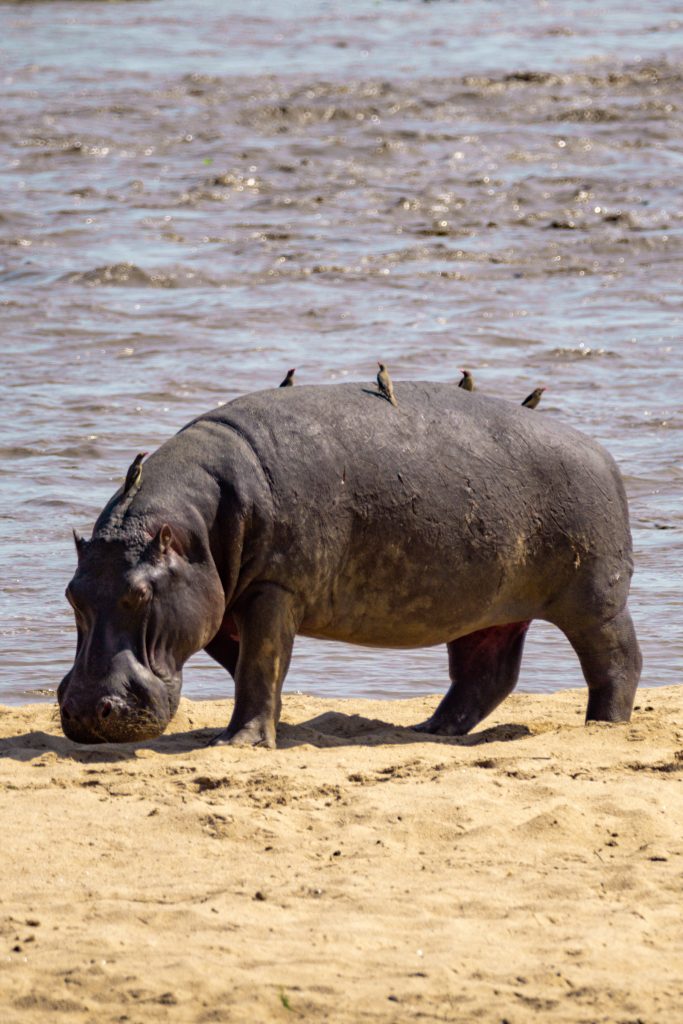
20. Bring Cash for Tips
The last of your African safari travel tips is to bring plenty of cash to tip! Tipping on safari is an important aspect, as it helps show appreciation for the exceptional service provided by the staff. While tipping practices can vary between countries and lodges, it’s highly recommended to have some cash on hand to tip the guides, drivers, porters, camp staff, etc. Based on your destination and level of stay, I’d look into tipping suggestions to ensure you’re offering an appropriate amount. Remember, tipping is not mandatory, but it’s a gesture of gratitude that can make a positive impact on the hardworking individuals who make your safari experience truly remarkable.
That wraps up my top 20 African safari travel tips for first-timers. With these African safari travel tips in mind, you’ll be well-prepared to make the most of your adventure. From choosing the right time to go, packing the essentials, and embracing the thrill of wildlife encounters, your journey into the wild promises unforgettable moments and treasured memories. Remember, being a first-timer is an opportunity to embrace the unknown and let the wonders of the safari unfold before your eyes. Happy safari-ing!
For some more travel inspiration, check out some of the posts below!
Tanzania : Kikuletwa Hot Springs: 14+ Things to Know Before You Go Safari Photography Camera Settings : Best Camera Settings for Safari Photography Safari Photography Tips: 14 Outstanding African Safari Photography Tips Safari Outfits: What to Wear on Safari for Women: 10 Cute Outfit Ideas Tented Safari Camps : Top 13 Things You Always Wanted to Know About Tented Camps Tanzania Itinerary : Tanzania 7 Day Itinerary
You May Also Enjoy:

Ziplines, Caves, and Ancient Ruins – This is San Ignacio!
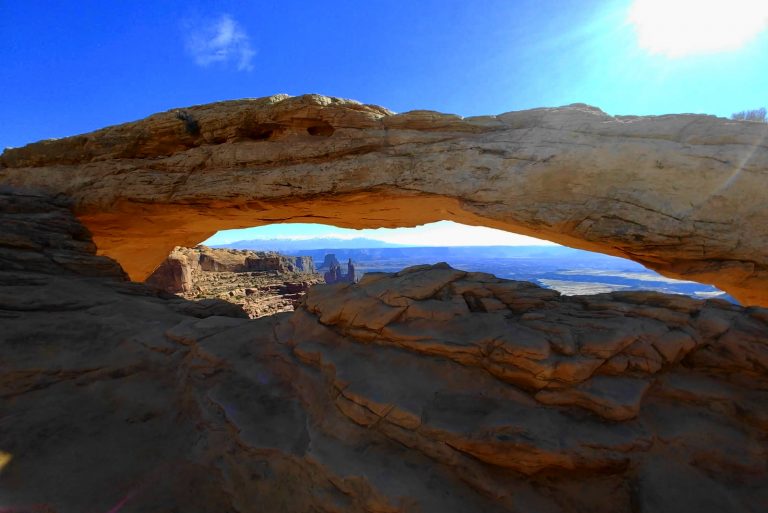
Make the Most of Your Amazing 3 days in Moab, Utah!

The Ultimate Guide to Iceland’s Golden Circle
Pin for later:.
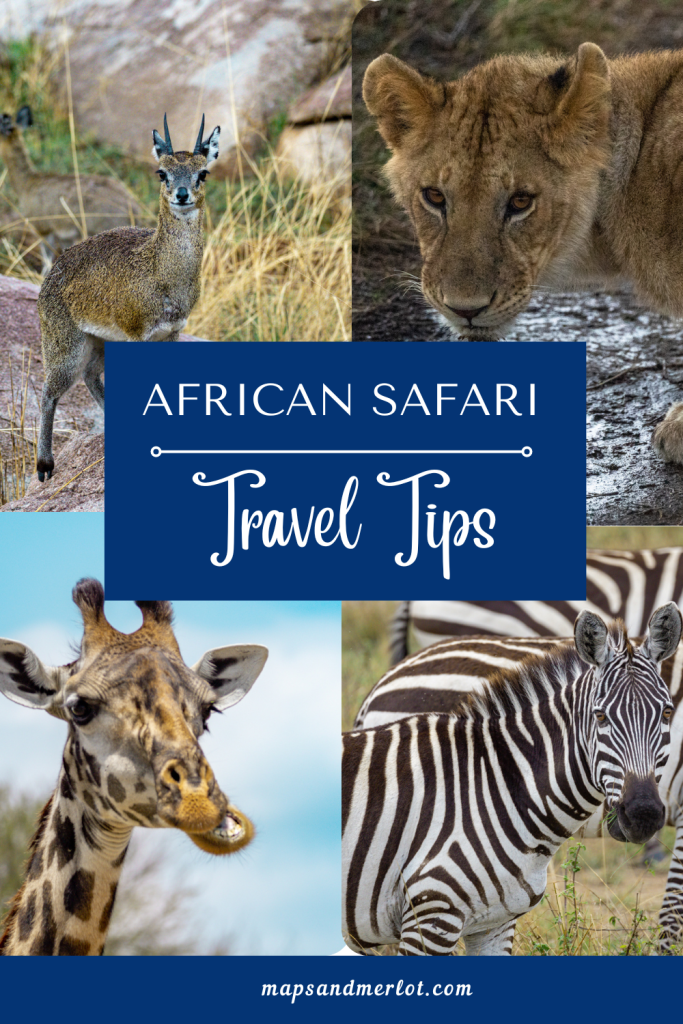

African Safari Tips & Things to Know Before Going on Safari in Africa
By Author Jurga
Posted on Last updated: February 12, 2023
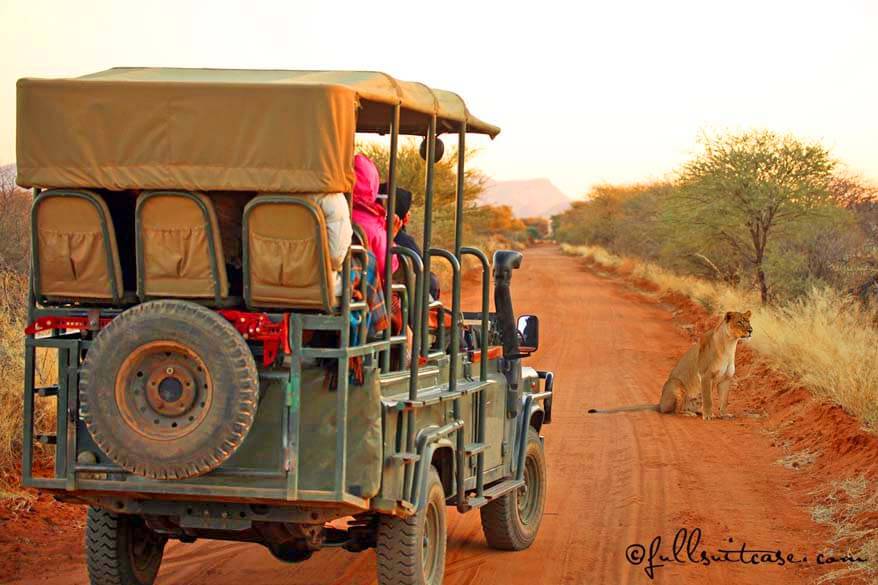
Going on safari for the first time you probably have many questions. There are hundreds of guides telling you where and when to go, so I’m not going to go into this. This post is intended to give you all kinds of practical tips which will help you prepare for an African safari no matter where or when you go.
From safari dos and don’ts, choosing between organized or self-drive game rides to safari packing tips. This post should answer all your African safari questions. Find out!
What you need to know before your first African safari
No matter how many pictures you have seen or what expectations you have, the very first moment you see African animals in the wild will be unforgettable .
I still remember ours as if it was yesterday. It was 10 years ago, on the very first day we arrived in South Africa. We landed in Johannesburg in the morning and drove straight to Kruger National Park. In the evening a couple of hippos showed up at the river, just meters away from the terrace where we were having dinner. It was such an amazing experience!
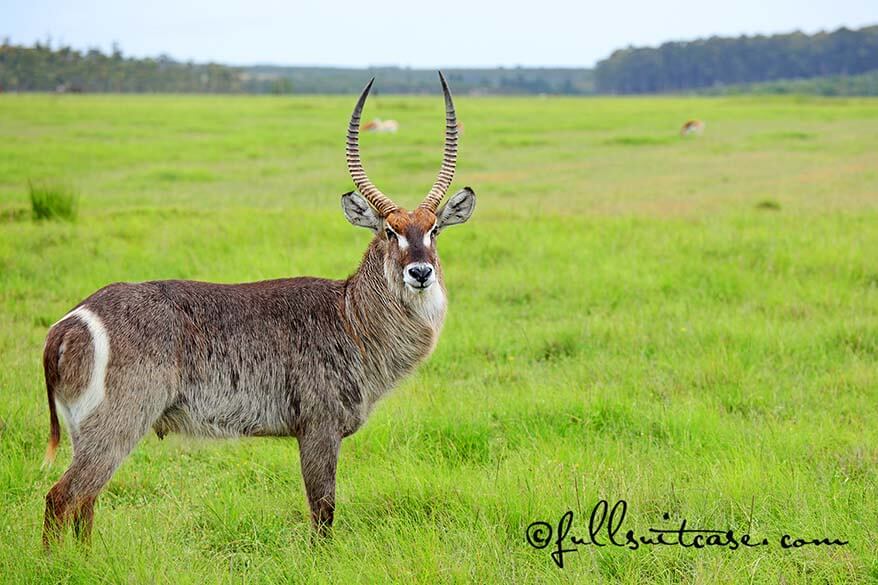
Now that I told you how great it is, I also feel obliged to tell you that not every moment of every safari will be the highlight of your trip . Far from that! You might be driving for hours and hours with not much to see. But then you will, you always do, and it will all be worth it!
Oh, and back to the amazing part. You WILL want to stay longer. Take my word for it, you will. Book a few nights extra. Flying to Africa is not cheap, so get the most out of your trip!
If you are traveling to Africa with kids, make sure to read this post as well: Everything You May Want To Know Before Taking Kids on Safari in Africa .
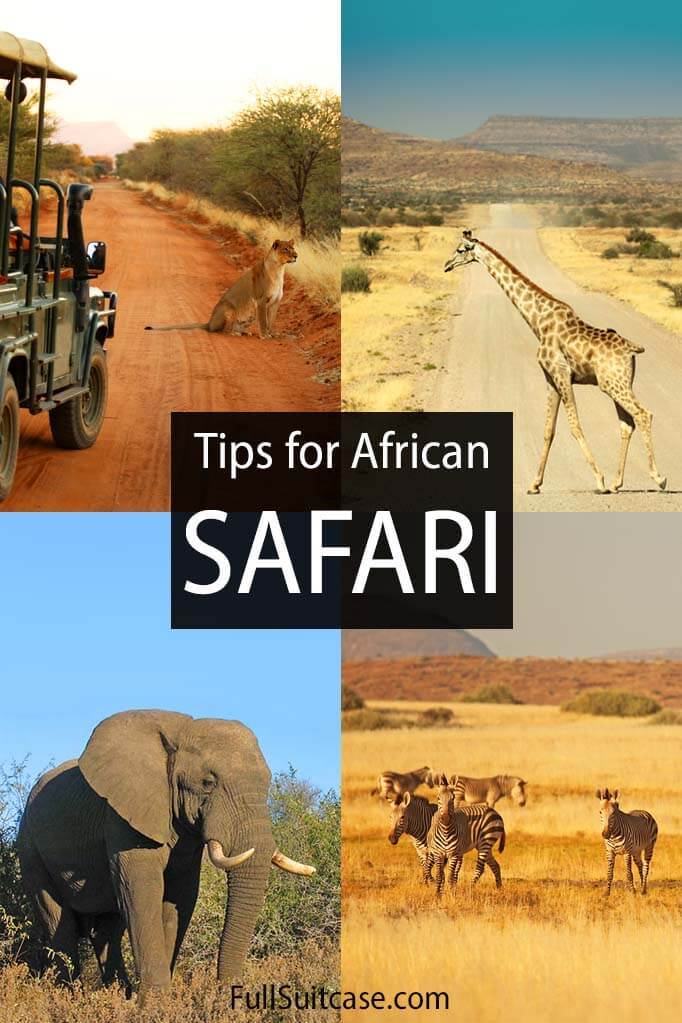
Safari Tips
1. be open-minded and flexible.
Every safari drive is unique and therefore unpredictable, so try not to stress about the things you cannot control. Sometimes you won’t see much, sometimes you’ll see a lot, sometimes the ride will take longer than expected, and sometimes it will be tougher than expected.
Be prepared for warm and for cold, for wind or sun, for mosquitoes and flies, and mostly for a rough ride.
While most of the time you will be driving on gravel or sand roads, sometimes the driver might decide to cross a river, drive through the bush, or cross a stone field… We did all of this when following a herd of desert elephants in Namibia and it was an amazing experience!
2. Follow the rules and stay safe
Stay in your car at all times, the rules are there for a good reason. Animals are very well camouflaged and often you don’t see them until it’s too late.
Don’t approach the elephants too closely, don’t make noise, keep your hands and your camera inside the car near the cats, and never stand between the hippo and the water. In fact, hippos are very aggressive and are the most dangerous African animals after mosquitos, so you don’t want to get them upset.
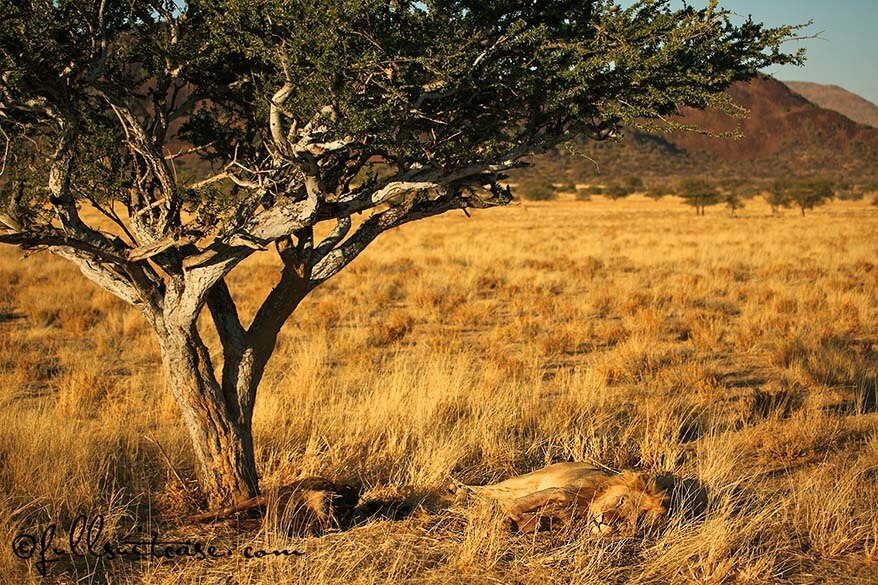
3. Ask questions
Most safari guides are very knowledgeable and you can learn a lot about animals and their behavior.
4. Ask to stop
You think you see something in the distance, but are not sure, or you want to take yet another picture of a zebra? Don’t be afraid to ask to stop the vehicle. The guides are there to give you the best safari experience.
5. Take lots of pictures
The first time you see a zebra you’ll probably take 25 pictures of it, the next time – 10, and by the end of the week you’ll hardly notice it. You can always delete the pictures afterwards and only keep the best, but take pictures when you can because you may not get a chance for a better shot.
Sometimes, you might get extremely lucky and see some incredible wildlife on the very first game drive. Don’t think that it will always be like that! Make sure to take pictures of everything you see because you never know if you’ll have another opportunity.
READ ALSO: Best cameras and lenses for safari Travel photography tips
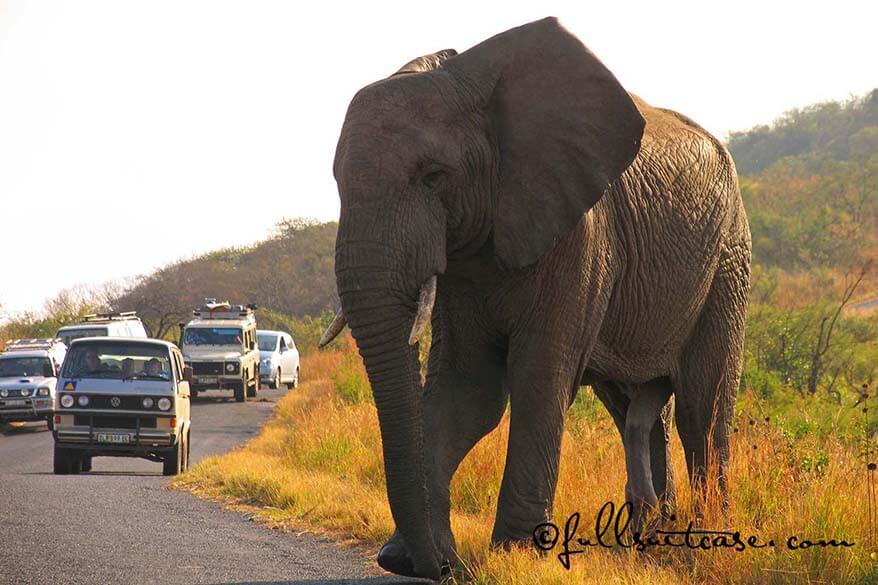
Guided safari tours vs. self-drive safari
Depending on the country and the place you are visiting, you don’t necessarily need to partake in an organized tour in order to see African animals in the wild . Kruger National Park in South Africa, Etosha National Park in Namibia – these are just a couple of examples of the parks you can easily visit on your own. Often you will see animals just next to the road, outside the parks.
We have been on numerous safaris in South Africa and in Namibia, and we have done both – safari rides with a guide as well as on our own. My advice for you is to do both. None of these formulas guarantee that you will see more animals; you just have to be lucky.
The first time we were in Kruger NP, we saw Africa’s Big-5 (elephant, rhino, lion, leopard, and buffalo) on the very first day. While we saw lots of different animals during a guided tour in the morning, we encountered 3 out of Big-5 later during the day when driving in our own car.
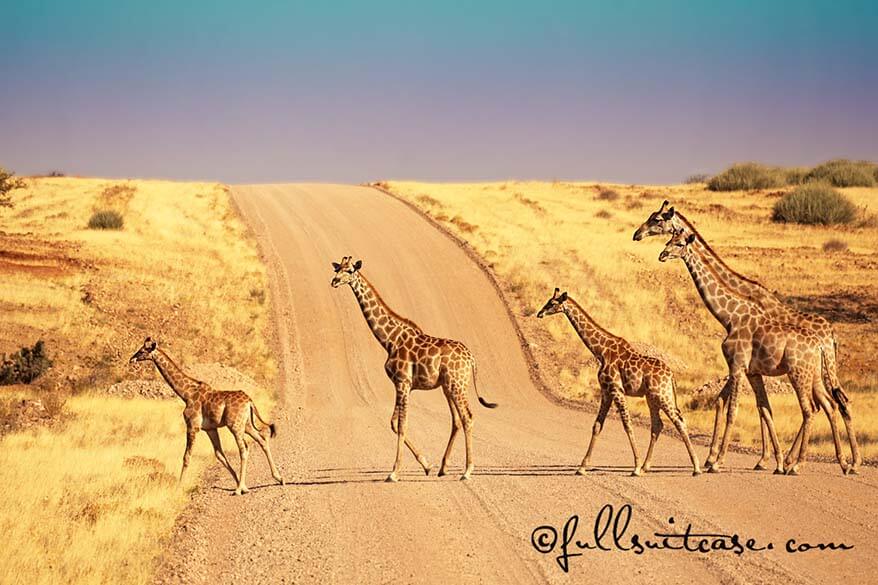
Advantages of guided safari tours:
No driving. You don’t have to drive and concentrate on the road, so it’s much more relaxing.
Better visibility. You sit higher, there are no windows and so you see everything better.
Knowledge. You can learn a lot about African animals from the safari guides. You quickly feel like an expert by being able to tell the difference between all different sorts of antelopes.
Expertise. The guides have lots of experience. They know where and when to look for certain animals and they often see them long before you do…
Communication . Safari guides constantly communicate with their colleagues and exchange information so they can bring you to the centre of the action in no time.
Accessibility. In some parks, private vehicles are only allowed to drive on certain roads while guided tours have fewer restrictions.
Kids are more engaged. It’s easier to get the children engaged and interested in the whole safari experience on an open jeep safari ride than when driving in your own car. Don’t listen to the people who tell you that young kids don’t appreciate safari. They do. You just have to find ways to get them interested and engaged. Get your kids a good pair of binoculars and play a game of who sees a certain animal first, and you are all set.
Picnic in African savannah and sundowners. Some of the very best memories of safari experiences we had were the ones where we had breakfast, picnic lunch, or a sundowner drink in the middle of an African savannah. It’s just something you have to experience at least once.
Night drives. You cannot go on a self-drive safari at night. You are not allowed to drive at night in the parks and it’s not a good idea to drive in the dark in Africa anyway. If you want to hear lions roar or see them hunt at night, you’ll have to book a night drive. I still have to meet the first person who actually thinks that night drives are worth it, but it’s a very unique experience. Don’t expect to take any pictures at night, just enjoy the ride and hope that you get to see some action.
It pays to travel to Africa with a big family or a group of friends. You pay for a regular safari ride and end up with a private driver and a whole big jeep for yourself because they don’t necessarily fill the jeep if they already have 4-6 places sold.
Very often, young kids are free of charge or get a discount as well. It’s not always the case however, so don’t count on it. If you want to be certain that you will be on your own, you have to ask for it and probably pay much more.
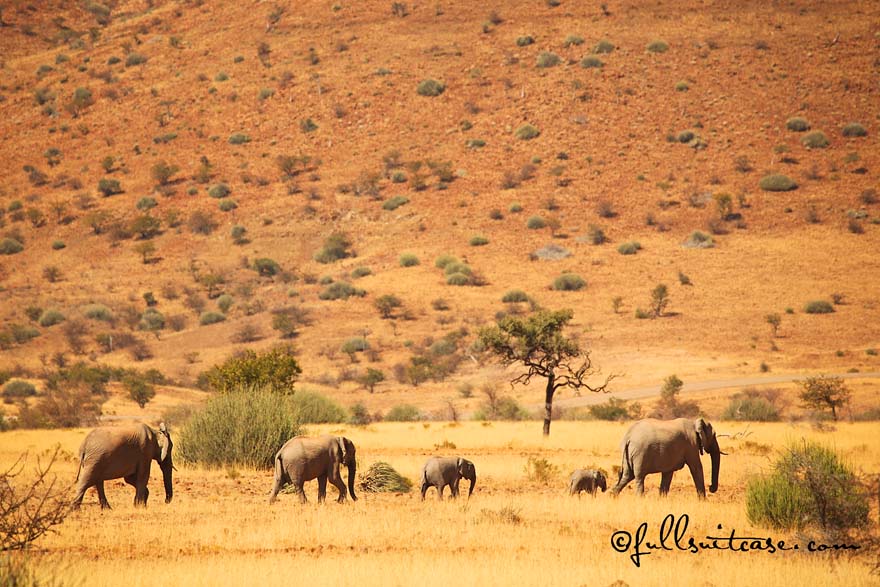
Advantages of a self-drive safari:
Flexibility. You can decide where you want to go and how long you want to spend at a certain place and don’t have to worry about being stuck with a group of 10 other people who take 101 pictures of a giraffe in all possible angles and still complain when the driver wants to go on. OR you can stay longer, follow and watch the animals as long as it suits you without having to worry about other people or a schedule.
Better pictures. Usually, you will have better chances to take pictures of the animals if you don’t have to compete for the best spot with the other people in the same vehicle.
Cost. Needless to say, a self-drive safari is much cheaper than an organized ride. Safari rides, especially private ones, can be very expensive. Sometimes it might be cheaper to stay at a luxury lodge with all-in formula (food and safari rides included) than having to pay for a hotel and safari rides separately.
Heating and air-conditioning. This might seem irrelevant, but wait till you sit in the open jeep driving 40 miles an hour before sunrise or after sunset. Or when you find yourself in an open savannah in the heat of the day with no shade whatsoever.
Children’s age is not an issue. Some safari rides will not permit children under a certain age, usually under 6. This is mainly because of the safety concerns in the proximity of predators. In your own car, you can take children of any age on a safari ride and you stop as close to the lions or leopards as you wish. Just try to limit the noise and keep the windows closed.
Kids entertainment. If you are traveling with very young children, they might not have much patience during long safari rides. It might be easier to keep the kids entertained in your own car. I rather have my kids watching the animals than playing games on a tablet, but we often listened to some children’s music during safari rides as it kept the kids quieter.
Some things to consider when booking a game drive
Duration of the ride. Make sure you are well informed about the duration of the ride. Some will only last an hour or two, while some others can take the whole day.
Time of the day. The very best time to watch animals is usually early in the morning or in the evening around sunset. This doesn’t mean you won’t see animals during the day. We saw lions with cubs, rhinos, elephants, leopards, cheetahs, and many other animals in the heat of the day.
So my advice would be to go looking for the animals whenever you have a chance. After all, that’s the reason you go to Africa, isn’t it? You may even want to consider a night drive, but don’t expect too much from it.
Size of the group. If you have a choice, always go for a smaller vehicle and a smaller group.
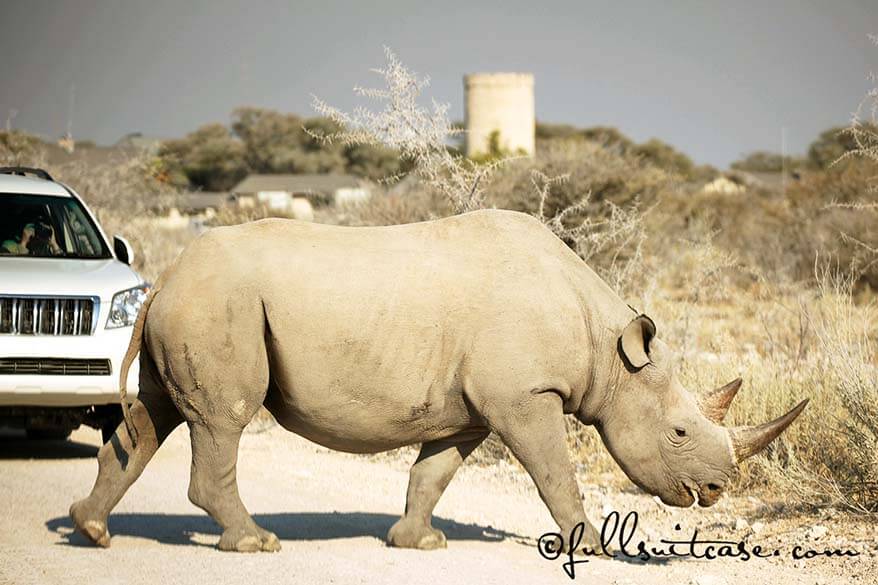
What to pack for an African safari
Soft-sided travel bags . Whether you are planning on taking a small plane in Africa or joining an organized tour, you better pack light and take a soft-sided duffel bag . Don’t take hard-shell suitcases to Africa, they are not allowed if you need to take a small plane or a group tour.
Here you can read about the type of travel bags that we use for our trips . Also, your bags WILL get dirty, so don’t feel embarrassed to take old luggage on a trip to Africa. Nobody cares.
Camera equipment . Take the very best camera you have and the best telephoto lens you can afford. 200mm is a minimum. You can take some pictures of the animals with your smartphone, but you can’t compare the quality of those pictures.
Pack at least 50% more memory cards than for the other trips of a similar duration. Always have extra batteries and charge them every time you can. Don’t forget a tripod. It will be of no use during safari rides, but you’ll see animals at the waterholes and other places as well. Here you can find more advice in regards to the best camera equipment for safari photography .
Electrical adapters . There is not one standard electrical adapter in Africa, so you should check which one you need depending on where you are going. Here is a list of a couple of popular African safari destinations and the plugs they use: South Africa and Namibia type D/M . Kenya and Uganda type G . Botswana, Zimbabwe, and Tanzania one of the previous two – type D or type G.
Binoculars . You cannot go on safari without binoculars. Well, you can, but it’s more fun if you have a pair. As a minimum make sure that children have their own binoculars .
Mosquito repellant with DEET .
Sunscreen and sunglasses
Small backpack is very handy to store all your belongings during long safari rides. Make sure it closes well, otherwise you’ll have sand over everything.
Drinking water and light snacks . You should always have some drinking water with you. Organized safari rides will often provide water and other drinks and sometimes snacks as well, but you might need to wait till they stop somewhere, so it might be more convenient if you have your own, especially if traveling with children.
Flashlight (always) and/or a headlamp (if camping). You will use a flashlight all the time and a headlamp is extremely helpful when camping.
First-aid kit, medication and a good travel insurance are essential for any trip to Africa. If you are prone to car sickness, you may want to take some medication with you. African roads can be really bumpy. Always take medication against diarrhea when you go to Africa and make sure you are ok with all the vaccinations. Depending on the area, you may need to take malaria pills as well.
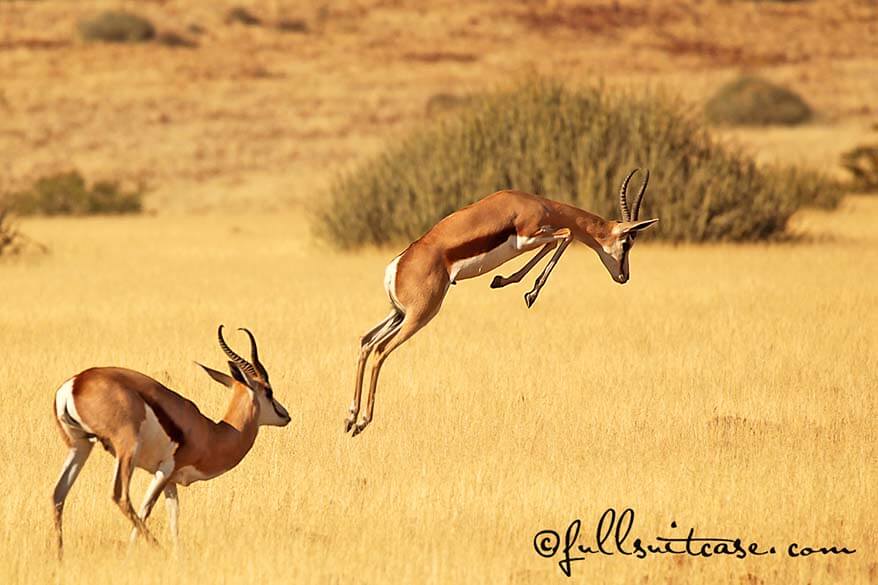
What to wear on safari and colors of clothing
Don’t pack too many clothes and don’t bother with brand new or special safari-style clothing. In Africa, you can wear pretty much anything. Whatever you wear, it will get dirty very quickly. You’ll get used to it.
It can get very cold or hot on safari, so make sure you are well prepared for both. Every time. It’s not because it’s hot when you leave for a ride at 3 pm that you will not be freezing cold on the way back after sunset.
Always dress in layers. I advise wearing closed shoes. Otherwise, your feet will be freezing cold in an open vehicle in the morning or in the evening. Most safari tours foresee warm blankets in the car, so don’t be afraid to ask for one if you are cold.
You don’t necessarily need to dress in khaki or light brown tints. Camouflage clothing should be avoided altogether as it’s considered military and is forbidden in some African countries. Wear comfortable clothes, preferably in neutral colors. But, as already said in my post about packing for Namibia , don’t worry about the colors too much, especially for the jackets as you’ll usually only wear them when it’s dark.
If you have to buy something new for your trip to Africa, then go for the neutral tints. Otherwise just pack what you have.
I saw people in pink, bright red, white, orange, and green jackets and sweaters on safari rides. In fact, I also wore a red jacket on safari in Namibia several times. It just happened to be the lightest jacket I own and I only wore it on safari when it was cold (=dark) so the color didn’t matter at all.
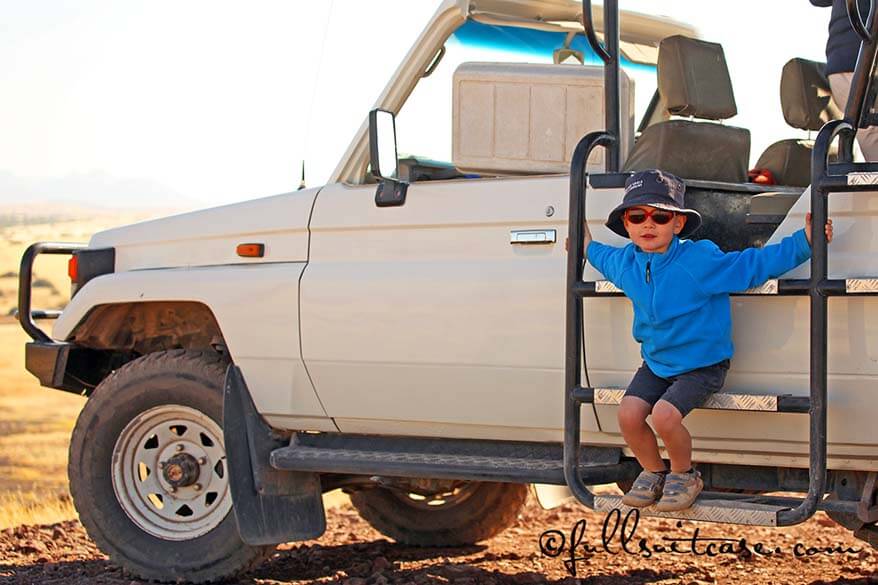
Safari clothing packing list
- Windproof jacket
- One or two (fleece) sweaters
- A pair of long pants, trekking pants are best, but jeans will do too
- 1-2 pairs of shorts or convertible pants as they give you more flexibility
- T-shirts or shirts for 7-10 days
- Closed shoes
- Swimming gear
- You may want to pack one smart outfit to wear for dinner, but it’s not really necessary in Africa. We stayed at a couple of luxury lodges during our trip and usually just wore jeans and a shirt, a blouse or a light sweater in the evening.
So, these are our safari tips for your first safari experience.
One last tip. Go on every single safari ride you can and make the very best of your trip. If I had hadn’t joined the very last ride the night before we flew home, I would have missed the rare opportunity of seeing a pangolin and a couple of lions with their prey.
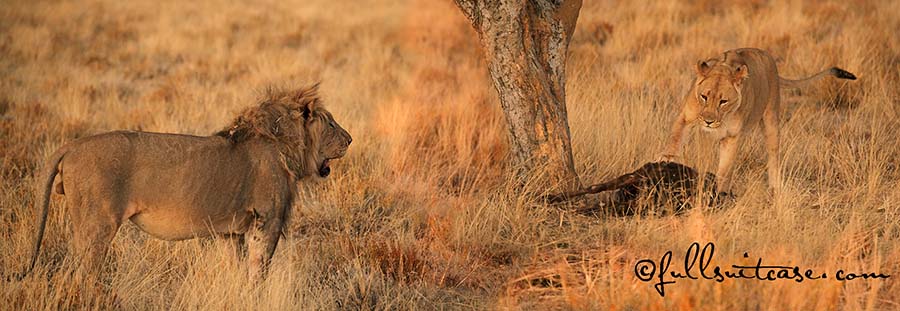
More travel inspiration & tips for Africa:
- Best Things to Do in South Africa
- South Africa Itinerary
- South Africa with Kids
- Best Places to See in Namibia
- Namibia Itinerary
- Namibia with Kids
- Namibia Travel Tips
- What to Pack for Namibia
- Safari with Kids
If you found this post helpful, don’t forget to bookmark it and share it with your friends. Are you on Pinterest? Pin this image!
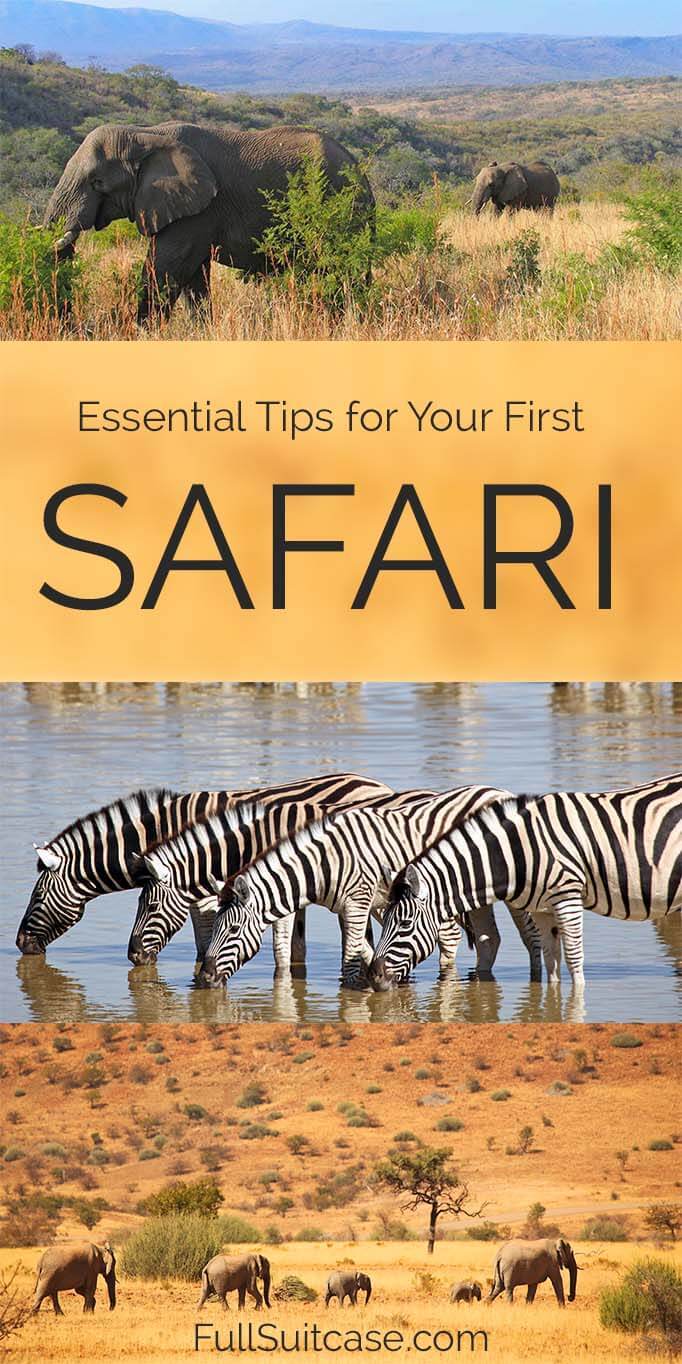
This site uses Akismet to reduce spam. Learn how your comment data is processed .
Wednesday 19th of July 2023
Really helpful, thank you. We are off to Kruger in August x
Thursday 20th of July 2023
Glad to help, Pol. Have a great trip!
Saturday 15th of April 2023
Thank you so much for sharing all these precious tips to prepare foe a safari. I’ll be going to Kenya in mid-September 2024 and I have started to prepare mentally fort this trip. So your tips are greatly appreciated.
Sunday 16th of April 2023
Glad to help, Suzanne. It will be an amazing trip for sure!
Wednesday 19th of October 2022
That was great!! So many good tips to know about. Thank you!
Thursday 20th of October 2022
Glad to help. Enjoy your trip!
Martha Harvie
Saturday 12th of March 2022
One of the best summaries I have read. Our safari has been cancelled twice due to Covid so looking forward to the tour later this year (2022).
Monday 14th of March 2022
Fingers crossed you can finally make it happen this year, Martha! Have a great trip!
Simon Peter
Wednesday 2nd of September 2020
Thank you for sharing this information. I am a tour operator in Uganda and this info is also applicable for safaris here. Except I would emphasize neutral colors more and staying away from red as some animals see red as blood and may charge.
Thursday 3rd of September 2020
Thanks for sharing your experience, Simon.

12 Tips For Going On Your First African Safari
Heading out on an adventure of a lifetime in Africa? Check out these helpful African safari tips.
If you’re heading off on your first safari in Africa, you’re in for a trip of a lifetime!
Nothing can compare to seeing these incredible animals in their natural environments, and you really do get up close and personal. There are a few African safari tips you should know before going on your first safari.
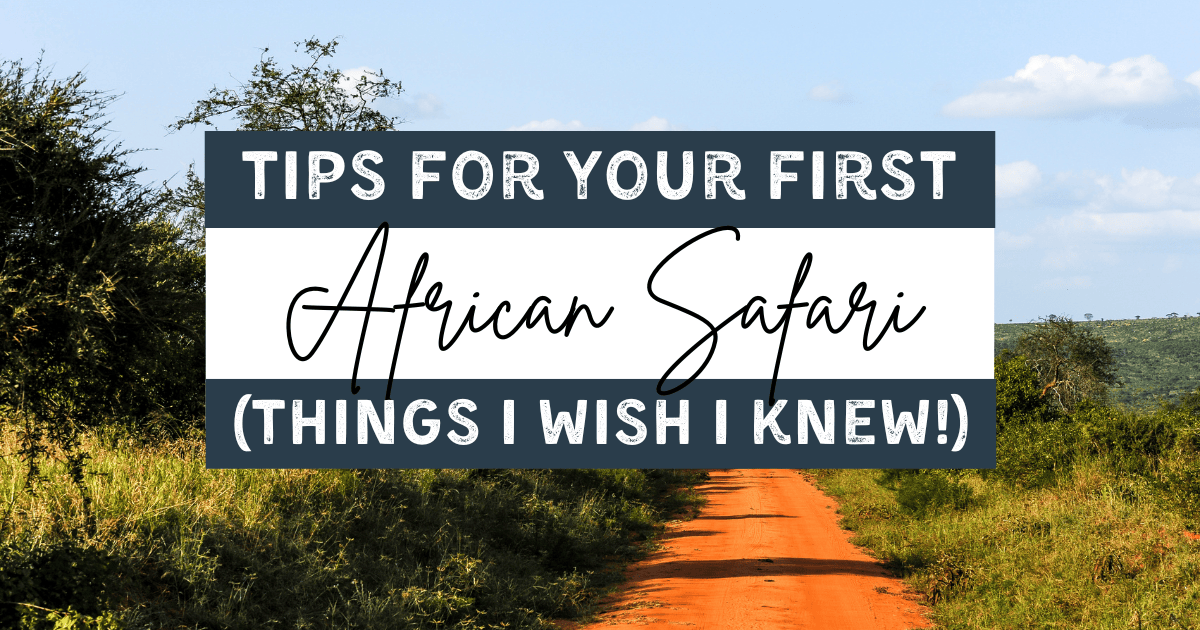
This post contains affiliate links which means I earn compensation when you click on the links at absolutely no extra cost to you! Feel free to read my disclosure policy . Thank you for supporting my blog!
Plan your next vacation using these tools! ✈️ Book flights: Expedia & SkyScanner 🏨 Book hotels: Booking.com & Expedia 🚘Book car rentals: RentalCars.com 🎫Book tours: GetYourGuide & Viator 🩹 DIY Travel Medical Kit 💸 20 Cheap Travel Items Under $20
African Safari Tips & What to know Before Going
I’ve been to five African countries and two safaris, so I’ve picked up a few helpful safari tips along the way! Here are some African safari tips I wish I knew before I went!
1. Know what to pack for an African safari
There are a few safari essentials you’ll want to pack for your trip to Africa.
Everything from sunscreen to a jacket (mornings can be freezing!), power banks, scarves and more. Here’s my list of safari must-haves and carry-on essentials to make your packing easier!
2. Pack light
Consider travelling with a carry-on suitcase or a backpack. Chances are, you’ll be hopping around a lot and you’ll want something small and portable to travel around with.
Flights within Africa are generally on smaller flights that don’t have a lot of storage, so minimize your overall wardrobe and repurpose some items and create a few outfits out of a handful of key clothing items.
P.s . My favourite travel backpack is the Osprey Fairview (or Fairpoint). It’s 40L and fits within carry-on sizing parameters! It converts from a backpack to a duffle bag easily.
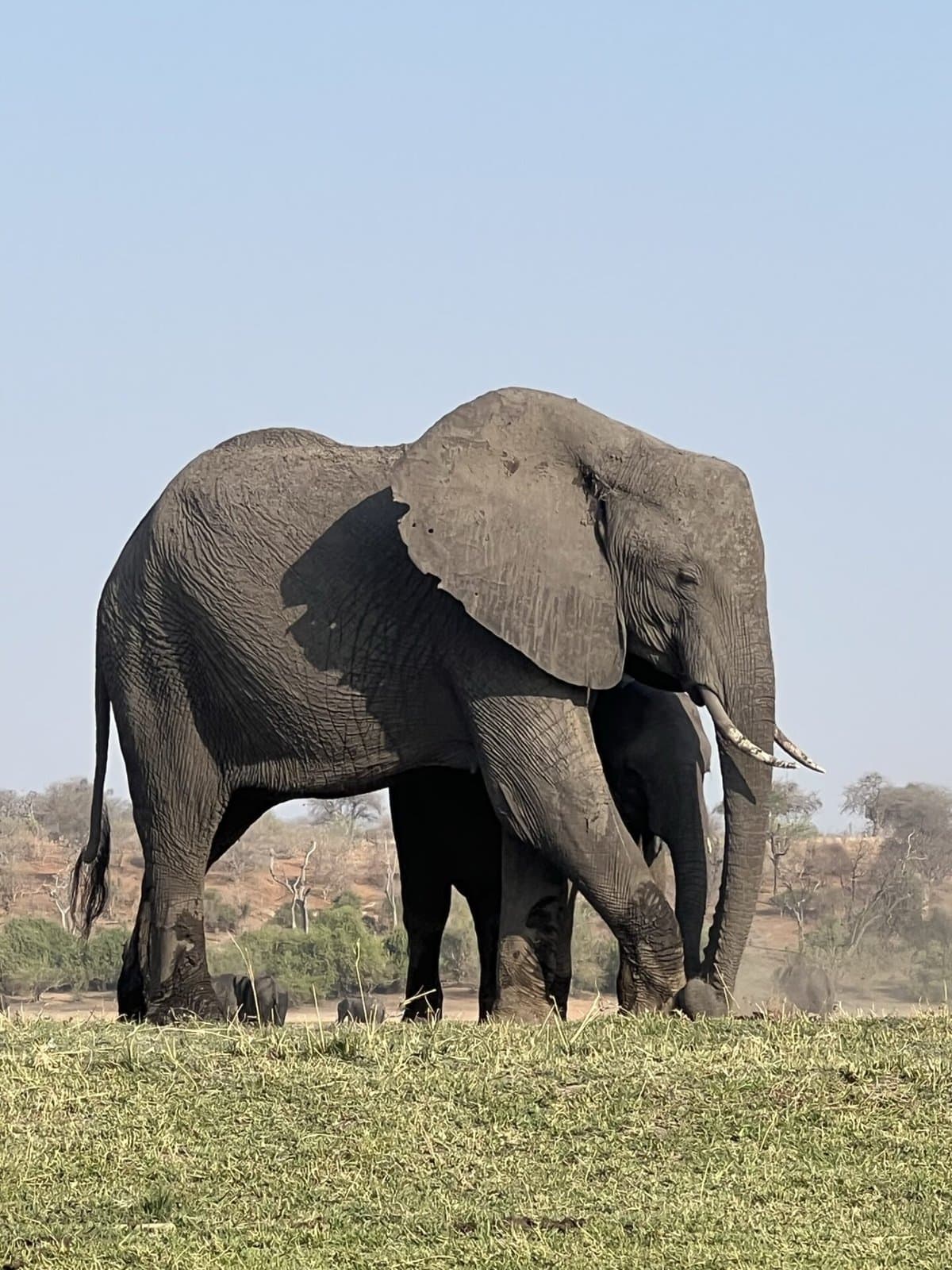
3. Pack a travel medical kit
I was very sick on our 12 day trip in Africa. What started as fatigue and congestion turned into feeling like I was swallowing glass and a chesty, mucusy cough.
What did I pack in my medical kit?
An apocalyptic amount of Imodium and motion sickness pills, but alas, I did not pack anything for cold and flu. Whoops. 😅
This obviously isn’t as much of an issue if you’re in a city where you can go to a pharmacy, but when you’re out in the middle of nowhere it presents a problem.
Here’s your reminder to pack all the medication in your travel medical kit .
Ps. Here’s a guide on how to prepare your home for travel , including a printable checklist to help you remember everything!
4. Be ready for early morning starts
Be ready for early morning starts.
I mean early .
4:00 am wakeups aren’t unusual especially if you’re going on safari (but I promise it’s worth it!).
This can be a bit of a shock, especially on top of long travel days and jet lag. Just don’t expect a leisurely safari, especially if you want to see wildlife.
They’re most active at dawn, so be ready for some really morning starts! There is no rest for the wicked on an African safari. 😂

5. Don’t expect to have WiFi (and even if you do, it sucks)
One thing you can’t rely on having is WiFi. That isn’t always a bad thing.
Just don’t expect to be sitting in bed at night scrolling through Instagram or posting photos on Facebook – because it’s not always possible.
Depending on where you are, you may only have spotty service in the lobby area of a hotel. In larger cities like Cape Town and Johannesburg, this is generally a non-issue.
You can get an eSIM at the airport, or online ahead of time and activate it once you’re where you’re going. Just watch for the eSims you purchase at the airport; make sure they’re usable in other countries throughout Africa if you’re planning to do some country-hopping.
You may not always have WiFi accessible, but you’re on holiday. Enjoy the peace and quiet!
Get $3 off your first Airalo eSIM with my referral code!
6. Stay hydrated!
After a few dehydration episodes, I will always travel with hydration packs from now on.
It’s very easy to become dehydrated – starting with your flight there. This is my most important African safari tip .
Our most recent trip to South Africa was a 16 hour journey and I know I didn’t drink enough. Combine that with not knowing where the next bathroom will be, several hours of travel by car, and hours in a safari jeep – you learn to limit your liquids pretty quickly.
The best advice I can give is to find out when breaks will be. Is there a bathroom nearby? When’s the next stop? Take small sips if you’re concerned about having to use the bathroom frequently (like I am).
Dehydration is a nasty thing to experience (think headaches, fatigue, sore muscles, etc). Don’t let this ruin your holiday!
This leads me to my next point…
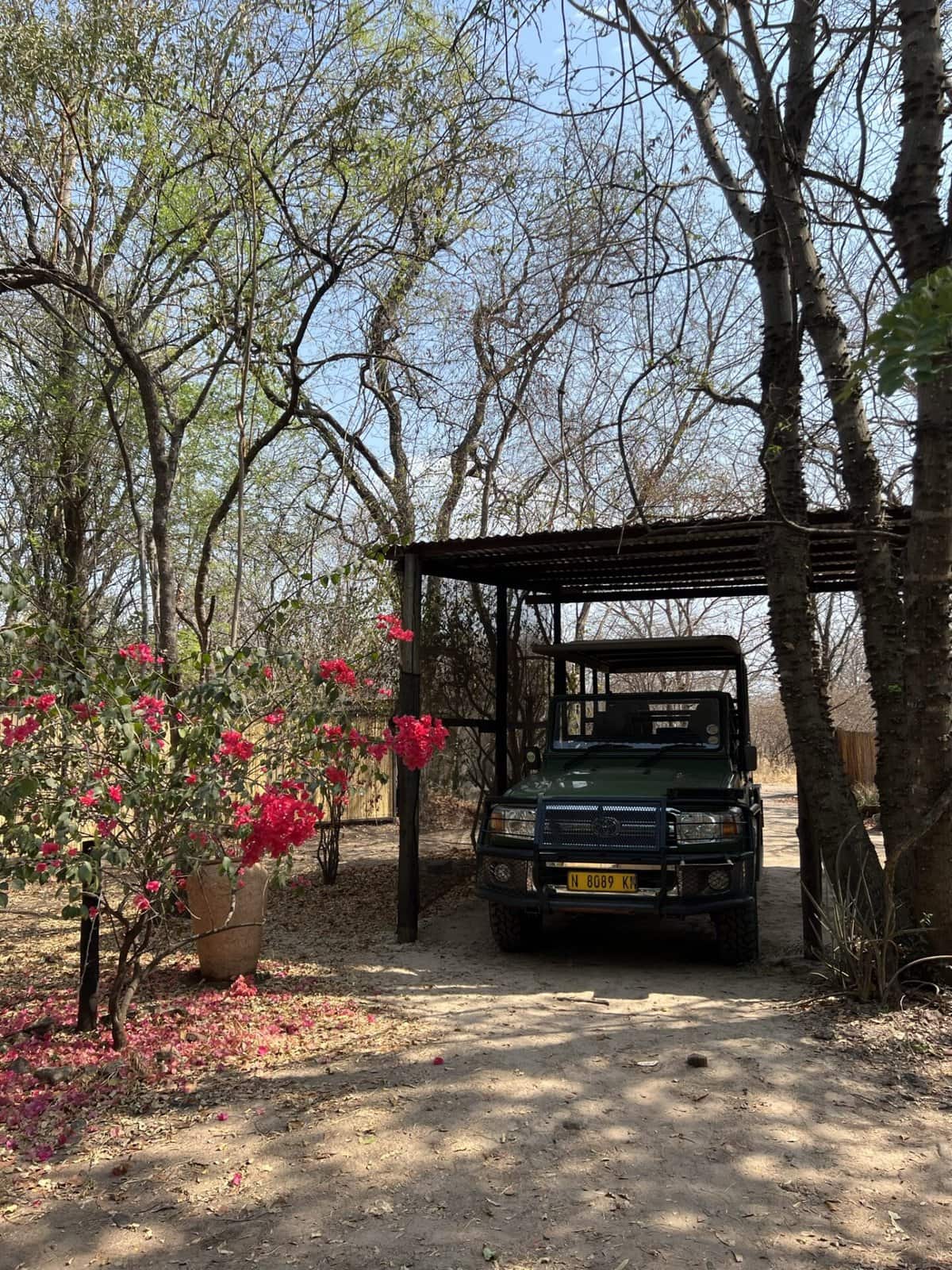
7. But be prepared for bathroom shortages – and you may need to pay
You may be thinking, “you just told me to stay hydrated now you’re telling me there may not be a bathroom?”
Sorry. 😅
Scouting out bathrooms is a weird hobby of mine.
But as someone who has to go pee three times after a cup of coffee, you start sourcing out where the nearest washroom is.
Fortunately, most safari companies realize people actually need to use the bathroom from time to time, so most stops are planned between the 2.5-3 hour mark.
Some of these washrooms may also require payment – in coins. This sucks if you’re only carrying bills. If you’re at a store, see if you can purchase something small and get some change – or see if they’ll break a bill for you.
Related: 5 Quick Tips for Staying Regular While Travelling
8. Be mindful of tap water
Still on the topic of hydration, this one deserved it’s own section.
While the tap water in large cities like Cape Town and Johannesburg are safe to drink, it’s the rural areas you want to look out for.
When we stayed at Ichingo River Lodge in Namibia, they used the Chobe River water for their shower and taps. We brushed our teeth with canned water. It’s odd to get used to but it’s much safer than contracting some type of water-borne disease.
If you don’t have access to bottled or canned water, you can pick up some water purification tablets to bring along with you to add to either a glass or a reusable water bottle .
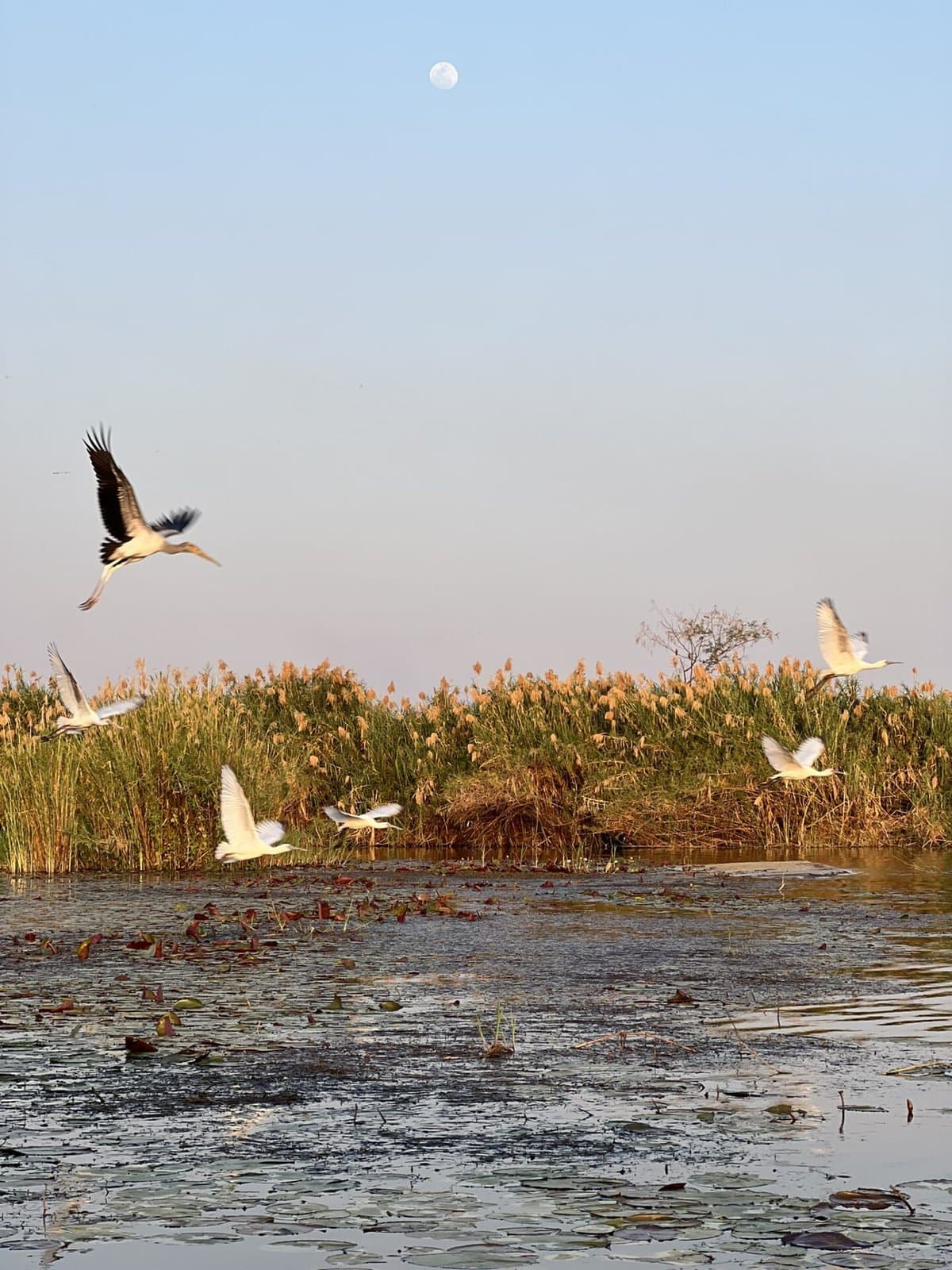
9. Bring a credit card (or two) and enough cash
While credit cards are often a heavily relied-upon method of payment, the reality is your card may or may not work, depending where you are.
Unfortunately we experienced this on our recent trip to Africa – where it worked in remote places but not in major cities.
It’s also important to note that USD isn’t always accepted as currency, either (except in the event of purchasing visas trans-border). If you’re planning to spend a while in a country, it’s best to get some of their local currency either at your bank at home or a local bank once you arrive.
And a word to the wise – bring more cash than you think you may need. Some scenarios may pop up that you’re least expecting, like an emergency visit to a clinic in Botswana or an added visa fee to get into Zimbabwe.
10. Try the local cuisine
You would be doing a disservice to the beautiful continent of Africa if you didn’t try local cuisine!
Whether its Bobotie in South Africa, Jollof Rice in Nigeria, dikgobe in Botswana, or a variety of unusual game meats, they’re all worth trying and enjoying.
You can even get adventurous with your taste buds; I tried a mopane worm in Zimbabwe, which is something that is often eaten because of its high protein content!
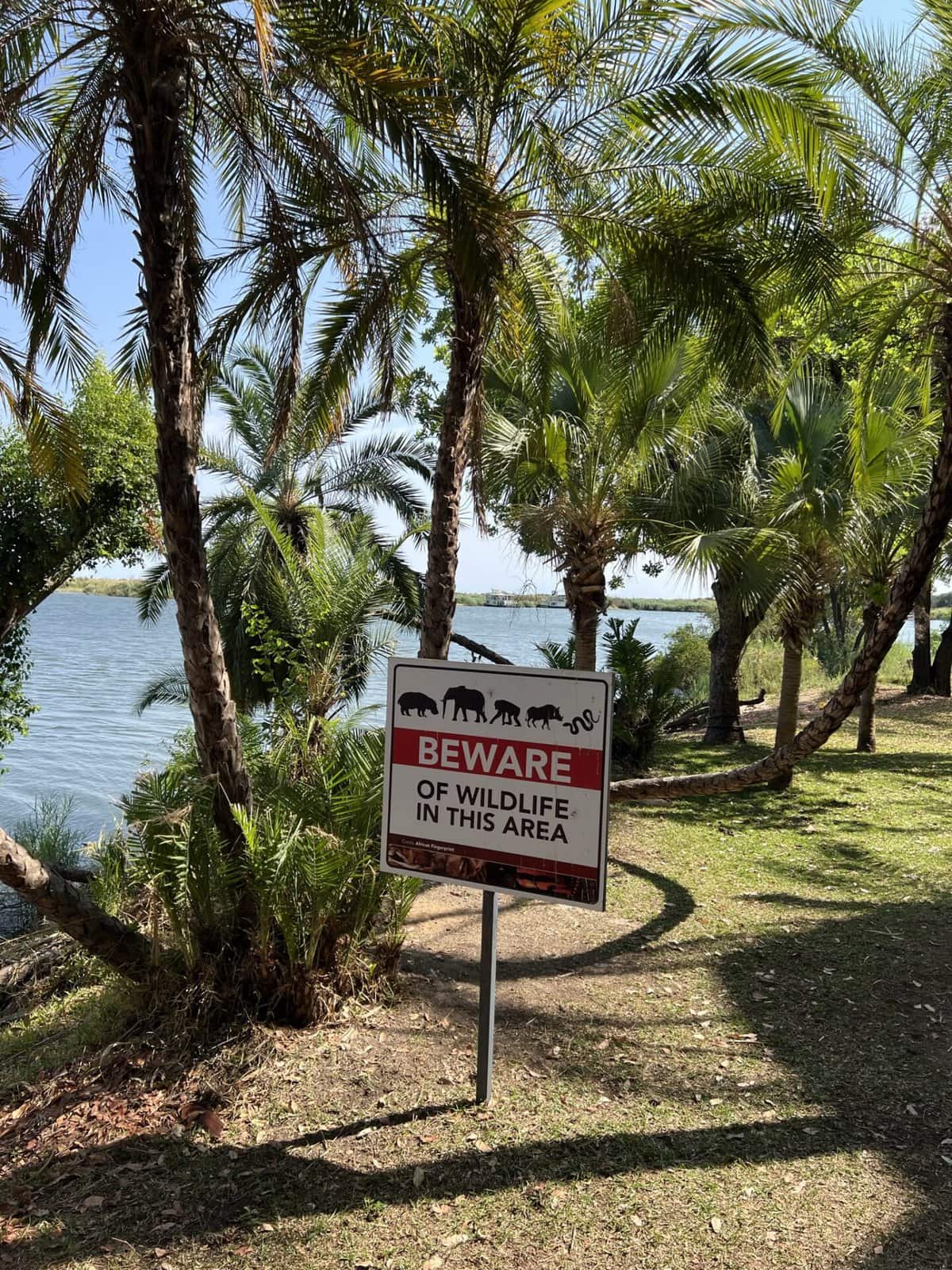
11. Check for malaria risk zones, and prepare yourself
If you’re travelling to remote areas, especially ones on the water like Chobe National Park, be prepared for a lot of bugs.
While most accommodations offer bug spray and regularly spray the rooms and properties, bringing your own can minimize any chances of it not being available.
If you’re travelling to an area considered high risk for malaria, you may want to consider booking an appointment with your Doctor well in advance of your trip to get any necessary medication.
While pills can help protect you against mosquito-borne illnesses, they can also upset your stomach – hence why I always overpack Imodium/Loperamide in my travel m e dical kit .
If you can’t get pills prior to leaving, plan on bringing bug spray, bug deterrent cream, and long-sleeve shirts and pants.
It was a waiting game for me when I got home from our recent 12 day African trip to see if I got malaria.
Symptoms typically show up within 10 days, and the bites that were all over my legs were the itchiest I ever had.
Fortunately I didn’t end up contracting it, but knowing what it would’ve been like, I definitely would’ve made an appointment with my Doctor sooner as a preventative.

12. Bonus tip: Keep your blanket from your flight!
A final word of wisdom: If you’re given a blanket on your flight, keep it for early morning safaris.
This is of course, if your luggage allows. Early mornings are bone-chilling cold, combined with the wind from being in an open-air jeep.
We ended up taking blankets from our room at Kgalagadi Lodge with us to Kgalagadi Transfrontier Park because the temperature was near freezing at 5:30 am.
If you don’t think you’ll have room for a fleece airplane blanket, just be sure to pack something warm with you – along with a scarf to protect your face.
Check out more items to pack for a safari
African Safari Tips: Things I wish I knew
I hope this list of tips for your first African safari is helpful! I really wish I knew a few of these tips before I went for the first time. As long as you’re prepared for what may come your way, the experience is absolutely magical.
Related Posts
- 6 Unique Things to do in Cape Town
- Kgalagadi Lifestyle Lodge Review
- City Lodge Hotel at OR Tambo Johannesburg Review
- Where to Find the Best Views in Cape Town
- Scrubba Wash Bag Review: Travel With a Portable Washing Machine
Pin it for later!
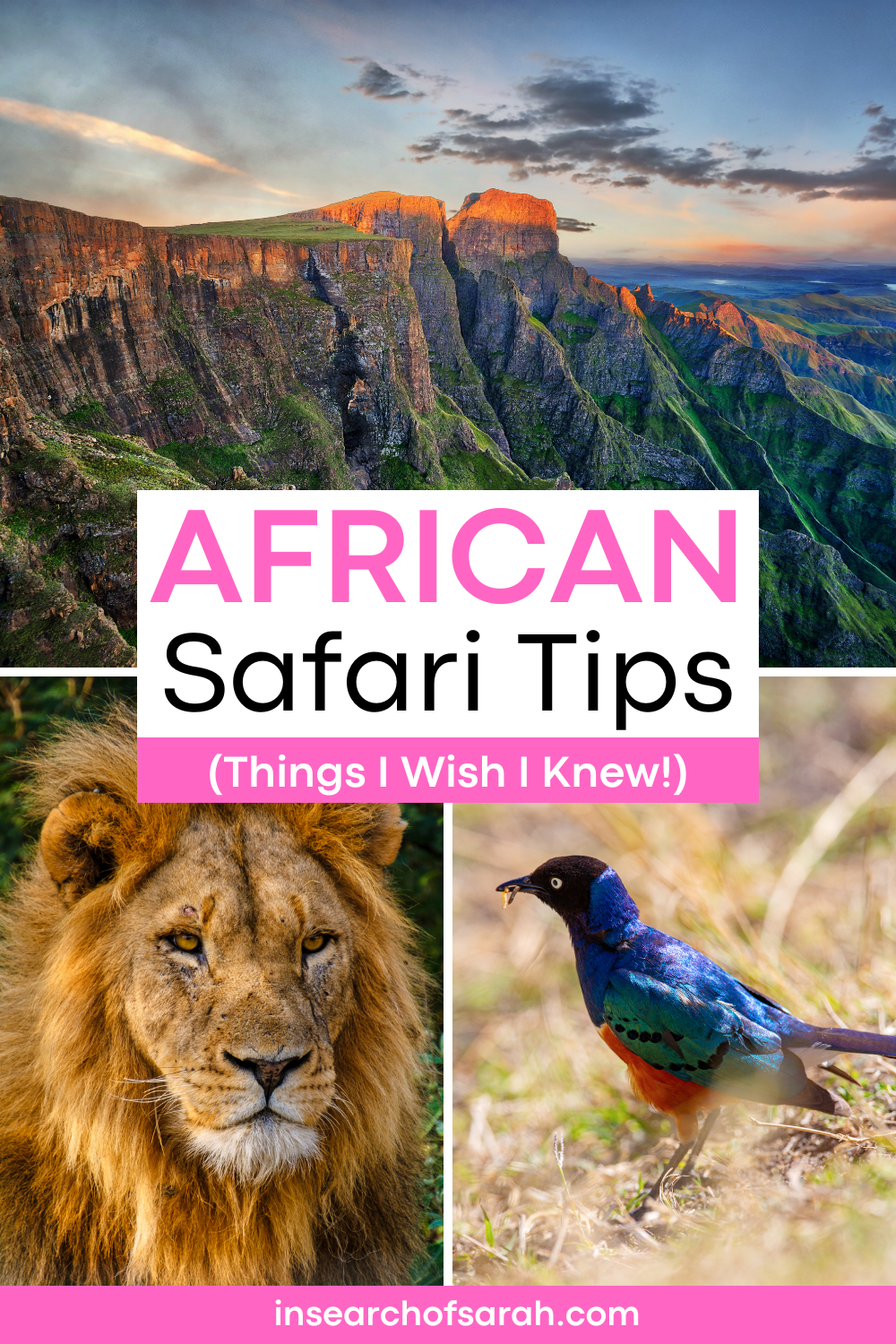
Privacy Overview
- Destinations
- Winery Directory
African Safari Planning Guide: 20 Tips To Prepare and Book a Safari
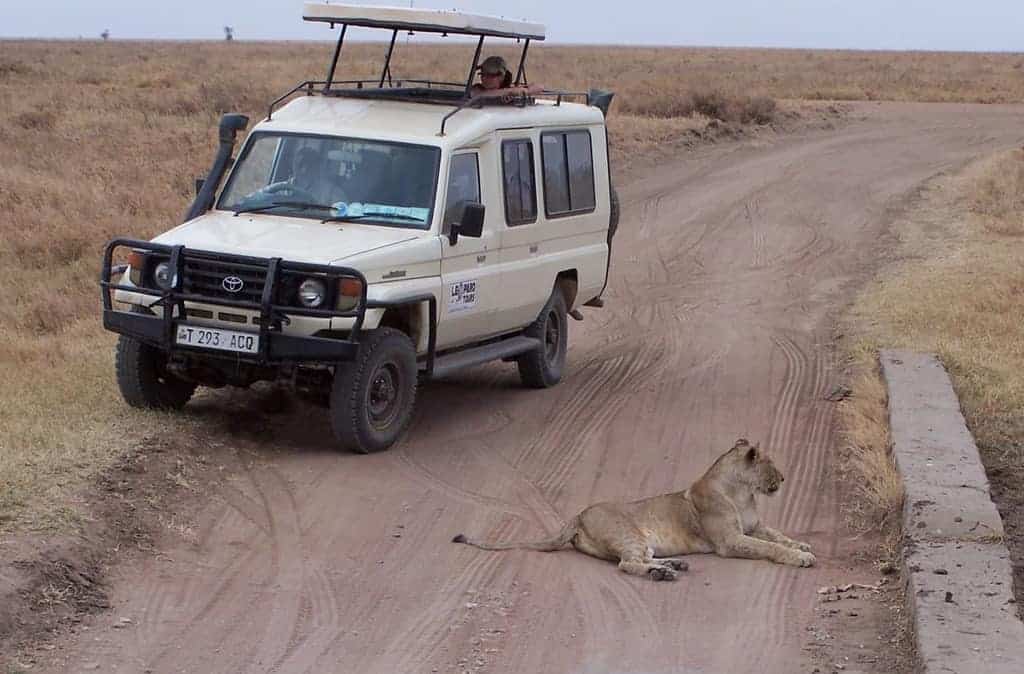
How To Plan a Safari
Are you dreaming of an African safari trip, or maybe you already have one planned? Here are 20 tips to help you plan your trip and manage expectations. While many of these tips will be helpful for any African safari trip, they are primarily focused on Tanzania and Kenya .
Select a Quality Tour Operator
Experienced guides with knowledge of the terrain and an understanding of the animals’ movements will maximize your safari adventure by increasing your wildlife encounters. Here are some of the most highly rated safari tour operators you might consider booking with.
There are many tour operators to choose from at a wide range of price points. The type of safari you choose, the time of year, and duration will factor into the cost. Mid-range and luxury safaris average around $350-$750 per person per day. Many ultra-luxury options are available where the accommodations alone may cost $1,500-$2,500 per night. When comparing prices ensure to review all inclusions, such as whether the lodging, guides, transportation, meals, and park fees are included. Entrance fees for adults at many parks range from ~$50-$80 per person per day.

When to Safari
Wildlife viewings are always plentiful, but seasons and wildlife patterns vary throughout the year and may be different depending on which country or countries you plan to visit. For example, June and July are generally your best months to witness the wildebeest migration in the Serengeti National Park. The wildebeest calving season, where an estimated 8,000 calves are born each day, typically occurs around February in the Serengeti. The migratory animals generally cross the crocodile and hippopotamus infested waters of the Mara River in Kenya around August through September.
Safari Resorts
Communicate with your tour operator ahead of time so you know what to expect at your resorts. Many safari resorts are located in the national parks virtually in the middle of nowhere. All of the resorts we stayed at were luxurious and uniquely designed and decorated. Many of our rooms were in individual cottages, huts, “tents”, or other separated structures. While our safari resorts were all very different, we experienced many commonalities. We were always welcomed with the warmest hospitality and graciously catered to and spoiled beyond measure. We were often greeted with smiling faces offering us freshly squeezed cold juice and a damp towel to clean off the dust.
Beds : Our beds were protected by a netting enclosure to help keep the creepy critters away. Underneath our sheets, as we crawled into bed were hot water jugs keeping the bed warm and toasty during the night. The heat was very calming and relaxing after a long day of safaris.
Hot Water : Hot water is not always consistent and may be rare in budget hotels. All of the lodges we stayed at had at least some hot water. At one of our lodges, we were given a card that outlined the limited time slots during the day when hot water was available. The lodge we stayed at before hiking Mount Kilimanjaro only had hot water available for about 5 minutes at a time.
Armed Escort : When returning to your room after dinner, expect to be accompanied by an armed escort to keep guard of lurking buffalo or other wildlife.
Overeating : Most of the lodges served full 3-course meals 3 times per day. The African-inspired meals were plentiful, varied, and delicious. While we had picnic lunches while we were on game drives, any time we returned to a lodge for lunch, a gourmet feast was waiting for us. Bush dining was offered at many of the resorts and is an experience you should try at least once during your safari vacation.
Resort Style Pools are offered at many of the lodges.
Common Swahili Words and Phrases
We always try to learn at least a few everyday basic phrases and greetings whenever traveling to a foreign country. While both Swahili and English are widely spoken in Tanzania and Kenya, knowing even a few words in Swahili is often well-received.
Swahili is one of my favorite languages. The words sound fun and put me in a good mood listening to them. I don’t think it’s possible to say “Jambo!” meaning “Hello” without smiling at least a little. Here are a few other basic phrases to get you started:
Asante sana – Thank you very much
Karibu – You’re Welcome
Choo – Toilet
Kwaheri – Goodbye
If you’re a 90’s kid, or otherwise loved The Lion King movie, you already know a little bit of Swahili. Hakuna matata translates to mean “no problem” or “no trouble,” and was a phrase we heard and used frequently. Other Swahili words from the popular animated movie include: Simba meaning lion, Rafiki meaning friend, and Pumbaa translating to foolish.
What to Wear
What to wear on a safari has little to do with fashion, although you can be as stylish as you like. You want to avoid wearing colors or patterns that may scare or confuse the wildlife or possibly get you into trouble with law enforcement.
Color Dos and Do Nots: Lighter, neutral-colored clothing with breathable quick-dry fabrics are your best options. Earth tone colors such as khaki, tans, browns, and olive green are excellent options because they blend in with the landscape. Bright colors are believed to scare animals and make them hide, which would defeat the purpose of going on a safari. We were informed tribal men often wear bright red as they believe it will scare the predatory animals from preying on their cattle. Your color options are more important if you’re doing a walking tour than during a game drive, but it’s always a good idea to give yourself the best chance to see wildlife.
Black and dark blue should be avoided as blood-sucking tsetse flies tend to be attracted to these colors. White may turn tan or khaki by the end of the day and may startle wildlife as it is reflective. Don’t wear animal printed clothing, which is prohibited at some zoos, as it can confuse animals. Wearing a pith hat/helmet may be offensive as symbolic of colonial rule. Wearing camouflage may cause unwanted questioning (or worse) by police and is illegal in some countries for anyone other than official military personnel to wear.
Quick-drying fabric is important as driers may be hard to come by. To avoid purchasing single-use clothing, I bought long-sleeve button-down shirts that were breathable and fast drying that were ideal for hiking, fishing, and hot boating days and then wore a tank top underneath. I also purchased quick-drying pants that converted into shorts, although I often preferred staying in long pants because of the dust and bugs.
Shoes : Close-toed shoes protect you from pesky critters. If you’re doing a walking safari, you’ll want sturdy well-broken-in hiking shoes.
Accessories : Wide-brimmed hats and sunglasses are important to help protect your face and eyes from the harsh sunlight. Bandanas, scarves, or something similar come in handy to help prevent dust from getting in your mouth and nose. Some even bring surgical masks.
If your safari trip takes you on smaller single-engine charter planes, packing light may be necessary. You should confirm weight and size limitations with the airline company. The small planes we flew on during our first trip to East Africa had a luggage weight limit of not more than 33 pounds, including any carry-on luggage and purses. There was also a size limitation not to exceed ~14.5 by 27 inches as larger bags cannot fit through the cargo door. If you absolutely must travel with additional luggage, purchasing a premium class seat or an extra seat may be an option.
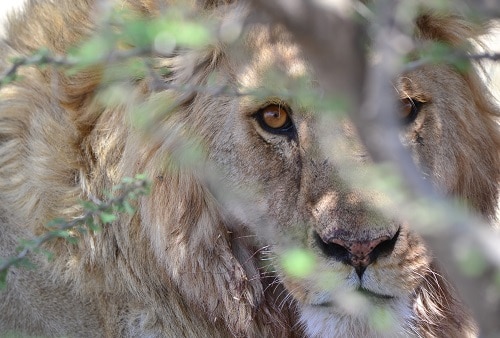
The Excitement of the First Wildlife Encounter
Seeing your first animals in the wild typically ignites excitement. While we had been told stories of how many animals we would see and how close they would get, it’s hard to appreciate the amount and closeness until witnessing it firsthand. Our first two sightings were an elephant and then a buffalo. Both were over 20 feet away and partially hidden by trees. We stood up through the roof of our safari vehicle frantically snapping pictures and staring in awe. Our guide encouraged us to continue onwards with the promise those were only the beginning. By the next day, we would not have looked twice at most animals that far away, unless it was one of the big cats or a rhino.
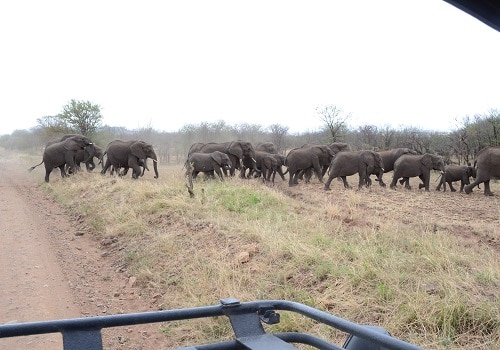
Animal Spotting
While bountiful wildlife is nearly guaranteed to greet you throughout your wilderness journey, you may not see every type of animal. The longer your safari holiday, the better your chances. Different parks are home to different animals. The most frequently sought after animals include the “ Big Five ,” which refers to the lion, leopard, rhinoceros, elephant, and buffalo.
Elephants, giraffes, zebras, wildebeests, buffalos, hippos, hyenas, baboons, gazelles, impalas, topis, and even lions (since they are often seen in prides) are generally easy to find and often can be seen in extremely close proximity to your vehicle. Cheetahs are commonly seen solo or in pairs. Leopards and then rhinoceroses may be the most difficult to spot.
The anticipation is high each day since you never know what surprises await you on a safari. Be on the lookout for wildlife throughout your safari experience. While the guides are excellent at spotting them, the more eyes searching only increase your chances of seeing highly sought after wildlife. Remember to talk in soft voices to avoid scaring the animals away.
Seeing a Kill is Rare
Manage your expectations. Being in the right place at the perfect time to witness the predatory cat stalk and kill its prey isn’t a common occurrence on a safari. It is, however, exciting to sit there in anticipation and maybe witness a chase.
Best Viewing Time of Day
Viewing wildlife is typically better earlier in the morning and later in the day. It is common to return to the lodge to eat lunch since many animals rest midday. Most of the lions and cheetahs we encountered during our safaris were lounging underneath the shade of a tree mid-afternoon.
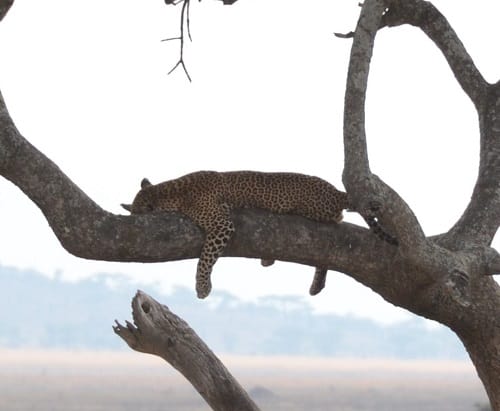
Bumpy and Dusty Roads
Driving is on the left side of the road in Tanzania and Kenya. Many roads are bumpy and dusty, especially within the parks where the roads are unpaved. Potholes and animal crossings are common. Make sure your mouth, nose, and eyes are covered and close your windows as you are passing or being passed by another vehicle as this often causes you to be engulfed in a cloud of dust.
Keep Car Windows Closed When Leaving Your Vehicle
Remember to close your car windows when departing your vehicle. Monkeys or other wildlife may let themselves in if you forget and destroy the vehicle. We saw this happen at a picnic stop when a family left their vehicle to use the restroom and left their windows open. Keep your hotel room doors and windows closed, as well.
Biting tsetse flies, mosquitoes, and other bugs are sure to tag along on your safari at least some of the time. Some of the bugs bite right through your clothes. Covering up and wearing insect repellent, especially in the evenings, will help. There’s even bug repellent sprays you can apply directly to your clothing. The bugs were only bothersome to me during a couple of days.
Public Bathrooms
Whenever a public bathroom is available, use it. The bathrooms are few and far between but were generally available by park entrances and designated picnic areas. The restrooms in the parks in Tanzania and Kenya typically had the option of at least one regular Western toilet along with squat toilets in the other stall(s), which are essentially little more than a hole in the ground.
Bring your own tissues/toilet paper and hand sanitizer (or other liquid soap) and keep them with you as many bathrooms were lacking in one or both. Our guides always had excess toilet paper and hand sanitizer, but I always prefer being prepared with my own supply.
Safety While on Safari
While safaris are generally very safe, it’s important to respect the wildlife and follow your guide’s instructions to maintain safety. Always stay in the vehicle during your safaris, unless you are at a designated area tourists are allowed to walk around.
When you are walking around, be mindful of where you step. If searching for an outdoor bathroom spot, ask your guide’s advice and don’t venture too far. Venomous snakes and scorpions may be in the bush. The big cats camouflage in the surroundings and may be closer than you realize. Buffalos, while herbivores, are extremely aggressive and dangerous toward humans.
If you need to walk around at night while at your lodge (such as to and from dinner), make sure a guard escorts you. There are generally no fences and wildlife can be anywhere. It was not unusual to see lions lounging or buffalos wandering very close to our lodges.
Keep your distance from hippos. While hippos appear very calm, they can be very aggressive, territorial, and are the most deadly large animal to humans in Africa. We watched enormous crocodiles shy away from approaching hippos defining their territory.
Upgrade Your Camera
This is a trip worth investing in a better camera or renting one. Having fast autofocus and a longer lens will help you obtain great photos of moving wildlife and/or wildlife that is a little farther away. My only regret from my first safari trip was not having upgraded our camera. After upgrading to a 200mm lens on my second safari trip, we wished we had a longer lens, such as 600mm .
Having a small tripod or a beanbag is helpful when taking pictures from the safari jeeps. A bigger tripod was impractical except at the lodges. Bring extra batteries and camera cards with you while out on safari.
Visas and Vaccinations
Check the websites for the Embassies of Tanzania and Embassy of the Republic of Kenya and their visa websites for the most current information, vaccination requirements, as well as any travel restrictions.
The CDC has a list of recommended vaccinations in Tanzania and Kenya . I recommend a visit with your local travel clinic in advance of your trip. At least one of the recommended vaccinations we needed required a series of applications. We needed to take the malaria pills at least a couple of days before our trip started and needed to continue taking them after we returned home.
Food and Drinking Information
Review the CDC’s eating and drinking safety recommendations to reduce the likelihood of travelers’ diarrhea and other diseases. For Tanzania and Kenya, the CDC recommends not drinking tap water, ice made with tap water, or eating undercooked fish, meat, or eggs, and raw or unpeeled fruits and vegetables that haven’t been washed in clean water.
Remember that not drinking the tap water includes not even using the water to brush your teeth. Most, if not all, the hotels we stayed at kept bottled waters by the sink in the bathroom, which served as a helpful visual reminder not to use the tap water. I’d recommend doing this even if your hotel does not as turning the sink on to rinse your toothbrush can be second nature.
Plastic Bag Ban
Check the status of whether and to what extent plastic bags are prohibited before traveling, as more and more countries, such as Tanzania, Kenya, and Rwanda, have plastic bag bans.
Get Articles Like These Directly in Your Inbox!
Subscribe to Winetraveler and receive notifications when new articles are published. It's free!
Email Address
Sign Me Up!
Login to view more Articles
Leave a comment, ask a question or share a review cancel reply, you might also like, best mornington peninsula wineries & wine tours for 2024, ultimate guide to visiting châteauneuf-du-pape’s best wineries in 2024, 16 best wineries to visit near rome in 2024, 15 best mclaren vale wineries & wine tours to try 2024, 15 best things to do in cape town during 2024, 7 day kenya itinerary: luxury safari & the big five, how to spend one week in tanzania, cheers to free membership.
Explore new paths. Travel expertise from locals and wine industry experts.
Get free access to all the goods:
- Exclusive articles
- In-depth itineraries
- …and more
Winter is here! Check out the winter wonderlands at these 5 amazing winter destinations in Montana
- Travel Guide
Our Top 10 Essential African Safari Tips
Published: September 21, 2023
Modified: January 3, 2024
by Hynda Spooner
- Plan Your Trip
- Travel Tips
Introduction
Welcome to the adventure of a lifetime – an African safari! Embarking on an African safari is an experience like no other, where you will have the opportunity to see the magnificent wildlife, explore breathtaking landscapes, and immerse yourself in the rich and diverse African culture. Whether you’re a seasoned traveler or a first-time explorer, it’s important to be well-prepared to make the most of your safari experience. In this article, we will share our top 10 essential African safari tips to ensure that your adventure is both memorable and enjoyable.
Before we delve into the tips, let’s take a moment to discuss what makes an African safari such a unique and extraordinary experience. Africa is home to some of the most iconic wildlife species, such as lions, elephants, rhinos, leopards, and buffalo, as well as a myriad of other fascinating animals and birds. Imagine witnessing these magnificent creatures up close in their natural habitat, with the vast African savannah as a backdrop. The sights, sounds, and smells of the African wilderness create an immersive experience that will stay with you forever.
Aside from the wildlife, Africa’s landscapes are incredibly diverse and awe-inspiring. From the sprawling savannahs of the Serengeti to the dense jungles of Bwindi Impenetrable Forest, there is something for every nature lover. Whether you’re seeking the thrill of a game drive, the serenity of a walking safari, or the adrenaline rush of a hot air balloon ride, Africa offers a multitude of safari activities and experiences to suit every preference.
Furthermore, an African safari is an opportunity to immerse yourself in the vibrant local cultures and traditions. Engage with friendly locals, learn about their customs, and savor the flavors of authentic African cuisine. Respectful behavior and cultural etiquette are essential when interacting with local communities, so we will provide some guidance in that regard as well.
Now that we’ve set the stage, let’s dive into our top 10 essential African safari tips that will help you make the most of your adventure.
Best time to go on an African safari
Choosing the right time to embark on your African safari can greatly enhance your wildlife viewing opportunities and overall experience. The timing will largely depend on the specific destination you plan to visit as different regions have different seasonal patterns and wildlife migration cycles. Here are some key factors to consider when determining the best time for your African safari:
Peak season: The peak safari season varies across different countries and regions in Africa. Generally, it coincides with the dry season when the weather is more predictable, and wildlife gathers around water sources, making it easier to spot. Peak seasons are typically between June and October in East Africa, and July to September in Southern Africa. However, it’s important to note that peak seasons also mean larger crowds and higher prices.
Green season: The green or rainy season may not be the first choice for many travelers, but it can offer its own unique advantages. This season, usually from November to April, brings lush vegetation, newborn animals, and fewer tourists. The landscapes are beautifully green, and bird watching is especially rewarding during this time. While the wildlife may be more dispersed, you can still have incredible wildlife sightings.
Migration patterns: The Great Migration, where millions of wildebeest, zebras, and other herbivores move across East Africa in search of food and water, is a phenomenon not to be missed. The best time to witness the migration varies depending on your desired location. For the Serengeti in Tanzania, the migration typically occurs between June and July. In Kenya’s Masai Mara, it usually takes place from July to October. Research the specific migration patterns for your chosen destination to plan accordingly.
Special wildlife sightings: Some destinations have specific seasons that offer unique wildlife encounters. For example, if you’re interested in seeing gorillas in Uganda or Rwanda , the dry season (June to September and December to February) is recommended. For whale watching in South Africa, the best time is from June to November. Research the specific wildlife you want to see and their corresponding seasons to optimize your chances of spotting them.
Weather and climate: Understanding the weather patterns of your destination is crucial. While dry seasons generally offer easier wildlife viewing, they also tend to have hotter temperatures. Cooler seasons may be more comfortable for some travelers but could potentially impact wildlife sightings. Research the typical weather conditions and pack accordingly to ensure you are prepared for any climate variations.
Ultimately, the best time for your African safari depends on your preferences, whether it’s fewer crowds, specific wildlife sightings, or particular seasonal experiences. Consider these factors and do thorough research to determine the optimal time to embark on your adventure and make unforgettable memories in the African wilderness.
Choosing the right safari destination
When it comes to African safaris, the choices can be overwhelming. Africa is vast and diverse, offering a plethora of safari destinations that cater to different interests and preferences. Here are some key factors to consider when choosing the right safari destination for your adventure:
Wildlife: Different regions in Africa are known for their unique wildlife populations. If you have specific animals on your must-see list, research which destinations offer the best opportunities for spotting them. For instance, if you’re keen on seeing the Big Five (lion, leopard, elephant, rhinoceros, and buffalo), destinations like Kruger National Park in South Africa or the Maasai Mara National Reserve in Kenya are excellent choices.
Habitats and landscapes: Africa is home to a wide range of habitats, each with its own distinct beauty. Whether you’re captivated by the vast savannahs, dense rainforests, or dramatic mountains, consider the type of landscapes that inspire you. For example, if you’re drawn to lush jungles and the chance to encounter gorillas, consider Uganda’s Bwindi Impenetrable Forest or the Volcanoes National Park in Rwanda.
Accessibility: The ease of travel and accessibility to your chosen destination are important factors to consider. Some areas may require multiple flights or long road transfers, while others have direct access to major airports. Take into account the time and effort it takes to reach your destination, especially if you have limited travel time or specific preferences for direct flights.
Budget: Your budget will also play a role in determining your safari destination. Some regions and lodges are more exclusive and luxurious, while others offer more budget-friendly options. Research the cost of accommodations, park fees, and activities in your desired destinations to ensure they align with your financial capabilities.
Time of year: As mentioned earlier, the best time to visit certain destinations can vary depending on the wildlife migration patterns, weather, and seasonal activities. Determine when you plan to go on your safari and choose a destination that offers optimal conditions during that time. Consider the destination’s peak season, shoulder seasons, or special events that may coincide with your travel dates.
Additional attractions: Some safari destinations offer additional attractions and activities beyond game drives. If you’re interested in cultural experiences, consider destinations that have rich local cultures and opportunities to interact with indigenous communities. Alternatively, if you’re a bird lover, choose a destination known for its diverse bird species.
Ultimately, the right safari destination is the one that aligns with your interests, priorities, and budget. Research different options, consult with a reputable safari operator, and consider speaking to travel experts who can offer insights based on your specific preferences. With careful planning, you’ll find yourself in the perfect destination to embark on your unforgettable African safari adventure.
Selecting the best accommodation
Choosing the right accommodation is a crucial aspect of planning your African safari. The accommodation you select can greatly enhance your overall experience, providing comfort and convenience after a long day of wildlife sightings and adventure. Here are some factors to consider when selecting the best accommodation for your safari:
Location: The location of your accommodation is key to maximizing your safari experience. Consider whether you prefer staying inside the national parks or reserves to have immediate access to wildlife. Alternatively, you may opt for accommodations located in nearby communities, which may offer a more cultural and immersive experience. Additionally, proximity to key wildlife viewing areas or specific activities you want to undertake should also be taken into account.
Accommodation type: African safaris offer a range of accommodation options, from luxury lodges and tented camps to budget-friendly options like guesthouses or self-catering cottages. Luxury lodges and tented camps provide a high level of comfort, personalized service, and excellent amenities. These options often include game drives, meals, and other activities as part of their packages. On the other hand, budget-friendly accommodations offer a more affordable option, though with fewer amenities and services.
Amenities and facilities: Consider the amenities and facilities that are important to you. If you value a swimming pool, spa services, and gourmet dining, luxury lodges may be the ideal choice. However, if you prefer simplicity and a closer connection to nature, basic tented camps or wilderness campsites might be more suitable. It’s important to remember that the focus of your safari will be on the wildlife and nature rather than the accommodations themselves.
Reviews and recommendations: Before making your final decision, read reviews and seek recommendations from reliable sources. Websites, travel forums, and social media platforms can provide valuable insights from fellow travelers who have experienced the accommodations firsthand. Pay attention to factors like cleanliness, service quality, and the overall wildlife experience provided by the accommodation.
Guides and staff: The quality and knowledge of safari guides and staff can greatly enhance your wildlife sightings and overall safari experience. Research the reputation of the accommodation’s guides and staff to ensure they are experienced, knowledgeable, and passionate about wildlife. Their expertise can make a significant difference in your understanding and appreciation of the African bush.
Ecotourism and conservation efforts: If you are environmentally conscious and prioritize sustainability, consider accommodations that actively engage in ecotourism practices and contribute to conservation efforts. These establishments often focus on minimizing their environmental footprint, supporting local communities, and protecting wildlife. Their commitment to responsible tourism can give you peace of mind knowing that your safari experience is contributing to the preservation of the natural wonders of Africa.
By considering these factors, you can select the best accommodation that aligns with your preferences, budget, and desired safari experience. Keep in mind that the true highlight of your African safari will be the wildlife encounters and the breathtaking landscapes, so choose accommodation that serves as a comfortable and convenient base for your adventure.
Packing essentials for your safari
When preparing for your African safari, packing the right essentials is key to ensuring a comfortable and enjoyable experience. Here is a list of essential items to consider when packing for your safari:
Appropriate clothing: Pack lightweight, breathable clothing in neutral colors to blend in with the natural surroundings and avoid attracting unnecessary attention. Long-sleeved shirts and pants will protect you from the sun and insects. Don’t forget a wide-brimmed hat, sunglasses, and a lightweight rain jacket or poncho for unexpected weather changes.
Comfortable footwear: Bring comfortable, closed-toe shoes with good traction for walking safaris. Additionally, pack a pair of sandals or flip flops for relaxing at your accommodation.
Binoculars and camera gear: Having a pair of binoculars will greatly enhance your wildlife viewing experience. A camera with a zoom lens is essential for capturing those incredible moments. Don’t forget extra memory cards, batteries, and a charger.
Insect repellent and sunscreen: Protect yourself from mosquito bites and the harsh African sun. Choose a high-quality insect repellent and sunscreen with a high SPF. Remember to apply them regularly, especially during early morning and late afternoon game drives.
Personal medication and toiletries: Bring any prescription medications you may need, as well as a basic first-aid kit with essentials like band-aids, pain relievers, and antiseptic cream. Pack your personal toiletries, including biodegradable toiletries to minimize your environmental impact.
Travel documents and essentials: Carry a copy of your passport, travel insurance details, and any necessary visas. It’s also a good idea to have a small daypack for carrying your essentials during game drives, such as your camera, water bottle, and personal items.
Electrical adapters and chargers: Africa uses various plug types, so be sure to pack the appropriate adapters for your electronic devices. Don’t forget to bring chargers for your camera, phone, and other electronics.
Reusable water bottle and snacks: Staying hydrated is essential, so bring a reusable water bottle to refill during your safari. It’s also a good idea to pack some snacks like energy bars or nuts for those times between meals during long game drives.
Personal comfort items: Consider bringing items that will make you comfortable during your safari, such as a travel pillow, a light blanket, or a scarf for cooler mornings or evenings.
Respectful clothing for cultural visits: If you plan to visit local communities or cultural sites, pack clothing that is respectful and modest out of cultural sensitivity. This may include long pants or skirts and shirts that cover the shoulders.
IMPORTANT: Always check with your safari operator or accommodation for specific packing requirements or any additional items that may be recommended for your particular destination.
Remember, packing light is key to convenience and ease of travel, so prioritize the items that are essential for your comfort and safety. Be mindful of weight restrictions on domestic flights, as well as any luggage limitations imposed by your safari operator.
By packing these essentials, you’ll be well-prepared to embark on your African safari adventure and create lasting memories in the heart of the wild.
Understanding the wildlife and safety precautions
When going on an African safari, it’s important to have a good understanding of the wildlife you may encounter and to take necessary safety precautions to ensure a safe and enjoyable experience. Here are some key points to consider:
Respect wildlife from a distance: While it’s exhilarating to see wildlife up close, it’s crucial to maintain a respectful distance and not disturb or provoke the animals. Admire them from a safe distance and never attempt to touch or feed them. Remember that they are wild animals and should be treated as such.
Listen to your safari guide: Your safari guide is your expert on the wildlife and the environment. Listen carefully to their instructions and abide by their guidance at all times. They will share important information about wildlife behavior, safety protocols, and how to best maximize your safari experience.
Stay inside your vehicle: During game drives, remain inside your vehicle unless instructed otherwise by your guide. The open-air vehicles provide a safe and elevated perspective for observing wildlife. Disembarking from the vehicle without guidance can put you at risk, as some animals may perceive you as a threat.
Keep noise to a minimum: While on game drives or walking safaris, it’s important to keep noise levels to a minimum. Loud noises can startle or distress wildlife, leading to potentially dangerous situations. Remember, the goal is to observe animals in their natural behavior without disturbing their natural rhythm.
Be aware of your surroundings: Pay attention to your surroundings at all times during your safari. Watch for signs of animal movement, listen for alarm calls from birds or other animals, and be mindful of any potential hazards or restricted areas pointed out by your guide.
Follow park regulations and guidelines: Each national park or reserve has its own set of regulations and guidelines for visitor safety. Familiarize yourself with these rules, such as speed limits, designated areas for food consumption, and restrictions on off-road driving. Respecting these guidelines helps maintain the balance between human presence and the natural environment.
Protect against insect bites and sun exposure: Insect bites can be a nuisance, and in some areas, mosquitoes may carry diseases like malaria. Apply insect repellent and wear long-sleeved clothing, especially during dawn and dusk when insects are more active. Additionally, protect yourself from the African sun by applying sunscreen, wearing a hat, and staying hydrated.
Travel with a reputable safari operator: The expertise and experience of your safari operator play a significant role in ensuring your safety. Choose a reputable operator that adheres to safety standards, employs knowledgeable guides, and prioritizes guest well-being.
Be prepared for wildlife encounters: Although most wildlife encounters are safe, it’s essential to be mentally prepared for different situations. Understand that animals can be unpredictable, and it’s important to remain calm and follow the instructions of your guide in the event of any close encounters.
By understanding the wildlife and following these safety precautions, you can have a memorable and safe African safari. Remember to be respectful of the animals and their habitat, allowing them to thrive undisturbed in their natural environment, while you enjoy the privilege of witnessing their beauty and majesty.
Top safari activities and experiences
An African safari offers a wide range of exciting activities and unique experiences that allow you to immerse yourself in the beauty and wonder of the African wilderness. Here are some of the top safari activities and experiences to consider:
Game drives: Game drives are a quintessential safari experience. Hop into a 4×4 vehicle with a knowledgeable guide who will navigate through the national parks or reserves, taking you on an adventure to spot the incredible wildlife. You’ll have the opportunity to witness lions, elephants, giraffes, zebras, and many other animals in their natural habitat.
Walking safaris: Walking safaris offer a more intimate connection with nature. Accompanied by an experienced guide, you’ll explore the wilderness on foot, learning about the smaller inhabitants of the bush and gaining a deeper understanding of the ecosystem. Walking safaris provide a thrilling and immersive way to appreciate the intricacies of the African wilderness.
Hot air balloon safaris: Take your safari experience to new heights with a hot air balloon safari. Drifting silently over the savannah, you’ll have the opportunity to witness breathtaking vistas and observe wildlife from a unique perspective. This tranquil and surreal experience is especially popular in destinations like the Serengeti and Maasai Mara.
Gorilla trekking: For a truly once-in-a-lifetime wildlife encounter, embark on a gorilla trekking adventure in Uganda or Rwanda. Trek through lush rainforests, following experienced guides, until you reach the gorilla families. Observing these gentle giants up close in their natural habitat is an awe-inspiring and humbling experience.
Birdwatching: Africa is a haven for birdwatchers, with a remarkable diversity of bird species. Whether you’re a seasoned birder or a novice enthusiast, you’ll have the opportunity to spot colorful and rare bird species. Bring your binoculars and a birding guide, and keep an eye out for African fish eagles, lilac-breasted rollers, and the vibrant plumage of various sunbird species.
Cultural interactions: A safari is not just about wildlife; it’s also an opportunity to learn about the rich cultural heritage of the local communities. Engage with welcoming locals, visit traditional villages, and gain insights into their customs and way of life. Participating in cultural interactions will provide a deeper appreciation of the people who call Africa their home.
Night game drives: Experience the thrill of exploring the bush after the sun sets on a night game drive. Equipped with a spotlight, your guide will help you spot elusive nocturnal creatures that emerge under the cover of darkness. This unique safari activity offers a different perspective of the animal kingdom and a chance to witness predators on the prowl.
Photography: Photography enthusiasts will find endless inspiration in the African wilderness. Capture stunning images of wildlife against breathtaking backdrops, showcase the vibrant colors of the landscapes, and freeze moments of raw emotion. Remember to be respectful of the animals and follow ethical guidelines when photographing wildlife.
Camping under the stars: Sleeping under a canopy of stars in the African bush is an unforgettable experience. Whether it’s camping in a designated campsite or staying in a luxury tented camp, the sounds of the wilderness surrounding you will create a sense of tranquility and awe.
Conservation and volunteering: For those passionate about conserving wildlife and contributing to meaningful projects, consider volunteering at a conservation organization during your safari. This allows you to actively participate in conservation efforts, such as tracking animals, monitoring research, and assisting local communities in sustainable living practices.
Each of these activities and experiences offers a unique opportunity to connect with the natural environment, broaden your understanding of African wildlife, and create unforgettable memories. Choose the activities that resonate with you and tailor your safari experience accordingly, ensuring a truly remarkable adventure in the heart of Africa.
Photography tips for capturing the wildlife
When embarking on an African safari, capturing incredible wildlife moments through photography is a wonderful way to preserve your memories and share your experiences with others. Here are some photography tips to help you capture the best wildlife shots:
Invest in the right gear: While a high-end camera and lens are not a necessity, having a camera with a zoom lens will greatly enhance your ability to capture wildlife from a distance. A telephoto lens with a focal length of at least 200mm is recommended to bring your subjects closer, especially for small and distant animals.
Understand your camera settings: Familiarize yourself with the manual settings of your camera and practice using them before your safari. Understanding how to adjust aperture, shutter speed, and ISO will give you more control over your images, especially in challenging lighting conditions.
Use continuous shooting mode: Wildlife can be unpredictable, and moments can happen quickly. Using the continuous shooting mode (burst mode) will allow you to capture multiple frames in rapid succession, increasing your chances of getting the perfect shot.
Prioritize composition: Composition plays a crucial role in wildlife photography. Instead of always centering the subject, try experimenting with the rule of thirds, leading lines, and framing techniques to create more visually interesting and dynamic images.
Focus on the eyes: When photographing wildlife, the eyes are the windows to the soul. Make sure the eyes of the animal are in sharp focus, as they will draw the viewer’s attention and give the image a sense of connection and emotion.
Be patient and observant: Spend time observing the behavior of the animals before taking your shots. Anticipate their movements and be ready for action. Patience is key when waiting for the perfect moment to capture that incredible interaction or behavioral shot.
Experiment with angles and perspectives: Try capturing your subjects from different angles and perspectives to add variety and unique visual interest to your images. Get down low for an eye-level view or capture birds in flight from below for a dramatic effect.
Pay attention to lighting: Lighting can make or break a photograph. The soft, warm light during the golden hours (early morning and late afternoon) creates a beautiful glow and enhances the colors. Avoid shooting in harsh midday sun, as it can create strong shadows and wash out the colors.
Capture the surroundings: While photographing wildlife up close is captivating, don’t forget to capture the sense of place by including the surrounding landscape or environment. This helps tell a more complete story and provides context to your images.
Respect the wildlife: It’s important to prioritize the well-being of the animals above your desire for the perfect shot. Avoid disturbing the animals or intruding on their space. Maintain a respectful distance and observe from a distance without interfering with their natural behavior.
Remember, wildlife photography is about capturing the beauty of nature and preserving these incredible moments. Take the time to appreciate the experience and don’t get too caught up in capturing the perfect shot. Enjoy the journey, embrace the surprises, and let your photographs become a testament to the remarkable wildlife encounters you had on your African safari.
Cultural etiquette and respectful behavior on safari
When embarking on an African safari, it’s important to be respectful of the local cultures and communities you encounter along the way. Understanding and practicing cultural etiquette will not only enhance your safari experience but also help foster positive interactions and uphold mutual respect. Here are some key tips for cultural etiquette and respectful behavior on safari:
Learn about local customs: Take the time to educate yourself about the local customs, traditions, and etiquette of the regions you plan to visit. Familiarize yourself with basic greetings, gestures, and acceptable behaviors to show respect for the local culture.
Dress modestly and appropriately: Respect the traditions and sensitivities of the local communities by dressing modestly, particularly when visiting villages or cultural sites. Avoid wearing revealing clothing or clothing with offensive language or symbols.
Ask for permission before photographing people: When photographing locals, it’s essential to ask for their permission before taking their picture. Not everyone feels comfortable being photographed, and it’s important to respect their wishes. Engage in conversation, show genuine interest, and build a rapport before taking out your camera.
Use respectful language and tone: Speak to locals and guides with respect and courtesy. Use appropriate language and avoid making derogatory or disrespectful comments about their culture, community, or beliefs. Treat everyone you encounter, regardless of their role or status, with kindness and dignity.
Observe and follow local customs: Observe and follow any customs or traditions specific to the communities you visit. This may include removing your shoes before entering someone’s home or refraining from certain topics of conversation. Showing respect for local customs demonstrates your appreciation for their way of life.
Support local businesses and artisans: Contribute to the local economy by supporting local businesses, artisans, and community-led initiatives. Purchase handcrafted souvenirs directly from local artisans, dine in local restaurants, and consider staying in locally owned accommodations. This helps support sustainable tourism and empowers local communities.
Engage in responsible tourism practices: Practice responsible tourism by minimizing your impact on the environment and respecting wildlife and their habitats. Do not litter, follow designated trails, and adhere to park regulations. Support conservation efforts and responsible wildlife encounters by choosing reputable operators that prioritize conservation and animal welfare.
Show gratitude and appreciation: Express your gratitude to guides, staff members, and locals who have enhanced your safari experience. A simple thank you or a small token of appreciation can go a long way in building positive relationships and leaving a positive impact in the communities you visit.
Be open-minded and embrace cultural differences: Embrace the diversity of the local cultures and be open to new experiences. Engage in conversations, ask questions, and be willing to learn from the people you meet along your safari journey. Embracing cultural differences enriches your understanding and appreciation of the world we live in.
By practicing cultural etiquette and respectful behavior, you not only show respect for the local communities but also create meaningful connections and lasting memories during your African safari. Remember, cultural exchange is an integral part of travel, and by engaging with respect and curiosity, you contribute to a more harmonious and enriching experience for everyone involved.
Budgeting and planning your African safari
Planning an African safari requires careful budgeting and preparation to ensure a smooth and fulfilling experience. Here are some essential tips to help you budget and plan for your safari:
Set a realistic budget: Determine how much you are willing and able to spend on your safari adventure. Consider factors such as accommodation, transportation, park fees, activities, meals, and any additional expenses like visas or travel insurance. Research the costs associated with your desired destination and create a budget that aligns with your financial capabilities.
Choose the right time of year: Consider both peak and off-peak seasons when planning your safari. Peak seasons generally offer the best wildlife sightings, but they may come with higher costs for accommodations and flights. Off-peak seasons can be more budget-friendly, but wildlife sightings may be less predictable due to migration patterns or weather conditions. Evaluate your priorities and strike a balance between cost and optimal wildlife viewing opportunities.
Research accommodation options: Accommodation costs can vary significantly depending on your chosen safari destination. Research different types of accommodations, including luxury lodges, tented camps, budget-friendly options, or even self-catering cottages. Compare prices, amenities, and reviews to find the best value for your budget. Keep in mind that the level of comfort and services provided by the accommodation can greatly impact your overall safari experience.
Consider different safari styles: There are various safari styles to choose from, each with its own price range. Understand the differences between guided group tours, private tailor-made safaris, self-drive safaris, or even overland camping trips. Each style caters to different preferences and budgets, so weigh the advantages and disadvantages to find the option that suits you best.
Book in advance: To secure the best deals and availability, it’s advisable to book your safari well in advance. Popular accommodations, especially during peak seasons, tend to fill up quickly. By booking early, you have a better chance of securing your preferred accommodation and possibly benefiting from early booking discounts.
Consider guided group tours: Joining a guided group tour can be a more cost-effective option, as expenses like transportation, accommodations, and activities are shared among the group. Additionally, these tours often come with experienced guides who provide valuable insights and enhance your safari experience.
Be flexible with your travel dates: If possible, have some flexibility with your travel dates. Certain times of the year, flights, and accommodations may be more affordable. By being open to different travel periods, you can take advantage of lower rates and potentially find better deals.
Research local transportation options: Research the transportation options available at your chosen safari destination. Domestic flights, private transfers, or self-driving options can all vary in terms of cost, convenience, and flexibility. Consider which option aligns with your budget and comfort level, as well as the logistics of reaching your desired safari location.
Be mindful of additional expenses: Keep in mind that there may be additional expenses beyond the main safari costs. These can include visa fees, travel insurance, vaccinations, tips and gratuities, and optional activities not included in the initial package. Factor these costs into your budget to avoid any surprises when planning your safari.
Consult with safari experts: Don’t hesitate to seek advice from safari experts or reputable tour operators who specialize in African safaris. They can provide valuable insights, help tailor your itinerary to fit your budget, and recommend cost-saving options without compromising on quality.
By budgeting and planning carefully, you can enjoy an incredible African safari without breaking the bank. Remember to research thoroughly, compare options, and be mindful of your priorities to create a safari experience that is both memorable and within your means.
Embarking on an African safari is an adventure of a lifetime, offering breathtaking wildlife encounters, awe-inspiring landscapes, and cultural immersion. By following the tips provided in this article, you can ensure a memorable and fulfilling safari experience.
Choosing the right time to go on a safari, selecting the best destination, and finding suitable accommodations are essential aspects of planning. By considering peak seasons, wildlife migration patterns, and factors like accessibility and amenities, you can create an itinerary that aligns with your preferences and budget.
Packing the right essentials, understanding wildlife behavior, and adhering to safety precautions will enhance your safari experience. From appropriate clothing and photography gear to respectful behavior and responsible wildlife sightings, these aspects contribute to a more enjoyable and sustainable adventure.
Exploring the diverse range of safari activities and experiences allows you to fully immerse yourself in the natural wonders of Africa. From game drives and walking safaris to cultural interactions and hot air balloon rides, there are endless opportunities to enrich your understanding and appreciation of the African wilderness.
Capturing the beauty of wildlife through photography, while respecting their natural habitats and behaviors, allows you to preserve and share your encounters for years to come. By prioritizing composition, patience, and an understanding of your camera settings, you can capture stunning images and intimate moments with the animals.
Showcasing cultural etiquette and respectful behavior helps foster positive interactions with local communities. By learning about local customs, dressing appropriately, and engaging in responsible tourism practices, you demonstrate respect for the rich cultures and traditions of Africa.
Budgeting and planning your African safari are crucial steps to ensure a seamless and enjoyable experience. Setting a realistic budget, researching accommodations, booking in advance, and considering different safari styles allow you to make the most of your time and resources while creating lasting memories.
In conclusion, an African safari offers an unparalleled adventure that combines wildlife encounters, natural beauty, and cultural immersion. By taking the time to plan, prepare, and approach your safari experience with respect and sustainability in mind, you can create lifelong memories and contribute to the preservation of Africa’s precious ecosystems and communities.

- Privacy Overview
- Strictly Necessary Cookies
This website uses cookies so that we can provide you with the best user experience possible. Cookie information is stored in your browser and performs functions such as recognising you when you return to our website and helping our team to understand which sections of the website you find most interesting and useful.
Strictly Necessary Cookie should be enabled at all times so that we can save your preferences for cookie settings.
If you disable this cookie, we will not be able to save your preferences. This means that every time you visit this website you will need to enable or disable cookies again.

11 Tips on choosing an African safari
by Anne Betts | Dec 14, 2023 | Africa | 6 comments
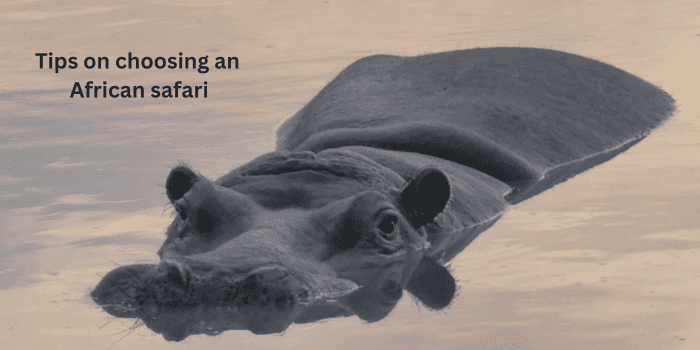
A safari is a coveted experience for many first-time visitors to Africa. It certainly was for us, so I offer the following observations and tips on choosing an African safari .
Table of Contents
Our trip: key considerations
Tip 1: choose your region, tip 2: identify the season, tip 3: establish a budget, tip 4: choose your level of independence, tip 5: choose safari dates with predicted energy levels in mind, tip 6: consider two safaris, tip 7: investigate the remoteness of the safari location, tip 8: size matters, tip 9: consider the type of safari vehicle or boat, tip 10: do your research, tip 11: find a reliable africa-based booking service.
The following describes some features of our trip, emphasizing our safari experiences.
- I was travelling with one other person, a friend of 30 years. From a financial perspective, this was an advantage, as the costs of many safari experiences are based on two people sharing accommodation.
- The strategic use of reward programs for earning and redeeming points influenced our choices. Our frequent flyer accounts had enough points to redeem for business class flights from Canada to South Africa, which meant booking the flights ourselves. We were also interested in earning points on travel purchases and later redeeming them for statement credits on the respective credit card account. This required using credit cards of our choosing. These strategies contributed to significantly reducing our total travel costs.
- Time constraints weren’t an issue. It was a long way to go, and our to-do list of sights and activities kept getting longer throughout the planning period. And a long planning period it was, thanks to the global pandemic. Also, our preferred pace of travel is such that we didn’t want to feel rushed and experience it all in a blur.
- Early in our planning, it became apparent we favoured more of an independent model where we designed our itinerary and made the bookings ourselves.
- Hoping to see a wide variety of wildlife, we booked a land-based safari in the Thornybush Game Reserve in South Africa and a water-based one in the Chobe National Park in Botswana. We expected these two experiences to be the highlights of our 46-day trip and indeed, they were.
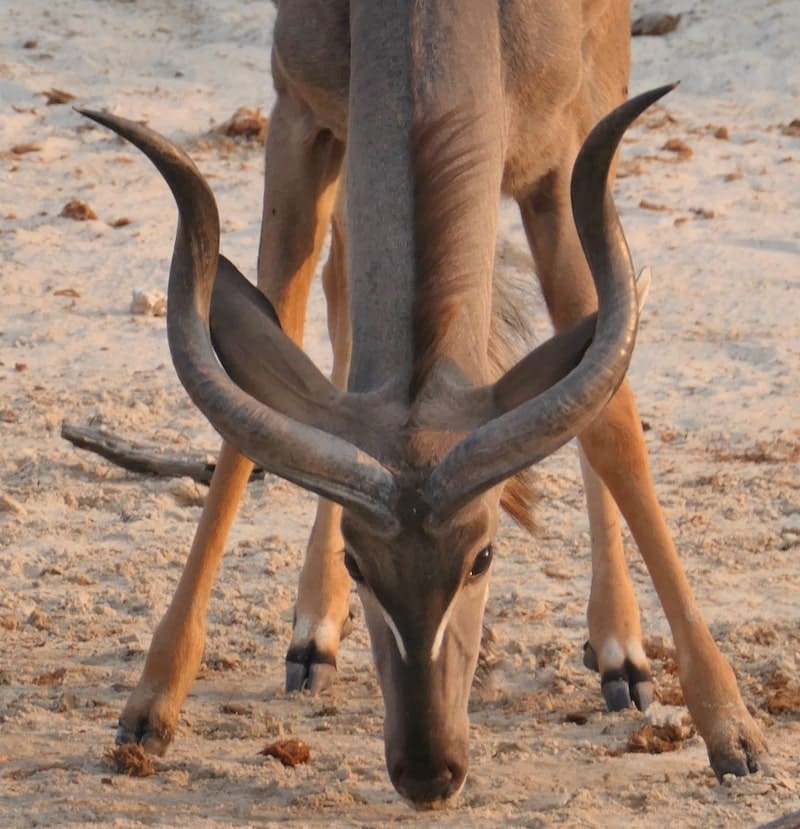
Tips on choosing an African safari
Below is a brief description of our African safari experiences and what we learned as a result, much of it framed as tips on choosing and booking an African safari.
Africa is a massive continent of 54 countries. Ten are renowned for world-class safari experiences: Botswana, Kenya, Mozambique, Namibia, Rwanda, South Africa, Tanzania, Uganda, Zambia, and Zimbabwe.
For us, wildlife viewing was a priority. We weren’t restricted to the ‘big five’ (elephant, lion, leopard, buffalo, and rhinoceros).
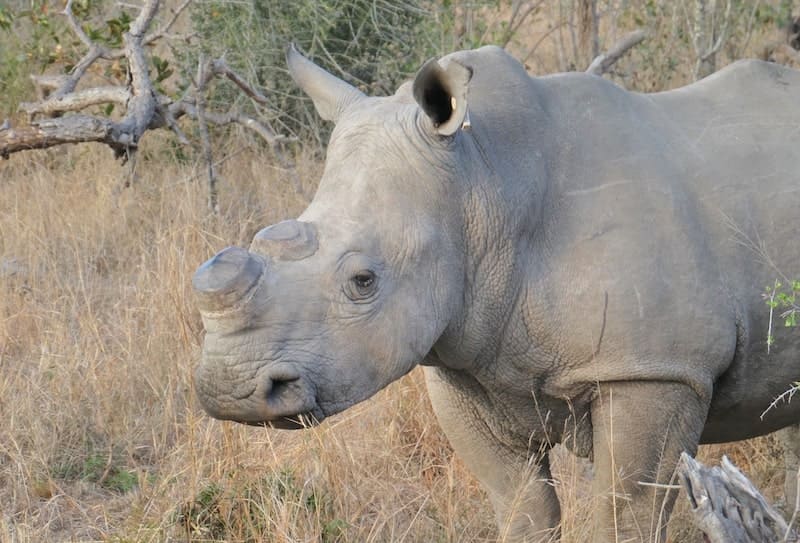
Our research on South Africa suggested we’d see the big five and a rich variety of other wildlife. In addition, we wanted to see herds of elephants crossing the Chobe River, the abundant bird life in the Chobe National Park, and many other animals such as hippopotamuses and crocodiles, that live in and beside the river.
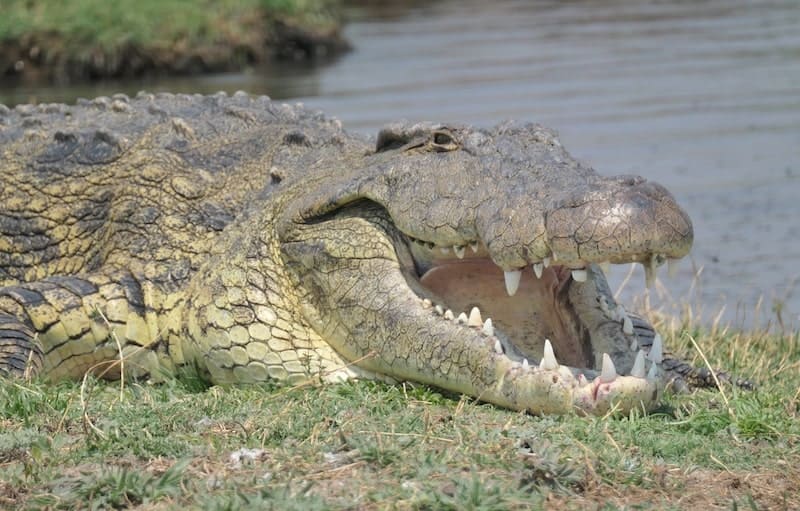
Our choice of southern Africa was influenced by our interest in seeing Victoria Falls, visiting the Apartheid Museum and Soweto in Johannesburg, and exploring Cape Town and the unique flora of the Cape. Had the Great Migration or gorilla trekking been at the top of our list, we would have looked further north to Tanzania or Rwanda. Next trip!
Once we’d chosen our region, research suggested September as an excellent month for wildlife viewing. From May to September, winter is the dry season, when wildlife gathers around permanent water sources. There’s less foliage, making animals easier to spot. Also, the temperature rises in September after the cold mid-winter months, suggesting more comfortable conditions for morning and evening drives. It’s the end of the dry season so we expected little, if any rain, and little chance of exposure to malaria. Our 46-day trip was from August 28 to October 12.
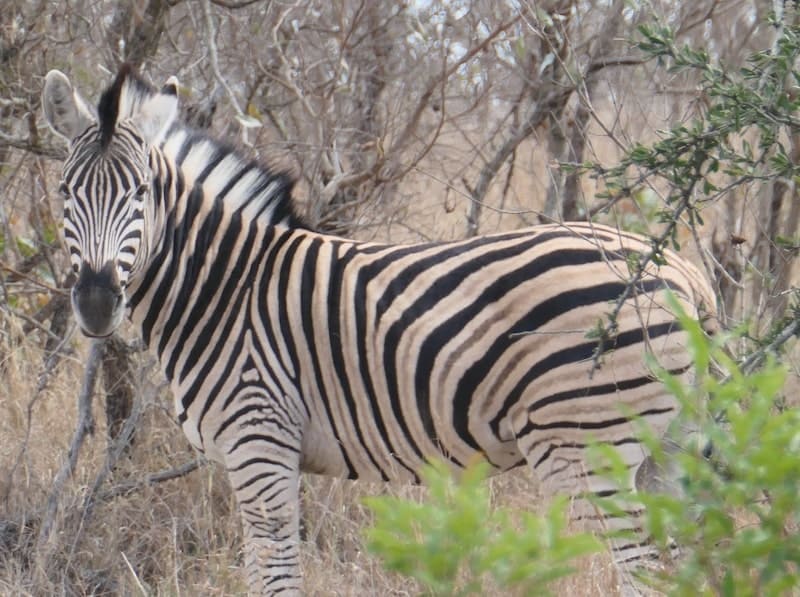
A safari is not an inexpensive experience, and the longer the safari, the higher the cost. As budget-conscious travellers, we weren’t keen on a self-drive option or tented camps, and luxury accommodation was beyond our means. We figured three nights was the sweet spot for maximizing our exposure to various wildlife. It was an excellent decision for both safaris. Every drive was different, and the delightful anticipation felt before each one was exhilarating.
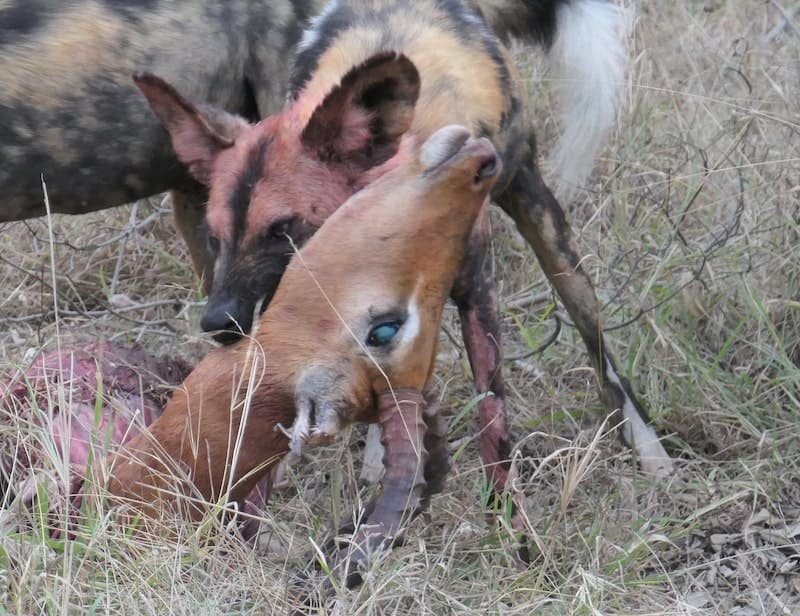
Tour packages to explore a new destination are a perfect fit for many people. The tour operator develops a detailed itinerary, takes care of the bookings, and arranges local guides. We looked at several packages but it quickly became apparent we favoured a more independent model.
Packages with multiple stops in several countries within a short period didn’t appeal to us, and those that included flights, ground transportation, accommodation, excursions, and meals were very expensive. We could do it much cheaper by designing our itinerary, travelling at our preferred pace, and making our arrangements. Besides, as much as possible, we wanted a significant portion of our travel dollars to remain in Africa, so we made a conscious choice to refrain from using a North American company’s booking or tour services.
Another factor related to trip cancellation insurance. Many tour packages involve a non-refundable deposit with the remaining balance due 60 or 90 days before tour dates. This makes trip cancellation insurance a necessity, adding to trip costs. By making refundable bookings on accommodation and various experiences, we significantly reduced the non-refundable portion of our advance bookings. Most hotel bookings were refundable if cancelled within a day of arrival.
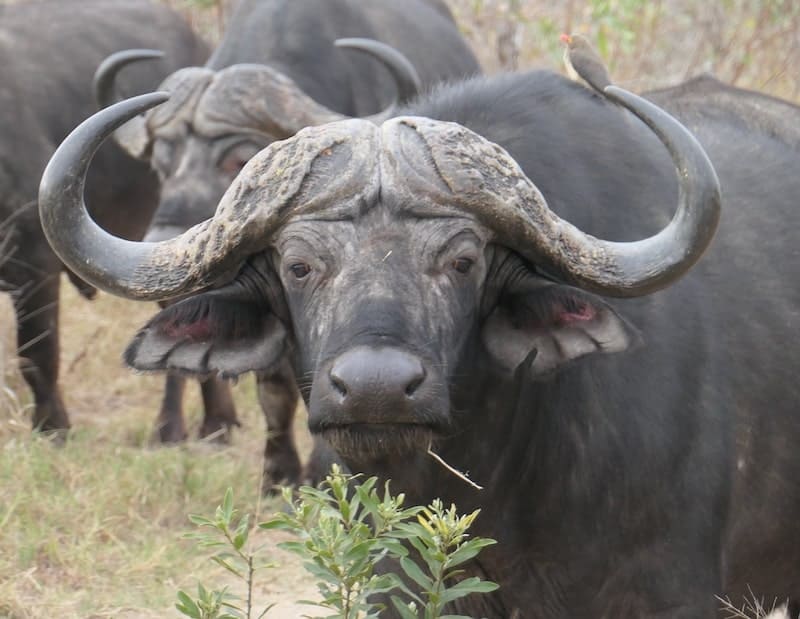
A safari can be exhausting. Our land-based safari had two game drives each day; our river safari had three. Getting up at 05:00 and spending eight hours daily in an all-terrain vehicle or small river tender contributes to fatigue. It’s not an experience to tackle after a long flight. If you’re like us, missing a drive to rest was out of the question!
Also, choose dates with downtime and other activities in between if choosing two safaris.
I loved the two-safari combination. We met folks with the time and resources to enjoy a safari in Tanzania, one in Kenya, and another in South Africa on the same trip. For us, including a land-based safari and a water-based one not too far apart geographically was one of our best decisions.
They were very different, and each complemented the other.
My first sighting of an enormous elephant crossing the track just metres from our game-drive vehicle was a sight to behold. How could such an imposing, impressive animal move so quietly through the bush?
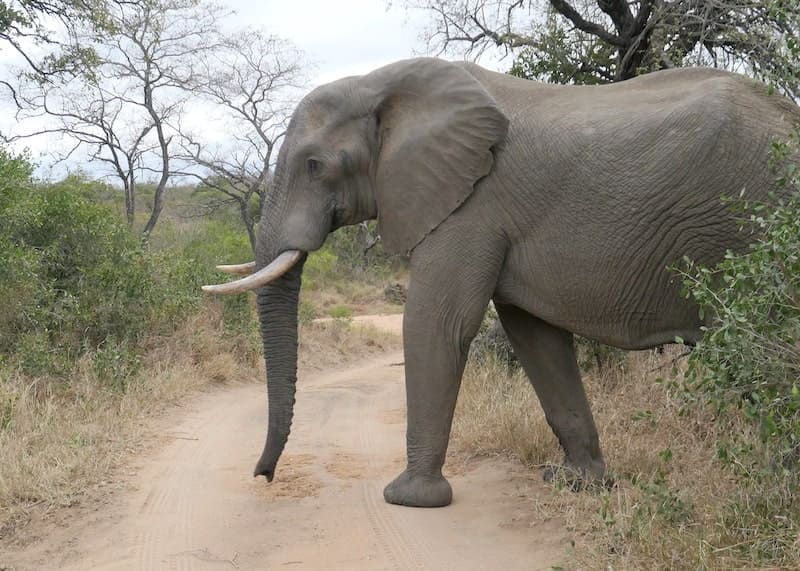
And then, in Chobe National Park, I watched elephants wallowing in a hollow of mud (that they’d created) and then spraying themselves (and us) with a mud bath using their extraordinary trunks. I’ll cherish these memories (and photographs), thanks to our decision to book two safaris.
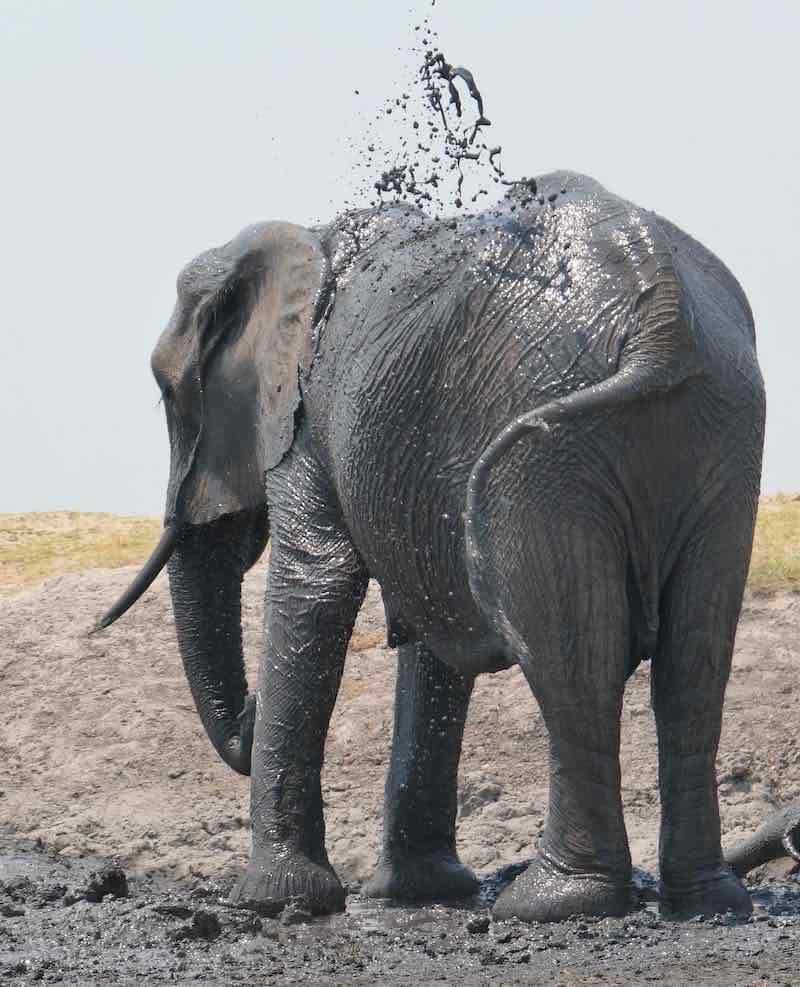
Chances are a remote location means longer travel time, higher transportation costs, and heavier reliance on a tour operator to get you there.
Both of our safaris were easy to reach. This meant flexibility regarding transportation and what we chose to see and do on the way.
Jackalberry Lodge on the Thornybush Game Reserve is a short drive from Hoedspruit, South Africa. Airlink offers a direct flight from Johannesburg to Hoedspruit, but we booked an overland shuttle with Safari Link Southern Africa , to enjoy the beautiful landscapes between the highveld and lowveld areas of South Africa. Also, we were keen to tour the Hoedspruit Endangered Species Centre which was easily incorporated. Their cheetah program is impressive.
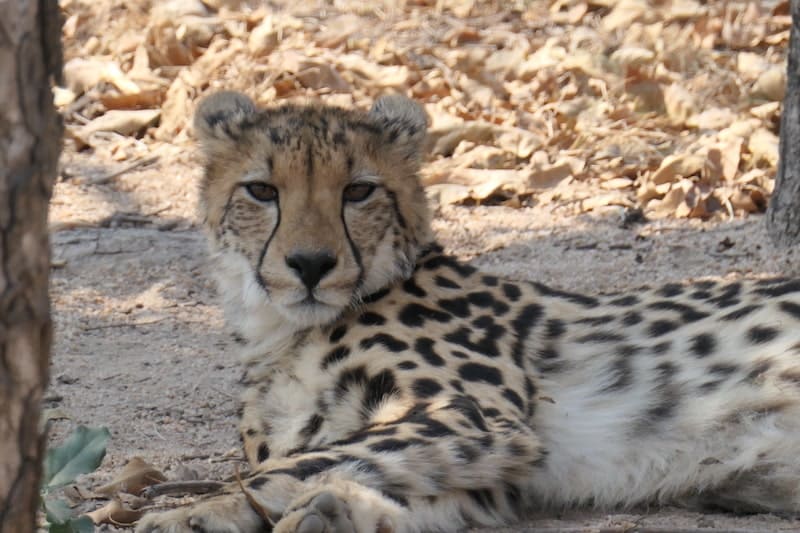
The Chobe Princess is based on the Chobe River in Kasane, Botswana. Kasane is served by the regional airline Airlink. However, we chose to stay a week in the Livingstone-Victoria Falls area and book a road transfer from Victoria Falls to Kasane, a distance of 85 kilometres (53 miles).
The size of a property influences the variety and abundance of wildlife. An area of 3,000 acres compared to one of 30,000 will affect the quality of the game-viewing experience.
Our choice of Thornybush Game Reserve was based on several factors. It’s a 15,000-hectare (37,000-acre) private reserve sharing a 22-kilometre fenceless border with Kruger National Park. Compared to smaller properties, its size and open border with Greater Kruger Park suggested rich and diverse viewing opportunities. This proved to be the case.
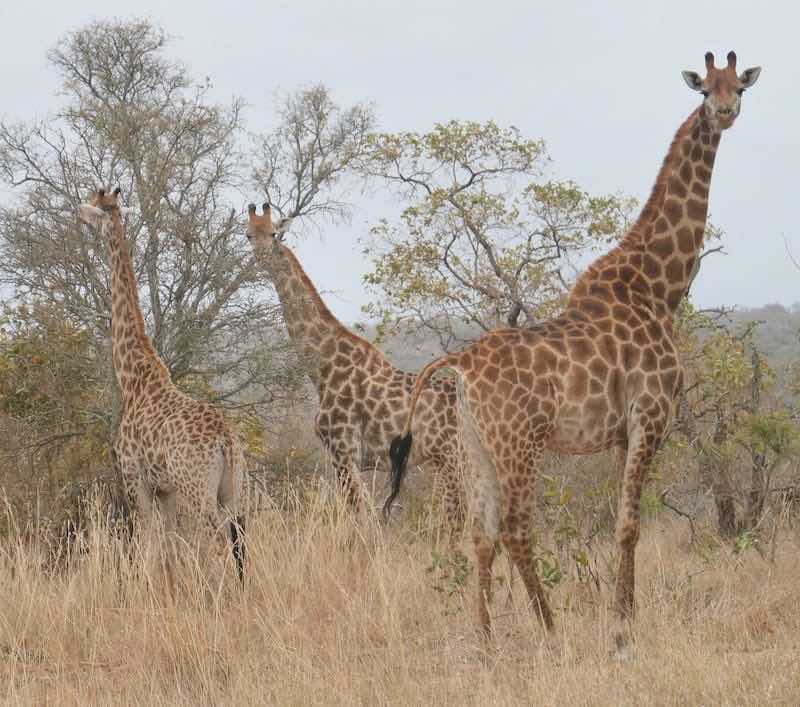
Other factors influencing our choice of Thornybush related to the game-drive vehicles.
- Their open-sided Toyota Land Cruisers feature three rows of seats at staggered heights. This helps guests feel like they’re part of the natural surroundings and closer to the animals. The tiered seats offer great views and superb opportunities to take photographs.
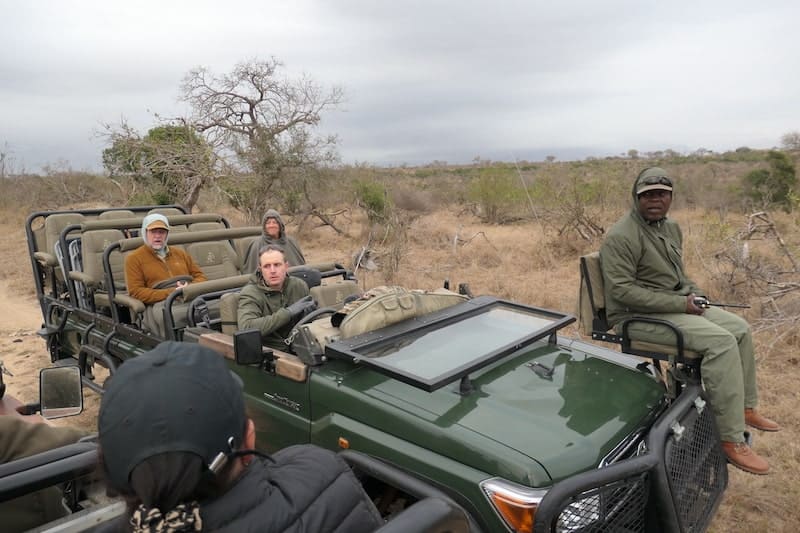
- They go off-road to cross rough terrain to pull up close to wildlife.
- Each vehicle has a bucket seat mounted on the front for a tracker to look for animal tracks and droppings. On multiple occasions, our tracker, Victor, capitalized on these clues to locate wildlife.
- In a private reserve, it’s less likely to see many vehicles vying for limited viewing space near wildlife. Most of the time, ours was the only vehicle a few metres away from a pride of resting lions or driving through an immense herd of buffalo.
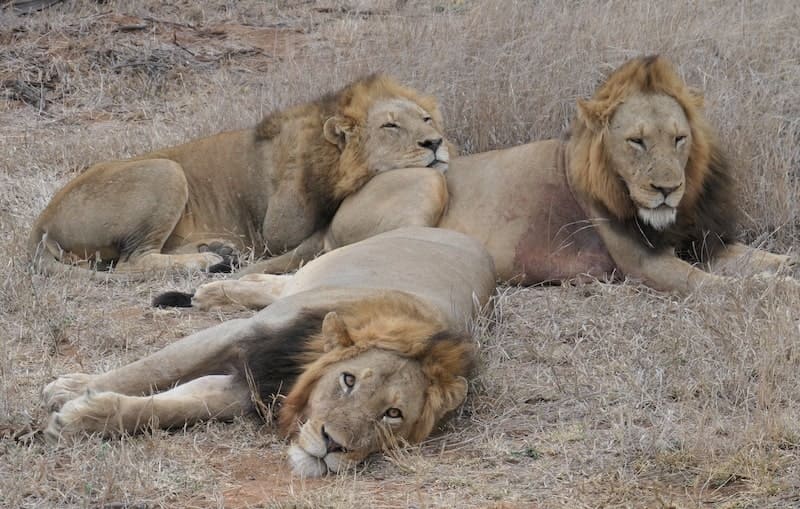
- Another advantage of a private reserve is that guides cooperate with their colleagues in other vehicles by two-way radio to share intel on the location of animals. As a result, we were occasionally joined by one or two other vehicles (at the most) that pulled up beside animals while we were there. It was common that as one vehicle arrived, another was leaving.
This contrasts with what I learned about the vehicles of a public reserve or national park. For example,
- No off-roading is permitted in Kruger National Park. Vehicles must stick to established roads.
- Vehicles must remain covered by law. While a canopy and canvas sides protect passengers from the elements, they can severely limit viewing opportunities.
- Traffic congestion at prime sightings is common, especially during the holiday periods. Guided game-drive vehicles share the public reserves and parks with self-drive ones.
- Trackers are not used in Kruger National Park, and game drives are limited to daylight hours.
Our Chobe River tender promoted an intimate viewing and learning experience. The small boat could navigate tight spots and with a maximum of eight passengers on board, we were able to ask our guide Allen questions and stay as long as necessary at viewing locations. This was a stark contrast to the large river vessels with two decks packed with tourists, presumably on a short day excursion from Victoria Falls.
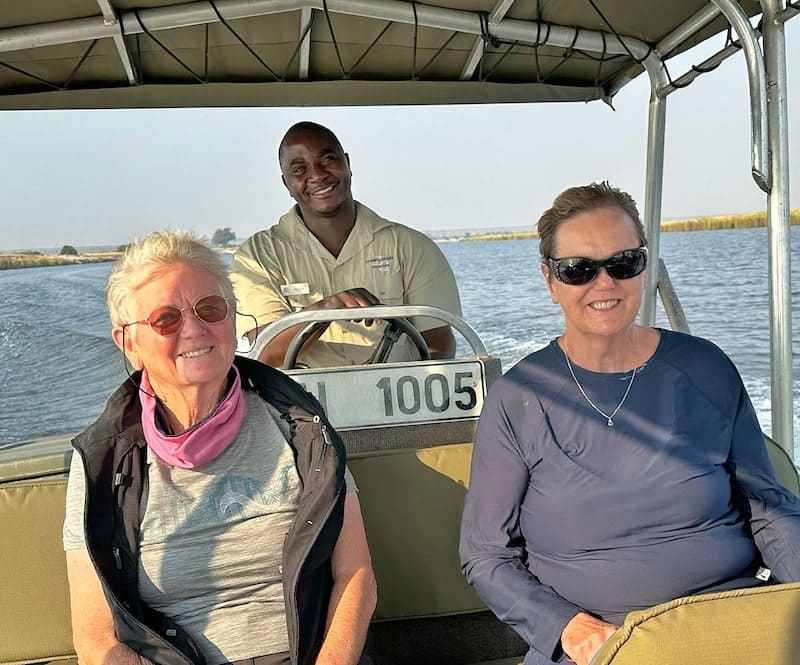
For a first-time visit, I recommend choosing a guided safari over a self-drive experience.
We were very fortunate. It was a fortuitous discovery of two sets of friends in Nova Scotia who had experienced a safari in the Thornybush Game Reserve. Corinne (who stayed at Jackalberry Lodge) lent me her photobook of fantastic wildlife photos.
Helen and Lorne, who chose the more luxurious Thornybush Game Lodge regaled us with detailed descriptions of their stay. We asked a gazillion questions, and their intel was a tremendous help. Our friends described the vehicles, showed us their photographs, and elaborated on the comprehensive knowledge and professionalism of the guides and trackers. We learned that the food and beverages were top-notch and that the company engaged staff from the local area. We liked that Thornybush has a variety of accommodations to suit all budgets, from tented camps to luxury lodges. We chose a three-night stay at Jackalberry Lodge.
(Jackalberry Lodge will be closed for renovations beginning in February 2024.)
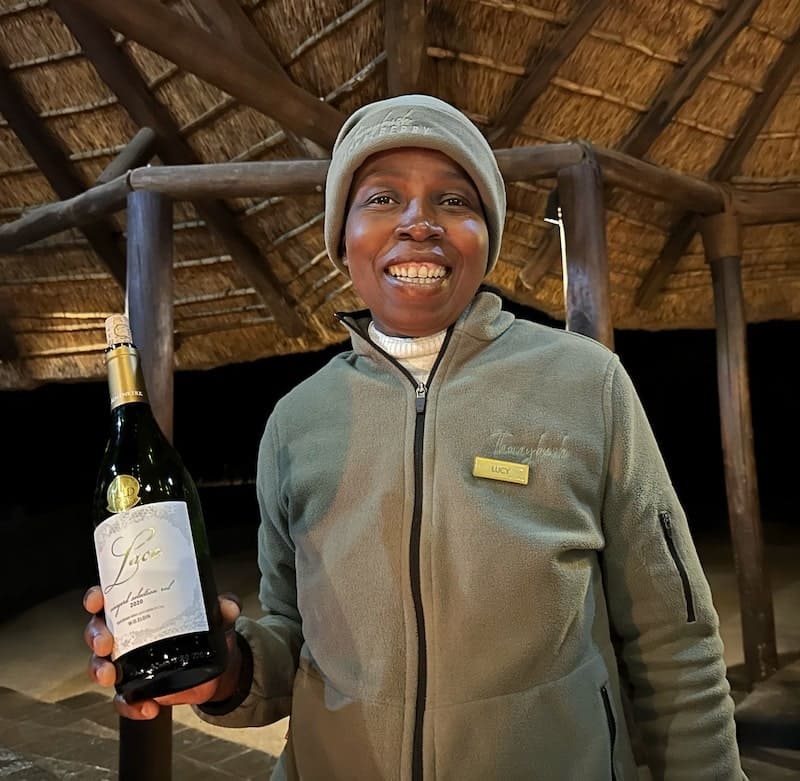
Without the recommendations of our friends, we would have been immobilized by so many choices. Otherwise, we would have contacted a few Africa-based safari specialists for suggestions and quotes based on our preferences and needs.
For our river safari, we booked three nights on an eight-passenger houseboat, the Chobe Princess II, part of the Zambezi Queen Collection . We stumbled upon this option early in our research. With the help of YouTube and many reviews, it was a straightforward decision. The houseboat changed location each evening, and there were three river drives each day in a tender with a canopy for protection from the sun.
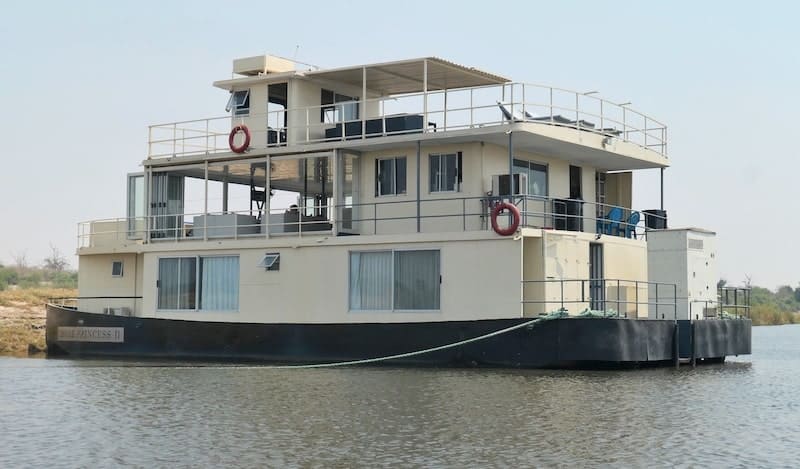
As a side note, having the Chobe Princess booking meant ignoring other cruises with an emphasis on wildlife viewing. For example, in Victoria Falls, we passed over cruises on the Zambezi River in favour of other activities.
While we preferred to manage our bookings, we appreciated access to an Africa-based booking service.
The safaris were the ‘big-ticket items’ of the trip. My friend Janet and I shared accommodation, and for reasons associated with reward programs and trip cancellation insurance, we wanted to pay separately with a credit card of our choice. When we ran into difficulties doing so, we reached out to East Cape Tours , who not only accepted separate payments on various credit cards but offered a small discount for using their services.
We received excellent service from East Cape Tours. The company was a perfect fit for complementing our independent bookings.
If you’re planning a safari in Africa, you may be interested in the post, 16 Remarkable birds in Chobe National Park in Botswana .
If you found this article helpful, please share it by selecting one or more social media buttons. Have you experienced an African safari? If so, what other tips can you offer? Please share your thoughts in the comments. Thank you.
Care to pin it for later?
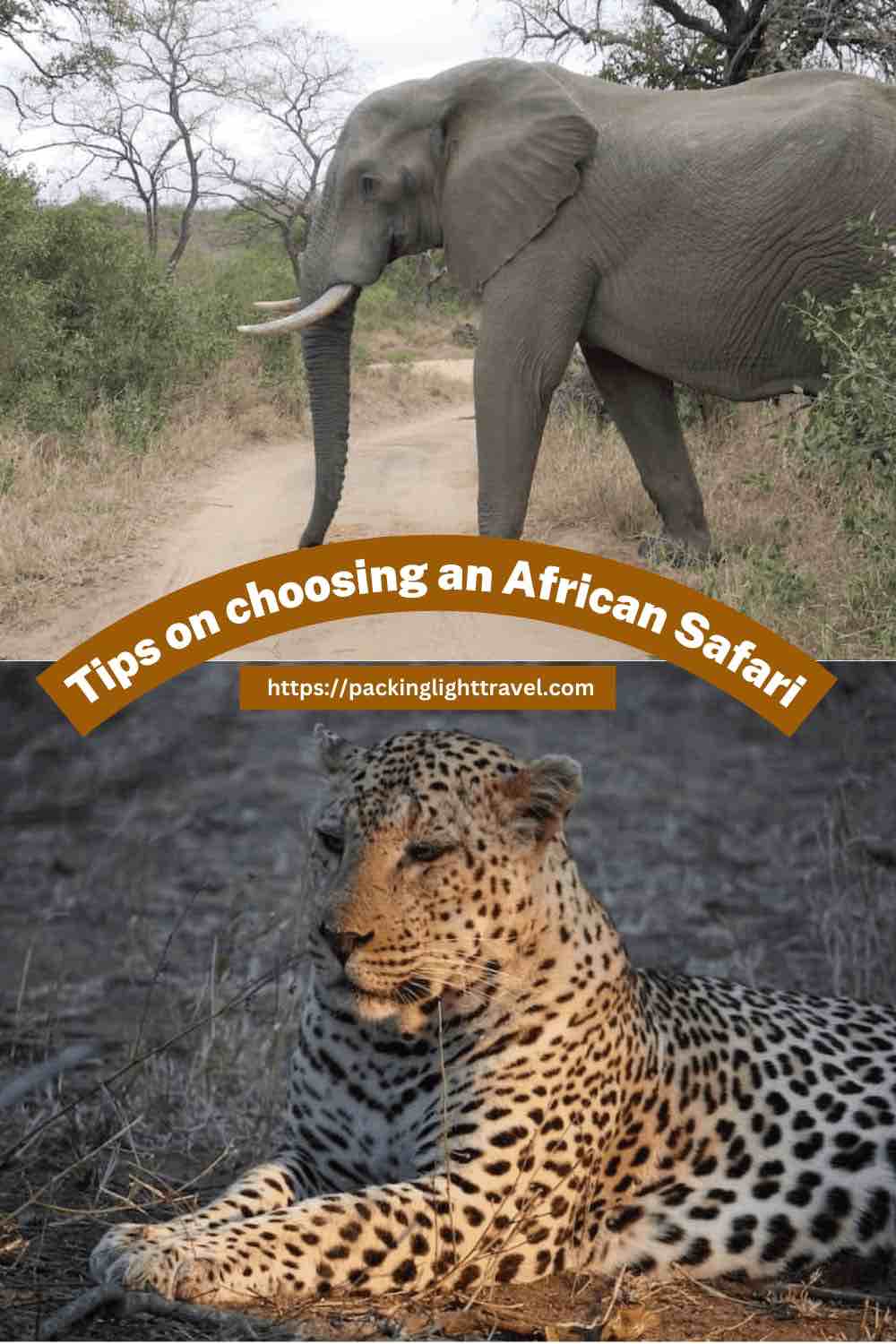
Very helpful tips! I agree with getting a guided safari for first-timers. I had my first safari experience in Udawalawe in Sri Lanka and having a guide helped me spot some animals and interesting facts about them!
All such helpful tips! I’ve never been on a safari before but I’d love to join a guided tour. It would be great getting insider tips and knowledge about animal spotting and facts about the animals. Thanks for sharing this!
Great tips! I will definitely saved this later, for when I book my next safari to Africa!
These are very helpful tips! I I went for the Maasai Mara safari in Kenya this April and I totally agree that for first-timers best to have a guided tour. My first safari experience with a guide helped me spot all the big 5 animals, and the vehicle I chose was perfect to see it all. I also agree that the season really matters if you want to see the animals before they migrate or if catching the migration is what you want. Thanks for this detailed guide.
Thanks for the useful in-depth tips for choosing a safari. I have been doing several safaris in Kenya and could relate to your experience. I have not done any water safaris yet, so it is something to consider for my future trips. Thanks for sharing!
Sharing this with my partner as we speak. A safari is definitely on our bucket list. Thanks so much for sharing your adventure, your magnificent pictures and all the great advice.
Submit a Comment Cancel reply
Your email address will not be published. Required fields are marked *
Save my name, email, and website in this browser for the next time I comment.

Search this site
Welcome to Packing Light Travel. I'm Anne, a dedicated carry-on traveller. For information on the site, please see the About page.
Book: The Ernie Diaries

Packing Light

Join the mailing list for updates, and access to the Resource Library.
You have Successfully Subscribed!
Connect on instagram, if you find this information useful, subscribe to the newsletter and free access to packing lists, checklists, and other tools in packing light travel's resource library..
Your email address will never be shared. Guaranteed.
Pin It on Pinterest
7 African Safari Tips for Planning Your Trip
Customers rate Zicasso's travel referral service 5 on a scale of 1 to 5 based on 1542 reviews on Trustpilot
We match you with top tour companies that specialize in the trip you want, whether it's a customized private tour or a group tour.
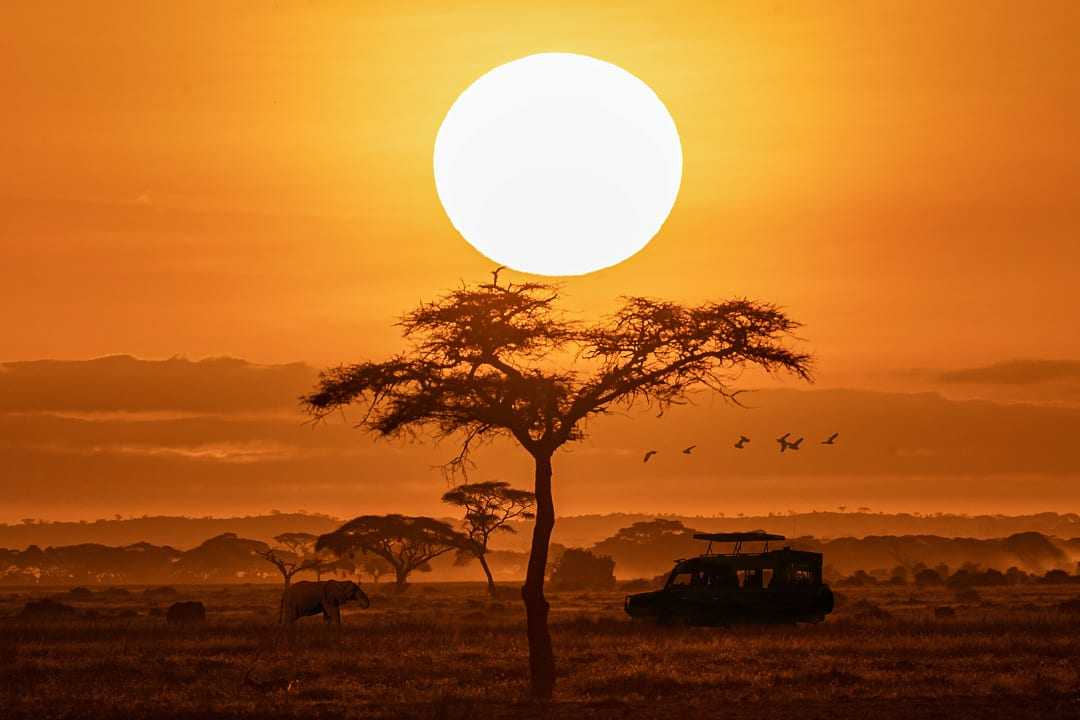
An African safari is the ultimate adventure, and as you consider your dream trip, our top African safari tips can help you personalize your experience for an unforgettable wilderness vacation.
A perfect safari conjures images of remote regions that offer intriguing and breathtaking landscapes, where classic lodges and luxury tented camps sit, isolated from the busy world. Wildlife roams from the plains to the forests, and days start early, ending with captivating sunsets. Planned with meticulous attention to detail, you can experience the best of Africa by following our top safari tips.
Every safari can be personalized to your preferences and our African safari advice can help you as you work with a specialist to customize your wildlife adventures.
1. Consider the Many Ways to Experience Your Safari
2. explore safari lodges, luxury tented camps, and more, 3. pick the best safari destination for you, 4. connect with a safari specialist to help you plan, 5. customize your safari to suit your preferences, 6. pack the right way for your safari experience, 7. immerse yourself in your dream safari adventures, plan your trip with expert african safari tips.

Walking Safari in Arusha National Park, Tanzania
A safari conjures thoughts of wide-open spaces, animals roaming freely or crouched beside a thriving waterhole, and understanding how best to explore can be overwhelming, though rewarding, as you pick your favorite safari experiences.
Overland experiences might stretch across several days and travel between camps, sites, or parks, or include a short flight between regions. Game drives can be a day's excursion as you discover the diverse terrain, from woodlands to open plains, while nighttime game drives give you an entirely different perspective of the wilderness and the wildlife that comes out after sunset. A walking safari immerses you in the finer details of tracking and exploring on a boat can offer wildlife views in and alongside the water.
Knowing what has captured your interest most is the beginning of designing your itinerary. Different destinations offer different opportunities to explore and enjoy, and knowing what is at the top of your list allows your planning to unfold.
Learn more: 10 Types of African Safaris: Different Ways to Experience a Safari
Expert Tips for Discerning Travelers

Guest tent at Nanyukie Lodge in Serengeti, Tanzania. Photo courtesy of Lemala
Options abound, and knowing what you would like to experience most will dictate your path. The next element to explore is the many options for safari properties: luxury lodges, boutique tented camps, or a grand mobile camp.
You can embark on an intimate adventure in the bush at lodges or luxury tented camps with either a handful of rooms or a more extensive selection. The properties you visit will most often exceed expectations by combining unforgettable views, exceptional services, and access to wildlife experiences you may have only dreamed of, especially on luxury Africa safaris .
Each property can help you experience the landscape and wildlife in a unique way. From countless wildlife interactions to memorable sunsets, surprising luxuries in prime wildlife locations to exclusive safari excursions, you can take full advantage of the remote sense of adventure. Custom-designed itineraries cater to your wishes and can guide you on which accommodations best capture your perfect African safari.
Learn more: 3 Types of Safari Accommodations and How to Choose

Zanzibar, Tanzania
There are many factors to consider when deciding where to go on safari and looking at the big picture you have created for your African adventure certainly helps. How you wish to experience your safari could impact your choice of destination and you can find ideas in our guide on the best countries for an African safari .
Stand-alone safaris in one game reserve or park, for example, may steer you towards a South African safari , while an experience that encompasses water and land lodges or camps would bring Botswana’s Okavango Delta to mind. If traveling in an enclosed 4x4 vehicle with a pop-up roof is more your style in a variety of parks, then an East African safari in Tanzania or Kenya is definitely for you.
Extensions, such as visiting Victoria Falls or adding a beach getaway to your trip, could also dictate where you safari. The Indian Ocean is home to a plethora of island paradises, so connecting Zanzibar with Kenya or Tanzania makes sense, while a Seychelles escape ties in well with a Southern African safari itinerary. City breaks, desert discoveries, or gorilla trekking will also determine whether you safari in Southern or East Africa.
Your Zicasso safari specialist can help you wade through the many options, as the opportunities in Africa are endless.
Learn more: How to Choose a Safari Destination for Your Trip

Maasia Mara, Kenya
The right safari is all about your preferences and needs, from relaxation to luxury, activity to excitement. Once you have some ideas about your dream trip, talk to a specialist and continue brainstorming to focus on what elements will make your ultimate travel experience come to life.
Expert advice and safari tips from an experienced travel specialist with local knowledge can inform not only where you should go, but also the excursions, inclusions, and accommodations you may wish to have.
With concierge-style planning service, a dedicated advocate for your travel plans from start to finish, and assistance on the ground as you adventure across game reserves and national parks, a safari specialist plans for every last detail so you can trust you will enjoy a unique experience.
Learn more: 5 Reasons to Plan Your Safari with a Travel Specialist

Okavango Delta, Botswana
How you want to explore, the accommodations you have dreamed of, and the country you choose will all come together with the guidance of your safari specialist to create your perfect routing, with the best inclusions.
Discover more of Africa by adding a beach or city stay before or after your safari for a more extended trip. Creating your itinerary around any time constraints, desired experiences, or nearby places you wish to visit will take expert destination knowledge and your safari specialist will work alongside you until every last detail is perfect.
Learn more: How to Plan an African Safari: Frequently Asked Questions

What to bring often gets the most questions when considering what to know before going on an African safari, beginning with clothing. It is essential to be comfortable, and as a safari experience is a low-key adventure, good walking shoes, comfortable clothing, and a good sun hat are really all that is required.
A standard rule of what to wear on a safari or game drive is to avoid bright and bold colors, forget any camouflage and focus on khakis, browns, and beiges to blend in with the natural surroundings. Layering is a great idea to stay comfortable as the temperatures shift from cool early mornings to a warmer start to the day as the sun comes up. Long pants that comfortably convert to shorts and light, long-sleeve shirts work perfectly.
Consider taking along a scarf and gloves for chilly starts and ends to your day. Forget the hiking boots and oversized jackets to safari with ease, knowing that what you have is more than enough. Blankets and ponchos are provided on your game drives and other than good sunscreen and stylish sunglasses, you are set to go out into the bush and explore. When you are in the vehicle, the animals see you as one unit, so blend in with muted tones.
Learn more: What to Bring on an African Safari

Ngorongoro Conservation Area, Tanzania
From the moment you step foot on or into your safari vehicle, your game-viewing experience begins. Most game drives take place before sunrise and just before sunset, with breaks in the drive at prime or remote spots, usually with captivating views, for coffee in the mornings and a sundowner as the day comes to a close. Savor the opportunity to stand on a hill with a beverage of choice in hand and thank Mother Nature for this incredible opportunity.
At each animal sighting, you will have your guide's full attention and can ask questions and take in his explanations and stories, while keeping an eye on the magnificent creature in front of you. Comfort is key, and small touches like blankets and sometimes personal binoculars add to the intimate experience of being on safari. Anticipation and excitement, with undertones of pure relaxation, set the mood.
Which magnificent animal will be the first you encounter today, what miracles of nature will you witness, and how many memories will you capture with your camera, your memory maker? It is truly a joy to be in the African savannah, outcrops inviting you in, waterholes taking care of all who thirst, perhaps an elusive leopard guarding its prey, barely visible under a tree.
Learn more: What to Expect From a Day on Safari

Sundowners in South Luanga National Park, Zambia
An African safari is an experience of a lifetime, an immersive adventure into the splendor of the untamed landscape, its curious wildlife accentuated by luxurious accommodations and seclusion. You have plenty of unique travel possibilities and can find inspiration for your customizable trip in our African safari tours and vacations .
You can also find tips on the best safari destinations, the best times to go on safari, and more helpful African safari advice in our African safari travel guide .
Life-Enriching Travel Designed Just for You
Trips curated by the world’s top destination experts
Concierge-level service leading up to and during your trip
Unique, exclusive experiences and insider access
Help Me Plan My Trip
Get Top Travel Specialists to Help Plan Your Trip


What to pack for Africa: The only Africa packing list you’ll need
Planning to go for an African safari? Here is the ultimate Africa packing list with everything you’ll need to have a perfect safari .
So you’ve already planned your trip to Africa or even drawn out your Africa travel Itinerary, and booked your hotel and air ticket. (If you haven’t booked your hotel yet, book it from booking.com and you can also compare prices on flights with Skyscanner or Expedia.com to get the most out of your trip).
It’s undeniable that a trip to Africa is extremely exciting. From enjoying the continent’s undiscovered secrets to getting up close with the wildlife in some of Africa’s best national parks , a trip to Africa is a dream for so many.

Disclaimer* This post contains affiliate links and I might earn a small commission if you purchase through them but with no extra cost to you. This commission helps to keep the lights on here. You can read our privacy policy for more details. Thank you for supporting the Adventurous feet
But even with that excitement, it’s not guaranteed to know what to pack for Africa especially if you’re traveling to the continent for the first time.
So in this post, I’II be giving you the complete Africa packing list with everything you’ll need to have an amazing safari.
The ultimate Africa packing list
Here is everything you need to add to your Africa packing list!
African Safari Packing list: The luggage

Before you think of what to pack for an African safari, you got to have where to pack your items. And for the case of an African safari, it’s better to use an anti-theft travel backpack instead of a suitcase.
There are a number of backpacks on the market and what you buy depends on what you need as an individual. But as a backpacker, I’d recommend buying this osprey backpack .
It is a bit pricey but has a ton of functions compared to other backpacks. It has a full opening (like that of a suitcase), it is sturdy and has compartments which will help you keep your travel items organized.
There are other types of osprey backpacks you could opt for. Below are a few.
- Osprey Atmos AG 65 for men
- The Osprey Daypack for hiking
- The Osprey Packs Renn 50 for women
You can also check out a variety of backpacks from Amazon if the suggested ones above don’t suit your needs.

Related post: Best tips for backpacking Africa
As you enjoy the amazing wildlife or roam around the famous landmarks of Africa , you’ll need to carry a few day’s essentials and that’s why you’ll need a proper daypack.
I am a huge fan of Osprey bags because of their high quality. So as you might guess, I recommend taking this Osprey day pack for your trip to Africa.

Packing cubes
Packing cubes are a game-changer when it comes to packing for Africa. They will help you stay organized and if you need something from your backpack, you won’t have to unpack everything to locate just that one pair of missing socks.
The best way to use them is to allocate say bottoms to one cube, tops to another, gadgets to another, and so on. And on top of keeping your stuff organized, packing cubes will help you pack light while traveling .
This 4 set packing cubes work really great but if you personally need more, you can grab the 5 piece packing cubes or these 6 pieces cubes.

We all know that security is paramount regardless of where you’re traveling to and a trip to Africa is no exception. Carry this small Pac safe to keep the essential in like your passport, extra money, and other valuable items you might have traveled with.
If the hotel or hostel you are sleeping in doesn’t provide a security locker, the Pacsafe comes with a wire that you can fasten around the hotel fixtures like a bed or chair, in that even if your room is broken into, your valuables will stay safe.
Although, it is unlikely that your hotel room will be broken into, be the smart tourist that takes precaution.
You can also take an anti-theft daypack to stay prone to street thefts and pickpockets while going about your sightseeing adventures.

Travel Pouch/ Passport holder
This is like a small cross bag that hangs around your neck to safely keep not only your passport but also your phone, money, credit cards, and some other small items you might want to carry everywhere you go.
This Travel neck pouch will guarantee the safety of your travel items while traveling through Africa so make sure that you add it to your backpacking Africa packing list.

Travel electronic organizer
This might not be one of the most essential things to pack for Africa but it comes in handy if you want all your gadgets to be organized in one place while on your African safari.
You actually don’t need an expensive one, this one will do the job perfectly well.

What to pack for Africa: The Gadgets
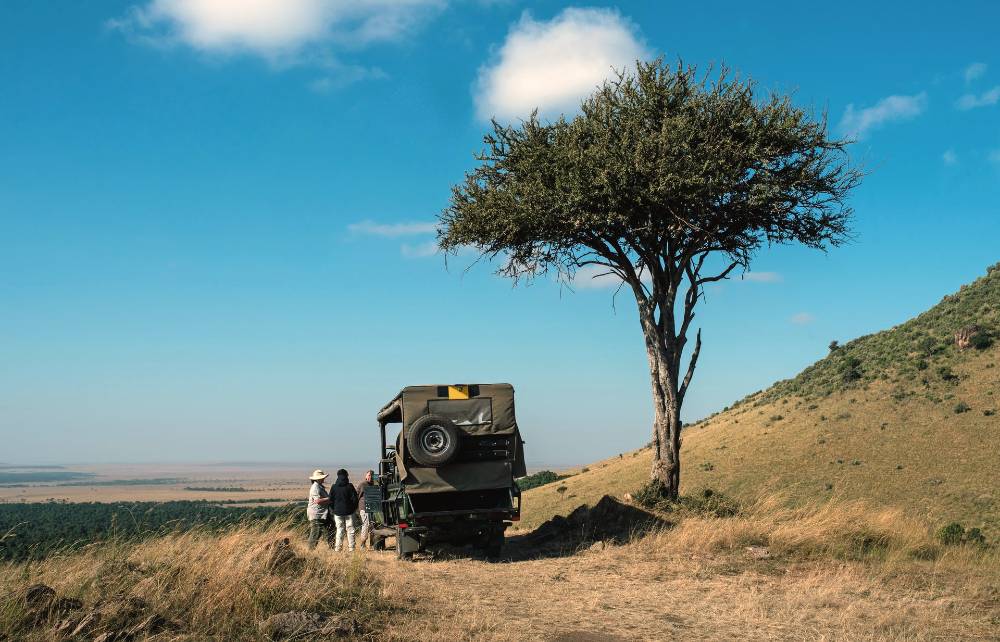
If I were you, a camera would be the first thing in my backpack. I mean with all the beauty in Africa, who would want to miss capturing all the amazing scenery and wildlife!
Yeah, I know things have changed and phones can capture nice pictures but I am talking about perfect professional photos of something you’ve never captured before. So yes, a nice camera gotta be on your Africa safari packing list.
If you don,t know which camera to buy, I wrote a complete post about the best cameras for travelers . I am sure it will help you decide on the type of camera to buy.

Extra Memory cards and batteries
Imagine the disappointment of your camera going off because it wasn’t charged fully or you can’t take more photos because your memory is full.
That can be a really heartbreaking experience if you were still enjoying the safari. So adding some extra memory cards and batteries to your African packing list will be prudent.
You can either buy this SanDisk ultra memory card or this Samsung Evo memory card to make sure that you have enough space for your wildlife photos.

A binocular is one of the most important things you should add to your Africa packing list. In fact, an African safari is not complete without them.
I am sure you’ve seen so many photos of tourists in Africa with binoculars. It is not just for style but rather to get a closer look at the beauty that reigns in Africa.
So to get a closer look at faraway animals and birds, you’ll need a pair of nice and high-quality binoculars like these ones .

Related post: Best African safari tips for first timers
Universal travel adapter
If you have been to different countries, you’ve probably realized that some countries have different kinds of sockets compared to your those in home country.
Since you are not very familiar with the African country you’re traveling to, carry this universal travel adapter as that particular country might be using a different kind of socket compared to your home country.
And it also saves you from buying a different travel adapter for each country you travel to.

I know we always want to stay connected with the rest of the world especially with our family back home.
And since power blackouts are common in some parts of Africa, carrying a Portable Power Bank like this one will help you stay connected even when the power goes off.

Solar portable charger
If you are planning to travel to one of those off the beaten paths in Africa, this #1 best seller solar portable charger on Amazon is a must-have.
For all those obvious reasons when the power goes off or when the place you’re touring strictly has no electricity, a solar portable charger will come in handy.

You don’t want to be left in total darkness when the electricity goes off especially in the night, which is highly likely in some African countries . That is why a flashlight is one of the things to add to your packing list for an African safari.
Whether you went camping or found yourself still on a hiking trail when night falls, you’ll need a good flashlight.
This Headlamp from Amazon or this one will help overcome the darkness while in Africa.

Kindle E-reader
Even though there is so much beauty to see in Africa, time will come when you just want to chill in a chair and read a good book.
However, that doesn’t mean carrying a number of heavy books. Just carry this Kindle E-reader where you’ll be able to access a number of books on the go.

Noise canceling Earphone
Every now and then, every one of us just wants their “personal” space even in the most crowded places.
The “alone” time might not mean laying on the beach barefooted but rather listening to something on your phone.
So to make sure that you do that while keeping away all the noise, grab yourself these noise-canceling earphones .
They’re also great on the plane – which is like killing 2 birds with one stone.

Africa packing list: The safety items
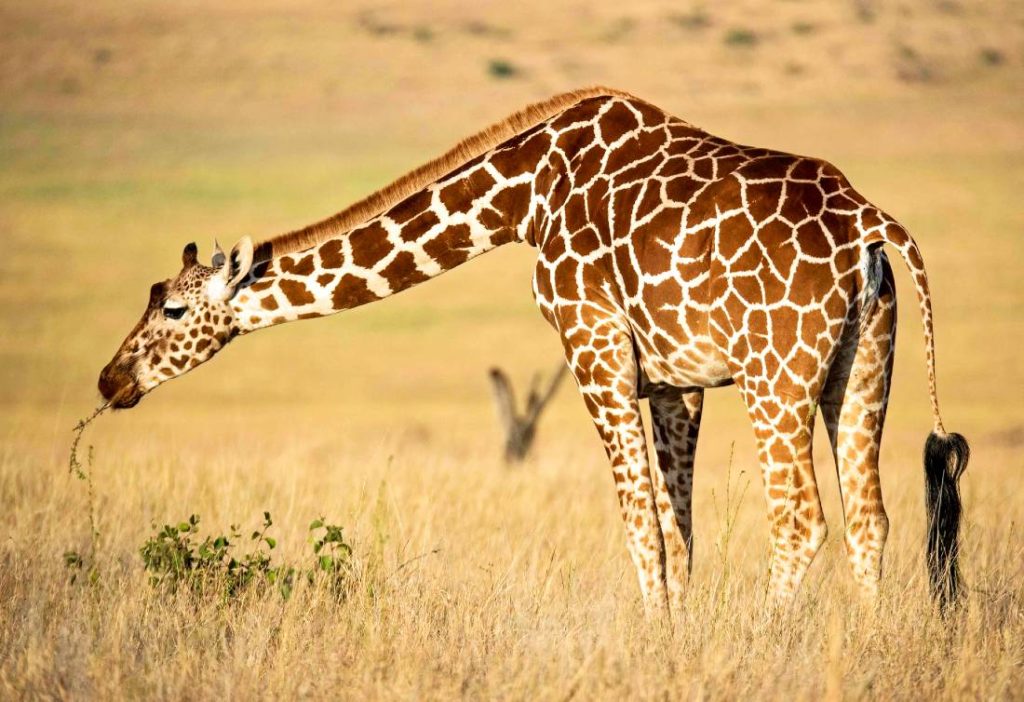
Travel Insurance.
If you are traveling to East African countries, getting medication from public or private hospitals can be easy and relatively cheap for minor issues.
But imagine, God, forbid something big were to happen to you in a very remote area and you have to be rushed to an expensive hospital, you would end up falling in high debt.
This makes travel insurance very essential and I highly recommend World Nomads since you can buy or renew your coverage online. And the biggest plus is that it is accessible in over 160 countries.
First Aid Kit
Accidents are inevitable while traveling to Africa or even any other part of the world. Though we can’t control them sometimes, it’s better to be prepared for such cases and that’s why you should add a first aid kit to the list of things to pack for Africa.
Your First Aid Kit should at least have painkillers, plasters, malaria tablets, vitamins, and other medicines that you might need on your travels.
This first aid kit has all the things mentioned above and it is small enough to fit in any kind of backpack.

TSA Approved locks
On your trip to Africa, don’t forget to pack a lock to safely keep your property.
And to be able to pass through airport security, make sure that you buy one that is TSA Approved. This TSA Approved lock will be great for Africa.

Personal Travel Water filter
Even up to now, clean water might be a luxury in some parts of Africa. Even though there is still a controversy among some people whether the travel water filters are 100% effective in killing germs from the water or not, it is still better to carry one for just those really remote areas where the word ”clean water” sounds far-fetched.
Pro tip* It is not safe to drink water directly from the tap in Africa like it is in Europe or America, so this travel water filter will be very efficient when hiking or backpacking through Africa.

Mosquito repellent
Oh yeah, we have many of those guys “mosquitos” in Africa, or at least in many African countries.
They say that prevention is better than cure, so carry this Insect repellent not to catch malaria.
Note* Most hotels provide mosquito nets but it’s better to be safe than sorry.

Things to bring to Africa: Other essentials
Camping tent.
There are no better camping sites in the world than in Africa. You would definitely want to experience camping on this great continent. Aside from having a camping experience, a tent can be very useful if you are traveling on a budget .
In countries like Botswana , hotels can be really expensive but if you have your own tent, you can pay a few dollars to camp in the hotel gardens. If you don’t have a camping tent already, you can buy this one as it is waterproof, and lightweight which means you can carry it wherever you go.

Smartphone waterproof case.
Africa is not only safaris and wildlife but also beautiful beaches. So if you want to get that African perfect picture in the water, a smartphone waterproof case would be very useful.
Laundry bag.
Let’s face it, most of the hotels/ hostels you’re going to stay at are likely not to have a washer and dryer. And who wants to mix clean clothes with dirty ones? So pack your small laundry bag while you head out to Africa.
Micro Fiber Towel

The best towel to travel with to Africa is an OGI MiBcrofiber Travel Sports Towel. It is small to easily fit in your safari backpack, dries quickly, and is also antibacterial.

I am sure you might be knowing this but I will say it again. Carry your Sun Bum Original Moisturizing Sunscreen Lotion . The weather and the sun are all fun and cool until your skin starts to react. And if you are traveling to countries like Egypt, sunscreen is a must-have.
After a long safari in the heat of the day, or after taking a really long city walk, you might find your feet really dry or even cracked and that’s where the O’Keeffe’s Healthy Feet Foot Cream will come into play to do wonders for you.
Toiletries.
This might seem so obvious, but since you have to make a checklist, I had to add it to the packing list for Africa.
- Toothbrush and toothpaste
- Facial wipes
So now that you know all of the essential items that should be on your packing list for Africa, you might be wondering what the best African safari outfits are.
What to wear on an African safari| Safari outfit
The safari clothing differs from country to country though most of them have things in common. So let’s look at what clothes should be in your safari luggage.
Pro tip * Since most of the hotels or hostels you are going stay at won’t have washing machines, you might want to pack clothes that you can easily wash on your own.
Safari clothes for men.
- Pack some jeans and T-shirts or a safari shirt. The number depends on the days your trip will be.
- Since it gets really hot in some places, you might want to pack some shorts.
- Don’t forget your safari shoes. These might be your normal sports shoes or jungle shoes. They all work perfectly
- Hat- Who wouldn’t want to rock an African safari with a hat?
- Jackets- For when it gets cold at night.
- Lightweight clothes like vests

safari outfits for women.
There are no designated clothes to wear on an African safari but I suggest you wear something you can be completely comfortable in as long as it’s decent.
- safari dresses
- tops or t-shirts
- safari shoes – sneakers or boots
- swimming costumes to hit the beach.
- sunglasses. – The sun can be really intense and you don’t want to punish your eyes.
- Hat- protect your head from the scorching by adding a hat to your packing list for Africa.
What not to pack for an African safari?
Don’t carry all your valuables to africa..
Just pack only those valuable items that are essential to your trip. There is always some kind of theft in some parts of Africa, so if you scream rich, you are attracting thieves.
Don’t carry too much luggage.
Though some tourists from Europe and other parts of the world think that Africa is like one of those places in the middle of nowhere, that is a myth. You don’t need to literally pack your entire house in a suitcase. You can always purchase some items from Africa.
Don’t carry a lot of cash on you.
You don’t want to risk being mugged and left with nothing. Just carry a reasonable amount of cash and a Visa or Credit card. There are so many ATM machines spread around in almost all African countries that you can easily access your money.
Ladies, don’t pack high heels.
By all means, high-heeled shoes gotta stay at home. They shouldn’t take up any space in your safari backpack.
Have you been to Africa? Tell me what you think of this packing list for Africa. What would you add or remove? Share with me in the comments section.
Do you want to learn more about Africa before you get there, read these books to get more inspiration
Related posts:
- things to know before traveling to Uganda
- African experiences to add to your bucket list
- Best places to visit in Cairo
- Safest countries to visit in Africa
Similar Posts

10 Best African Countries to visit for an ultimate African safari
Wondering where to go in Africa? Here are the best African countries to visit for the best wildlife encounters in Africa. Africa is the 2nd largest continent in the world with a vast number of cultures. It is a continent with so much diversity that can never be overlooked — from tribes, and languages to…

Top tips on how to visit the Giza pyramids in Cairo,Egypt
How to have the best trip to the giza pyramids, tips that will help you not be cheated,how to get there, what to do inside the pyramids and all the frequently asked questions about the giza pyramids.

Cairo day tours: what to do in Cairo in 2 days
So you’ve arrived in Cairo but realize that you only have 2 days to enjoy some of the best places in Cairo. You wonder how you’re going to enjoy all the Cairo day tours in just 2 days. With a bit of planning and following this extensive 2 days Cairo itinerary, you’ll be able to…

Egypt travel tips: 16 Mistakes to avoid when planning a trip to Egypt
Planning to travel to Egypt soon? Here are the Egypt travel tips plus all the mistakes to avoid while planning a trip to Egypt. Egypt is undeniably one of the best countries to visit in Africa. In fact, in most cases, it is the first country in Africa that African first time travelers start with….

10 Best National Parks in Africa you need to visit
Want to go for the best safaris in Africa? Here are the best national parks in Africa to consider for the greatest encounters with wildlife. Africa is not only a continent blessed with amazing and diverse people but also with the most amazing wildlife in the entire world. It is not surprising that a number…

The ultimate guide to climbing Mount Elgon in Uganda
Planning to hike Mt. Elgon in Uganda? Here is the complete guide to climbing Mount Elgon with everything you’ll need to know before you go. Yay, I finally climbed Mount Elgon. Climbing a mountain was on my bucket list and when the opportunity of climbing Mount Elgon presented itself, I grabbed it with both hands….
25 Comments
I always store my valuables and cash in different places. On my person, in my handbag and deep in my backpack. So far I have been lucky and nothing has been stolen. But I imagine even if someone took some part of my luggage I would still have a credit card and some cash in a different place. Great packing list by the way.
You have smart packing tips Lena! There is definitely no way anyone could take all your money at once and it’s good to know you’ve never be robbed, i hope it stays that way!!
Very useful list of accessories needed for an African experience. Especially water filler and solar chargers must be very useful. Thanks for sharing.
Africa is one of those places where you really need to be prepared, so it’s good to have such a comprehensive packing list before you leave. Thanks for sharing.
Well, that’s quite a list you got there, and probably some folks wouldn’t have thought about half of it. As someone not relying on electronics, a nice paper guidebook always comes in handy.
This is certainly a useful shopping list for anyone joining a safari. What is your experience with these water filters? I never really trust them and do buy bottled water – which, of course, is not good for the environment. And is there really someone packing high heels for a safari?!
Hhaha just a pro tip for people who are addicted to carrying heels every where. The good quality water filters actually work.
Really comprehensive suggestions. I also recently started using SPF chapstick and they have been pretty great for the outdoors too! Camping tents, do you think they can be rented from the major cities for those who dont have one?
Yes, they can be rented, mostly at hotels that provide camping sites.
I haven’t been to any African country yet, but this seems to be quite a comprehensive list of suggestions! I didn’t even know you can bring your own tent to sleep in a safari – is it safe or are there specific places to do that? (in terms of animals, not humans)
It is safe to camp in Africa since there are normally designated areas for camping. And in some instances, you can talk with the hotel management and be allowed to camp in their hotel gardens.
Great list although I pack most of this stuff except the camping gear when I travel normally! LOL! Binoculars, that is one thing I wouldn’t have thought of brining so that’s such a useful tip. Camera wise, we always bring everything and this is no exception although I’d probably try and hire a super zoom lens just for the trip.
Thanks for that tip about the super zoom lens, Amy
Very extensive and complete list of items needed. Going to Africa and on safari is on our bucket list- high up there. Glad I read this article and will keep it for when I need to pack up!
I am glad you found the list comprehensive . I hope you have an amazing safari when you decide to travel to Africa
Great List, didn’t realize I need these things if I’m going to Safari. Binoculars is a must, cause I usually just have my bag and cam, but not sure if I have a heart to camp though haha.
Haha camping is fun but can be a bit scary the first time. And yes binoculars are super important on an African safari
This is a great list, and all of these items are very useful on a safari. The safari backpack is a clever idea. I travel with backpacks, depending on the location, and the ones you recommend have really cool features and pockets.
Thank you, i am glad you like my recommendations. A back back is ideal if you plan to move around often rather than staying in one place
The one about heels reminds me how sometimes when I’m waiting to go through airport security, I see a lot of women in heels. Why??? I rarely wear them anymore, just for special occasions in my everyday life, let alone while travelling! Seriously, you should see my mum’s feet after she’d been wearing heels for 20 years.
Hahaha i can imagine the way they be struggling with heels!!
My problem would be over-packing! I wonder if I ever will grow out of it. But I guess if I bought a backpack I could only fill it.
I also had the issue of over packing, but i am slowly learning to just pack the essentials.
Incredibly thorough packing list! I love that you have to say to leave the high heels home! Gosh I would hope no one brought their high heels on an African safari!
Yeah, that would be the craziest thing to carry on an African safari!
Leave a Reply Cancel reply
Your email address will not be published. Required fields are marked *
The Ultimate Packing List for Your African Safari
:max_bytes(150000):strip_icc():format(webp)/anoukmarrakech-56a373305f9b58b7d0d20299.jpg)
Packing for an African safari is somewhat different to most other trips you'll take. Navigating rural roads in an open-top jeep means that you'll get covered in dust, so you'll need clothes that hide dirt well. Because temperatures can change dramatically throughout the day, layers are essential (after all, pre-dawn game drives are often chilly even in the height of summer). If your itinerary includes flights in a bush plane between different parks or camps, you'll need to pack extra light to comply with charter flight baggage restrictions.
In this article, we provide a comprehensive packing list that should cover most 7-10 day safaris (while still leaving room in your suitcase for a few curios ).
Dressing for Your Safari
Safaris are generally casual affairs, so you can leave your evening-wear at home. The best clothes are loose-fitting and lightweight, so that they keep you cool and dry quickly if you get caught in a rain shower. Make sure to bring at least one good fleece or jacket for warding off the chill on early morning game drives. At night, there will usually be a campfire to keep you warm, but you'll want to wear long sleeves and trousers to protect yourself from mosquitoes . This is particularly important in malarial areas.
When it comes to colors, pick neutral tones over brighter shades for optimum camouflage in the bush. Khaki is a safari favorite for a reason: it's cool, camouflaged and hides dirt well. If you're in tsetse fly country, avoid wearing blue – it's an attractant for the disease-carrying insects.
Clothes and Accessories
- 2 long-sleeve shirts
- 1 sweatshirt or fleece
- 1 lightweight raincoat
- 1 pair of comfortable shorts
- 2 pairs of cotton trousers/pants
- 3 pairs of socks
- 4 pairs of underwear (cotton, so that you can easily wash and dry them overnight)
- 1 pair of sunglasses (preferably with UV protection)
- 1 warm woollen hat
- 1 swimsuit
- 1 pair of lightweight, durable walking shoes or hiking boots
- 1 pair of flip-flops or sandals (for wearing around camp)
- A supply of Ziploc bags to keep your dirty laundry separate from your clean clothes
Top Tip: Ladies, on the bumpy roads of Africa, a decent sports bra is your best friend.
Toiletries and First Aid
Every camp or lodge will have at least a basic first aid kit , and most safari vehicles will too (especially those operated by higher-end camps). However, it's always a good idea to bring your own small supply of hygiene and health essentials.
- Personal toiletries, including travel size shampoo, conditioner, soap, deodorant, moisturizer, toothpaste and toothbrush
- Sunscreen (minimum SPF 30+)
- After-sun cream
- Antiseptic gel (for washing your hands when there's no water around)
- Sanitary products for ladies
- Contraceptives (including a supply of the pill, if you're on it)
- Mosquito repellant (the most effective includes DEET)
- Malaria pills (if needed)
- Antihistamines for bug bites and allergic reactions
- Painkillers, e.g. aspirin or Tylenol
- Cold and flu medicines
- Diarrhea medication, e.g. loperamide
- Antiseptic cream
- Prescription medicines
- A spare pair of glasses for those that wear contact lenses (it's often too dusty to wear them comfortably)
Electronic Devices
- Camera (this can be a basic point-and-shoot or an SLR with detachable lenses and a tripod, depending on how serious a photographer you are)
- Spare memory cards
- Spare camera battery (consider a solar charger if you're going to be camping)
- Binoculars (if you have them, otherwise your safari guide will likely have a pair you can borrow)
- Spare AA and AAA batteries
- Electrical adaptor
- Small flashlight (to use inside your tent or to find your way around camp at night)
- iPad or tablet for storing e-books, photos and handy travel apps
Pack For a Purpose
Many safari camps and lodges now support local community initiatives in and around the wildlife parks, reserves and concession areas. If you want to make a positive difference during your time away, ask if you can bring any supplies that will help these projects (usually school supplies, medication or clothing). Check out Pack For a Purpose for lists of specific requests from lodges around Africa as well as suggestions on how best to pack the items they need.
Before you start packing, make sure to research your options carefully. If there are two parts to your trip, you may be able to pack a separate duffel or backpack for the safari section and leave your main suitcase with your tour operator or hotel back at base. This keeps things light for your bush flight to Ngorongoro Crater , for example, while still allowing you to pack your scuba gear for your second week on the beach in Zanzibar .
You should also try to find out ahead of time whether your safari camp or lodge offers a laundry service. If not, you can recycle clothes by packing a small bottle of travel detergent and a length of thin nylon rope to serve as a makeshift laundry line.
When choosing your suitcase, a soft-sided duffel is almost always a better bet than a rigid hardshell case. Duffels are easier to fit into narrow overhead compartments or into the back of a safari vehicle – and they're more likely to withstand the wear and tear of life in the bush. Because poverty and corruption lead to theft at many third world airports , we recommend plastic wrapping your bags before your flights and investing in a decent luggage lock. Always pack your valuables (and especially your camera with all your precious memories) in your hand luggage.
This article was updated by Jessica Macdonald on March 20 2019.
Essential Items to Take on an African Safari
Everything You Should Pack for a Hiking Trip
The 11 Best Hardside Luggage Bags of 2024, Tested and Reviewed
The 9 Best Rolling Duffels of 2024, Tested and Reviewed
The 14 Best Survival Kits of 2024
The 8 Best Bags and Backpacks for Disney of 2024, Tested and Reviewed
Vacation Packing Checklist for France
How to Go on Safari in Tanzania
The 9 Best Carry-on Luggage for Men of 2024, Tested and Reviewed
The Best Women’s Travel Pants of 2024, Tested and Reviewed
The Ultimate Carry-On Packing List
The 9 Best Fanny Packs of 2024, Tested and Reviewed
The 9 Best Packing Cubes of 2024, Tested and Reviewed
Where to Go in 2021: 10 Future Trips You Can Start Planning Now
The 12 Best Beach Bags of 2024
5 Ways to Make a Luxury African Safari More Affordable
8 essential tips for an unforgettable African safari
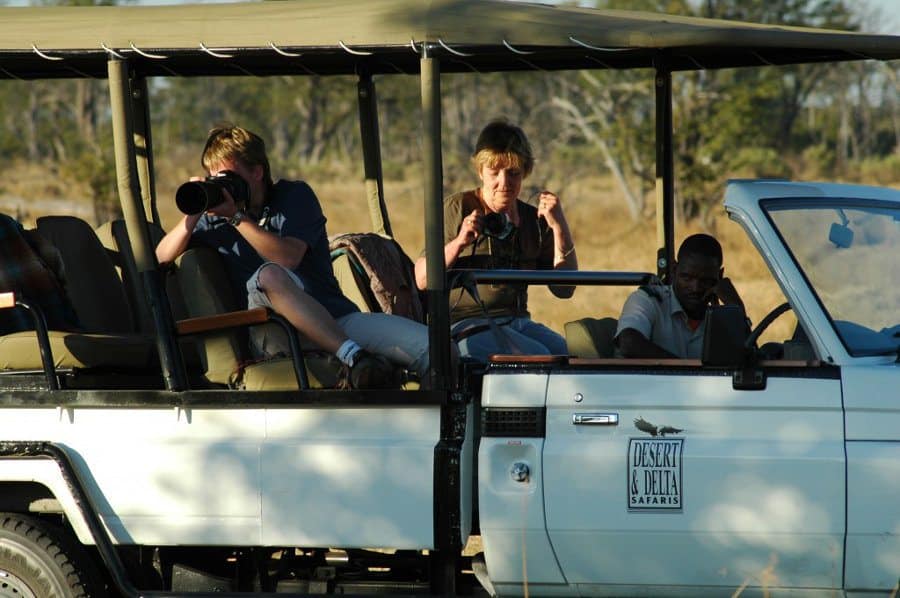
African safaris are a great way to disconnect from the rest of the world. They take you away from work and responsibilities. They take you away from time. They immerse you in a new realm and a rhythm that’s defined by nature.
By reading these tips it seems that you’re planning to make this dream a reality. You’re taking your suitcase, sunglasses, and binoculars to explore some of Africa’s best safari destinations.
GREAT IDEA!
Believe me, you have made the right choice. I’ve been going on safari for decades and I still can’t get enough of it . If you’re looking for unforgettable moments and a unique adventure, well, the answer is awaiting you in Africa.
Going on an African safari is an enriching experience . All at once it’s an idyllic experience marked by seclusion and serenity.
You will relax, completely.
It’s also the complete adventure, continually marked with surprise and unforgettable journeys. Then there’s the connection to nature and the wild that is forever inspiring.
Before embarking on your trip and getting deep into Africa, here are some essential tips and tricks to consider .
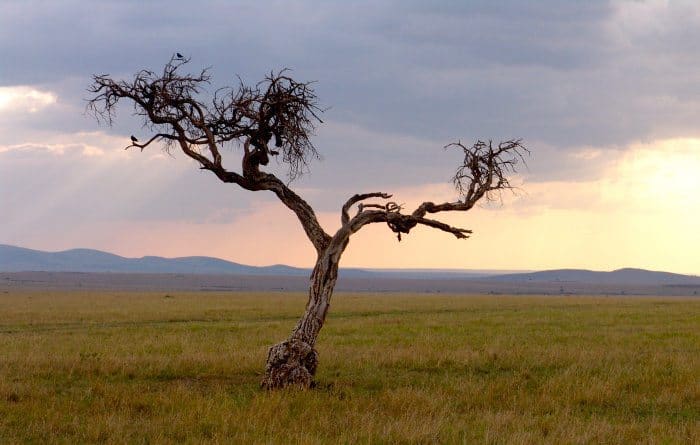
What is it that you are truly looking for in Africa? Are you an “animal freak” (just like me), or do you see yourself as a bird enthusiast ? Is your idea of safari hanging in a swimming pool and watching elephants? Or spending 12 hours bumping around the bush looking for lions?
Or perhaps all of the above? Before going further you need to define the purpose of your holiday.
Is it to discover what Mother Nature has to offer, or relaxing in a private hot tub overlooking the plains? Or, would you simply like to go on a sundowner cruise on Lake Kariba ?
Be specific and determine what you’re looking for. There are plenty of specialist safaris out there and more than enough diversity to satisfy everyone’s interests.
Once your desires are clear, you can start looking at selecting the right destination . Not everywhere in Africa is the same. Indeed, various destinations will have different facilities and things to do.
Some may not have an abundance of wildlife. But they might have other advantages, such as a stunning location, walking trails, and exciting activities not found elsewhere.
In other words, do your homework , pack up your bags, and get ready for the experience.
What are you waiting for? It’s time to go on a safari.
2. Destination
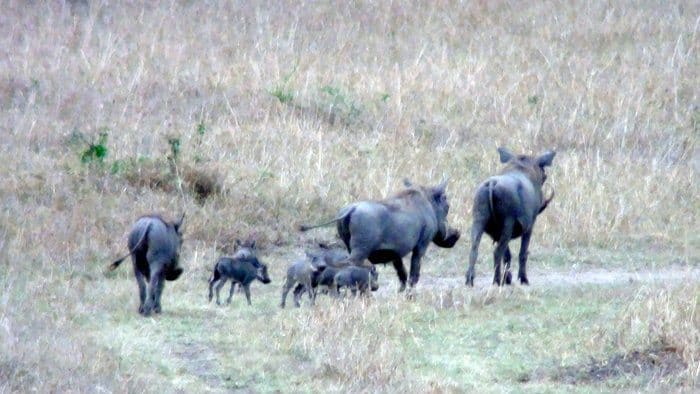
Africa is a huge continent with an infinite amount of choice when it comes to safari destinations. While it is true that Western Africa has some options available, the regions I’m most familiar with are Eastern and Southern Africa . These two are the ones that are most renowned for abundant wildlife .
They are a paradise for adventurers, an outdoor heaven, and perhaps the most extraordinary places on Earth!
If you are in love with the idea of safari and the savannah , I highly recommend that you visit these countries:
- South Africa
My top 3? If I had to choose, Tanzania would be first, followed closely by Botswana and Kenya .
3. Best time to visit

The best time of the year for safaris is during the dry season . Indeed, in the rainy season, water and food are plentiful. Animals tend to be more dispersed throughout the parks and game reserves.
Also, grass is much longer in some areas, making it more difficult to spot the wildlife. So not only does wildlife travel far and wide, it has many more places to hide.
In contrast, animals must congregate around the permanent water holes during the dry season. So in these months it’s easy to find an abundance of wildlife.
For East African countries such as Kenya and Tanzania, ideal times for game viewing include the periods of December to March , and from June to late September/early October .
It is especially during the latest months of the year that one can experience the Great Annual Wildebeest Migration –where almost two million animals gather and move together across the plains of the Serengeti and Maasai Mara National Parks!
I’ve had the chance to witness this spectacle: it’s absolutely breathtaking. Truly a once in a lifetime experience.
In Southern Africa , the most suitable times to visit are during the winter months from May to August , and the hot spring months in September and October . Temperatures are usually mild during the day, while a little cooler on early mornings and in the late afternoon.
4. Travel documents
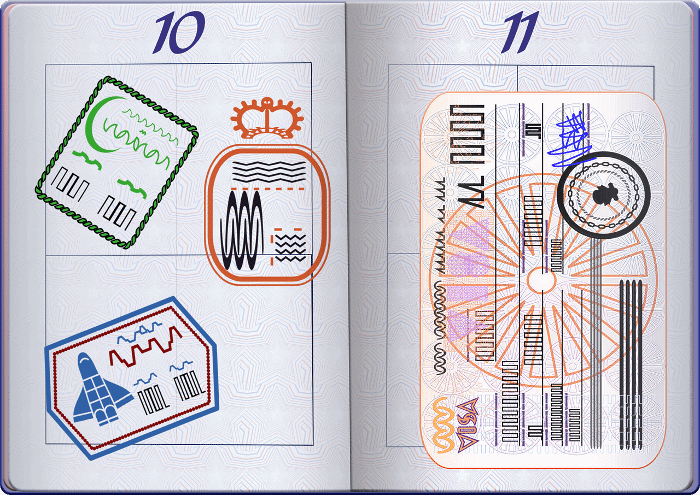
There are a few travel documents you must carry along with you. Firstly, you will need a valid passport . Make sure it does not expire within 6 months of your departure date and that it has sufficient pages. Most African countries require two blank pages or more.
So that’s four blank pages if you’re visiting two countries. Lastly, don’t forget to check visa requirements and bring a Yellow Fever vaccination certificate if required.
Most countries require a single-entry visa . In Kenya for instance, it costs about $50 (pricing may change over time). So make sure you do a little research before leaving your country.
As far as vaccinations are concerned, requirements vary from country to country. I’m not a doctor. If I were you I’d consult a specialist for legitimate advice. Here’s a list of inoculations that are usually recommended:
- Yellow fever
- Hepatitis A
Lastly : make sure you ALWAYS have your passport at hand, and a medical insurance policy to cover possible (albeit unlikely) emergencies.
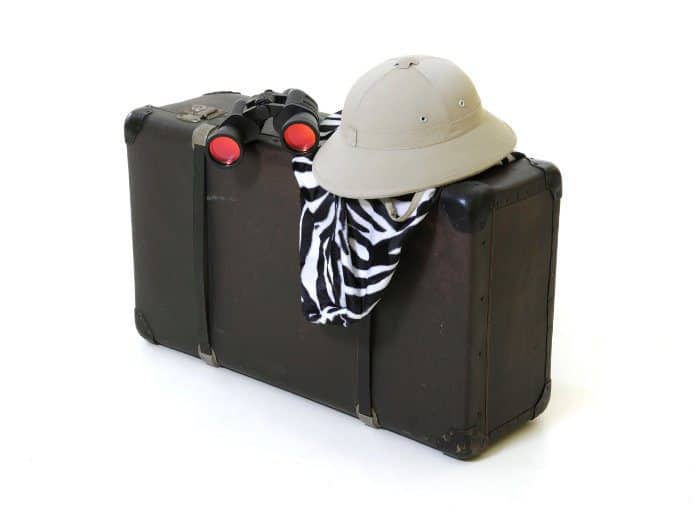
I don’t know about you, but I just LOVE to pack for a trip to Africa ! Here’s my ‘take away’ list :
- A suitcase ; ideally strong squashable luggage (duffel bags are perfect).
- Your passport and certificate of vaccination (oops… almost forgot the plane tickets).
- A wide-brimmed safari hat (perhaps a “Rogue” safari hat for the ultimate safari freak), sunscreen lotion , and a pair of sunglasses .
- Mosquito repellent (very important). In some cases, you may be advised to take prescription medicine to prevent malaria ( NB : beware of side effects).
- Good binoculars to spot your favourite animals (I recommend 10×50 for best viewing).
- A camera and spare batteries (100-300 mm lens ideally; 35 mm for portraits, landscapes, etc.).
- A few jerseys . (Yes, even in Africa. Early mornings and late evenings can be chilly, especially in Southern Africa.) Bring some long sleeve safari shirts as well.
- Zip-off safari trousers (saves you luggage space and they’re highly practical when it gets warm).
- A torch to prevent lucky/unlucky encounters with wildlife in the night (or for toilet emergencies in the bush).
- Books and travel guides . My personal favourites include:
– Signs of the Wild by Clive Walker .
– The Safari Companion by Richard D. Estes .
– Birds of Southern Africa by Sinclair , Hockey , and Tarboton .
- A Swiss army knife . These always come in handy, especially in the bush (don’t take them in your carry-on luggage or it will be confiscated by security).
VERY IMPORTANT NOTE : Oh yes, don’t forget your “eagle eyes” , so to speak, to spot what Mother Nature has on offer. An open heart is also a must. And finally, remember to bring some patience and respect , as wildlife doesn’t like loud noise.
6. Activities
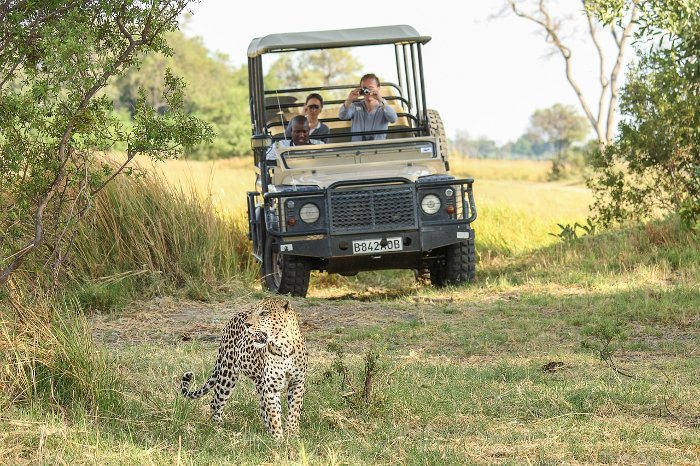
Lodges and camps typically have three main activities : game drives , walks , and night drives . Night drives in particular are more popular in Southern Africa as they’re not permitted in many East African destinations.
Some places may also offer sundowner cruises or even horseback safaris , though the latter primarily operate outside major parks, as they are less prone to potentially dangerous animal encounters.
Drives can take around 2-3 hours (depending on the chosen formula/safari highlights for the day), but could also continue all day long.
Early mornings and late afternoons are the best times for game viewing as it is cooler. Therefore, conditions are better for the optimal game viewing experience.
During the scorching middle of the day, animals tend to rest under a tree or hide in the thickets. They’re being lazy and aren’t at their enchanting best.
So this is a time to also take a siesta and rest. Or, perhaps you’d fancy a plunge in a swimming pool? The choice is yours.
- Game drives
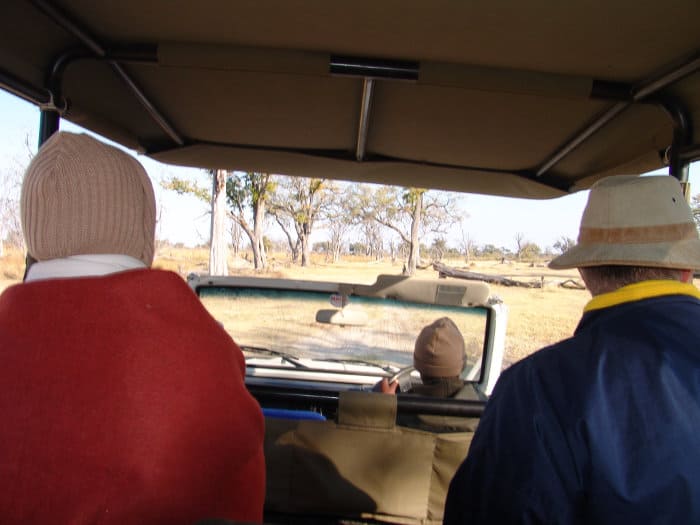
These drives are with a guide or ranger in open jeeps (most common in Southern Africa ), or minibuses (more popular in East Africa , due to the tsetse flies). Be ready to wake up bright and head out as dawn is just piercing the sky.
And make sure you wear a jersey or a blanket during the early hours. The second prime time is from mid-afternoon until sunset, when the mammals come out in the cooler ambiance.
My personal favourite is the night drive experience. You’re able to see nocturnal animals such as the elusive leopard , African genets and civets , hyenas , porcupines , and much much more. Some parks have almost 100 mammals and many of them are nocturnal.
It’s such a unique experience, especially when they allow you use the spotlight to scan through the night; looking for every sign or movement in the plains, from a shiny eye or an unusual noise . It’s like detective work at its finest.
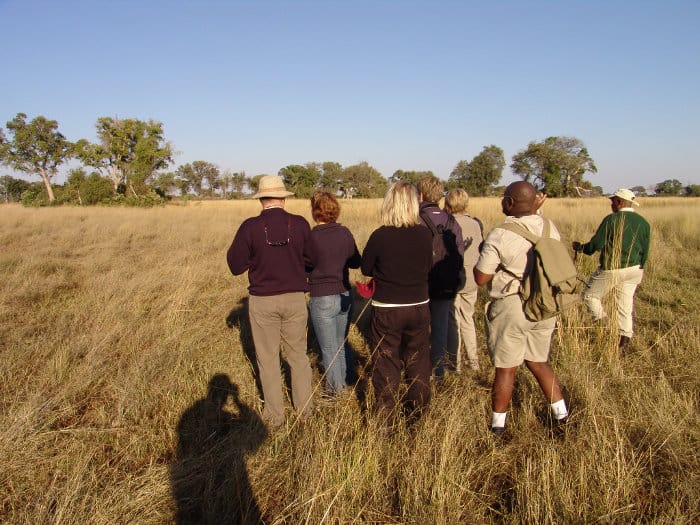
To say that safari walks are interesting would be an understatement! An armed guide walks you through the bush to experience a primitive side of nature . In some places, you’re guided by a barefooted indigenous animal tracker that can follow every little clue.
You will learn about animal tracks , droppings , and both the fauna and flora of the African savanna (especially trees and their values).
While the wildlife experience might not be as worthwhile in terms of animal sightings (you can’t cover as much distance as a game drive), the learning experience itself and the exotic birds you’ll encounter make it totally worth it.
Plus, you can only appreciate the size of animals when you’re sharing the ground level.
It’s an experience that should be on your Africa bucket list .
- Sun downer/Boat cruises
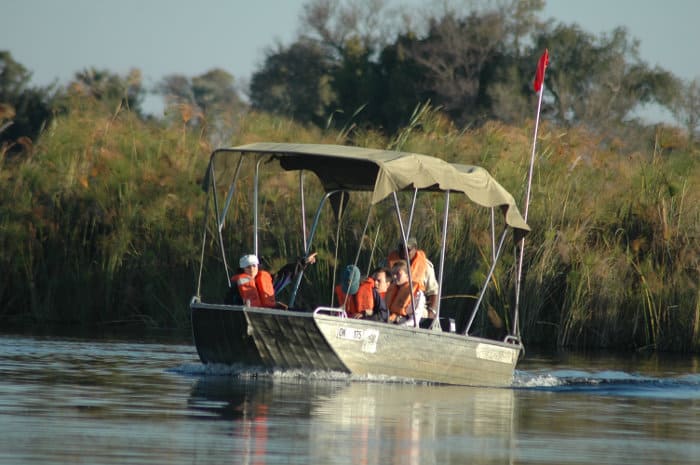
This is the way to go if you’re looking for a close encounter with hippos or crocodiles . You’re also going to have the chance to view animals that come down to the river for a drink . After all, everything from lions to tiny antelopes has to come and drink.
There will be ample opportunities to take some fantastic photos . For instance, the aquatic bird life that thrives around the riverine area is always a rich exotic sight.
7. Interests
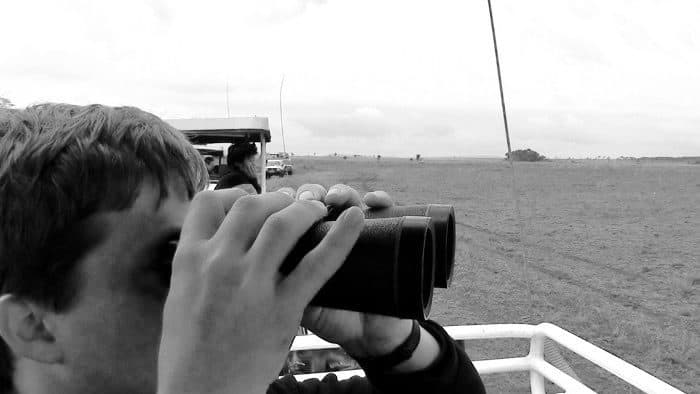
In most cases, professional guides will ask you what your main interests are before taking you on a walk or drive. If not, make sure that you tell them what you’re aching to discover.
Whether you’re looking for the big five or a specific animal or bird species, your guides should be more than happy to help realize your ambitions.
However, you must know that national parks are not zoos . You never know in advance what you’re going to see. In my opinion, this is the most exciting characteristic of safaris.
Some days are fruitful, while others are surprising and you might not see exactly what you hoped for. With that said, you’re often rewarded for your efforts and patience when you least expect it.
Never get discouraged! Have faith and be open to possibilities. The odds will eventually turn in your favour, especially on a longer safari.
8. The animals (and where to find them)
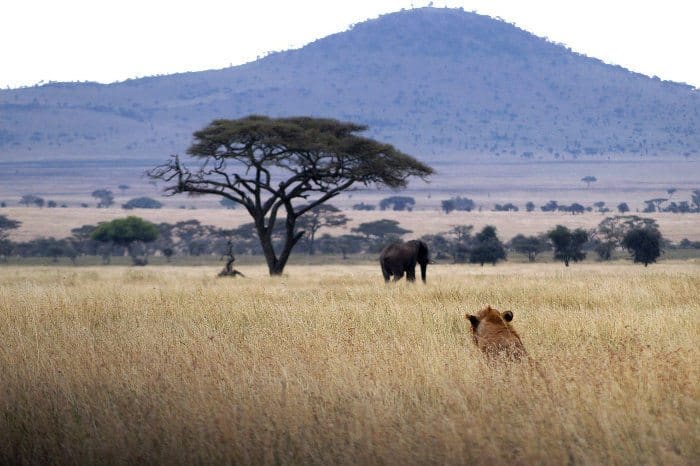
While there are no definite locations for finding specific animals , it is possible to associate certain animals with specific biomes . For instance: grazers live in grasslands, browsers in Miombo woodlands, and predators in open savannahs (although they can hunt everywhere).
If you’re searching for kudu , you’re unlikely to find them in open regions. This type of antelope is typically found in bushy areas where food is plentiful and they can pick leaves from the small trees.
Similarly, giraffes love Acacia territory . Leopards on the other hand are more likely to be seen up in a tree or in rocky areas (koppies).
Got the idea? Wonderful. 🙂
Safari njema . (Bon voyage)
About The Author
Michael Theys
Related posts.
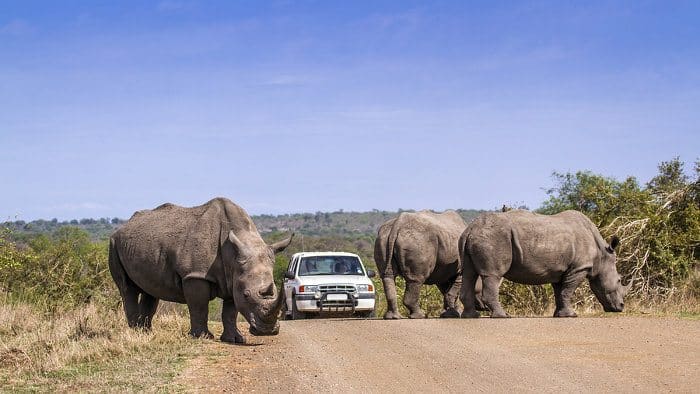
10 “lekker” ways to go on safari like a South African
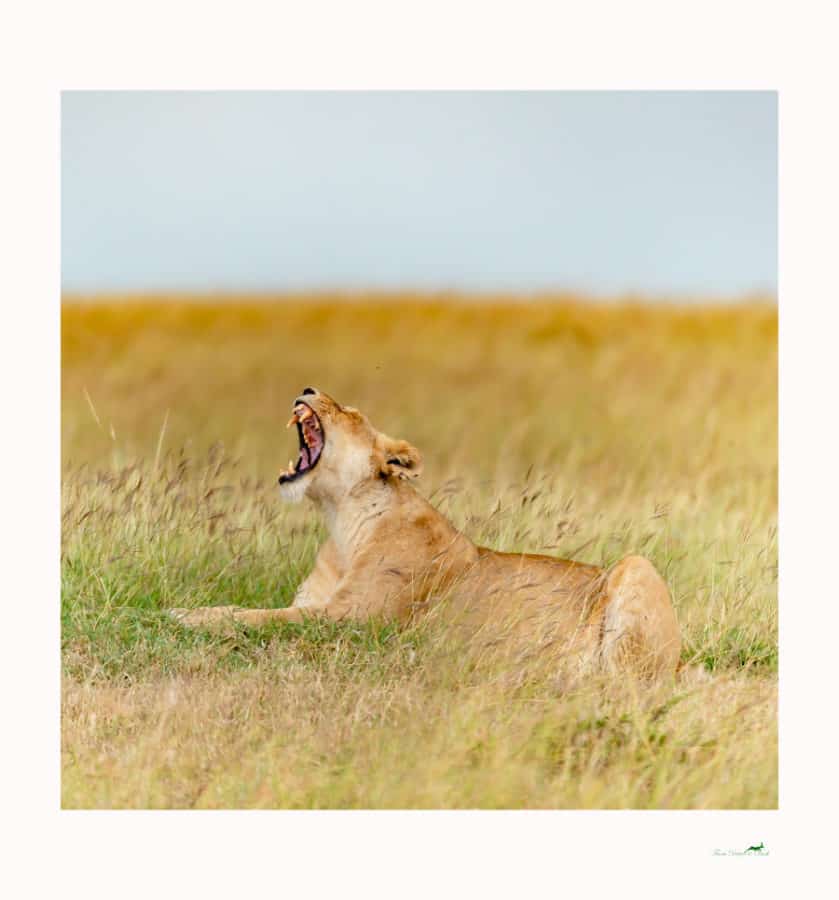
African safari simplified: Africa for beginners
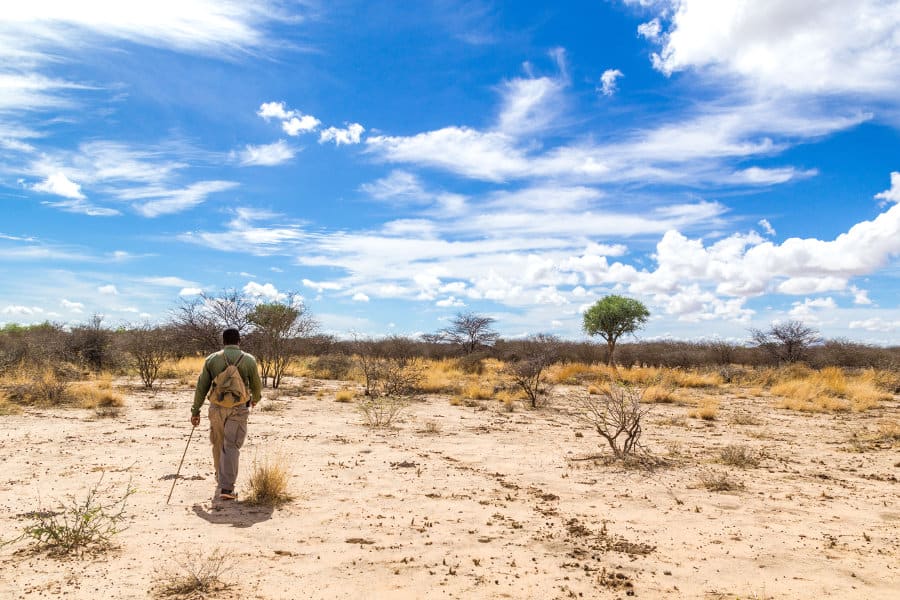
African safari tips: how much should you be tipping on a safari?
6 thoughts on “8 essential tips for an unforgettable african safari”.
I think it’s a great list, very well explained in brief.
Merci Hilde, ça fait plaisir à entendre! 🙂
Vraiment super Michael !
Que de magnifiques souvenirs, grâce à toi et ta famille.
Thanks guys! As you can see it’s still a work in progress. I look forward to having you as frequent visitors on my site. 😉
Love your site Mike. 😉
Keep it up!
You’re giving us great tips. 🙂
Go for it! :d
Nice site layout for your blog. I am looking forward to reading more from you.
Leave a Comment Cancel Reply
Your email address will not be published. Required fields are marked *
- You are here:
10 Travel Tips When Going on an African Safari
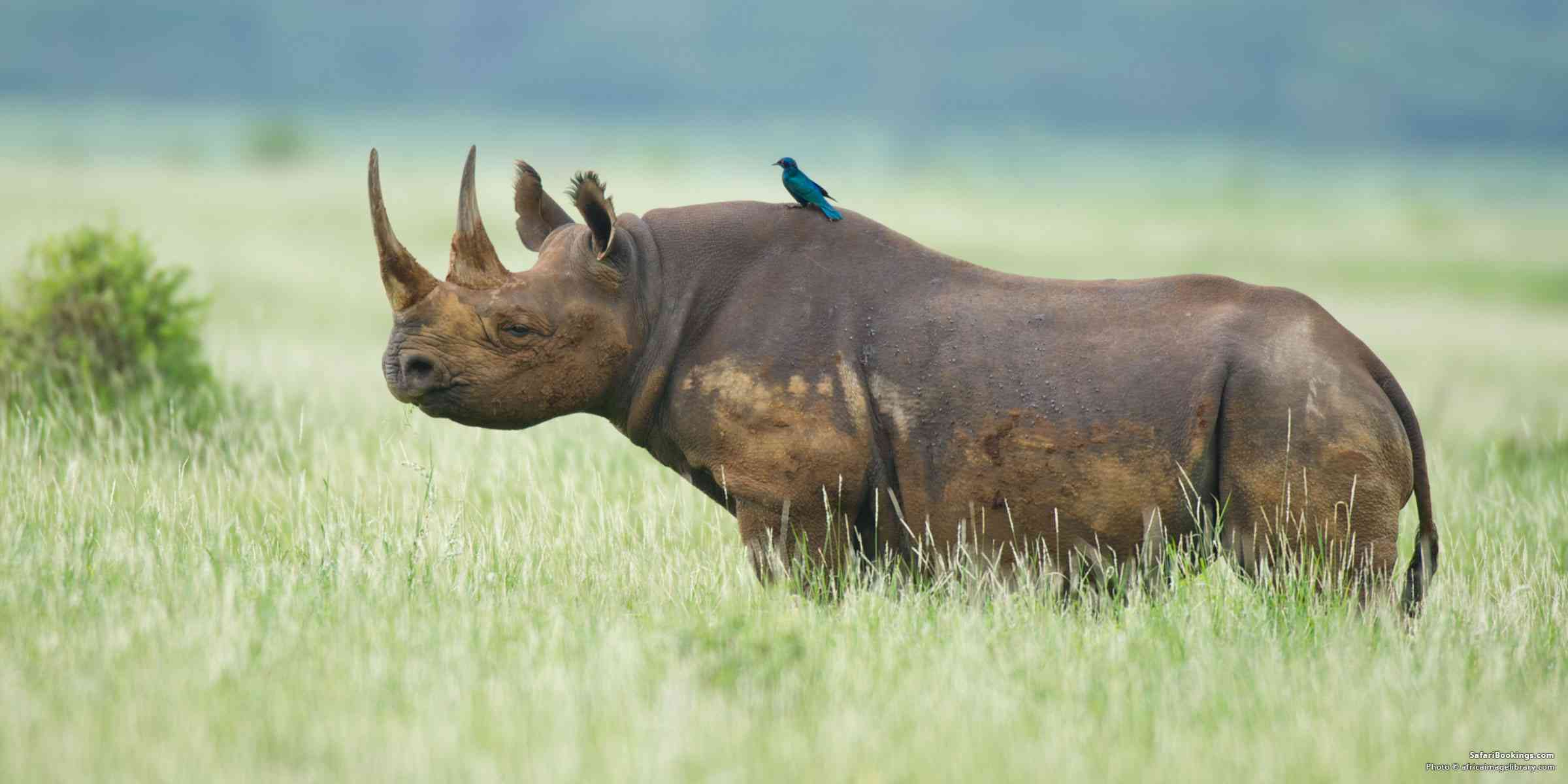
Patrick has been an Africa travel specialist, based in Australia, for over 10 years and prior to that was a safari operator in Mana Pools in Zimbabwe.
As the saying goes, "It's better to be safe, than sorry." At SafariBookings, we know this only too well. That's why we want to equip you with some of our tried and true Safari Travel Tips. They will help you plan a safari without any mishaps.
1. Travel Insurance
As soon as you confirm your travel plans, take out travel insurance. Select a policy that covers cancellation, medical illness, emergency evacuation and associated hospital treatments. Be sure to take your travel insurance emergency phone numbers and your policy number/details with you.
2. Personal Safety
Your personal safety and security is mostly a matter of common sense. So take the same precautions while travelling in Africa on safari that you would in any major city at home:
- Do not carry large sums of cash (see below for more information on Cash, Credit Cards & ATM’s).
- Carry your cash (plus passport and other travel documents) in a money pouch hidden under your shirt. Keep it out of sight or stowed in your camera bag or knapsack (which should remain in sight at all times).
- Keep a close watch on your personal bags when walking in crowded areas (airports, markets, restaurants and on the street).
- Do not walk alone at night.
- Leave your passport, airline tickets and cash in a safe place (the hotel/lodge safe) when venturing out.
- Keep tempting valuables (including phones, cameras, wallet pouches, handbags) out of sight. Lock them up in the room safe or hand them in to management.
- If possible, leave your jewelry at home.
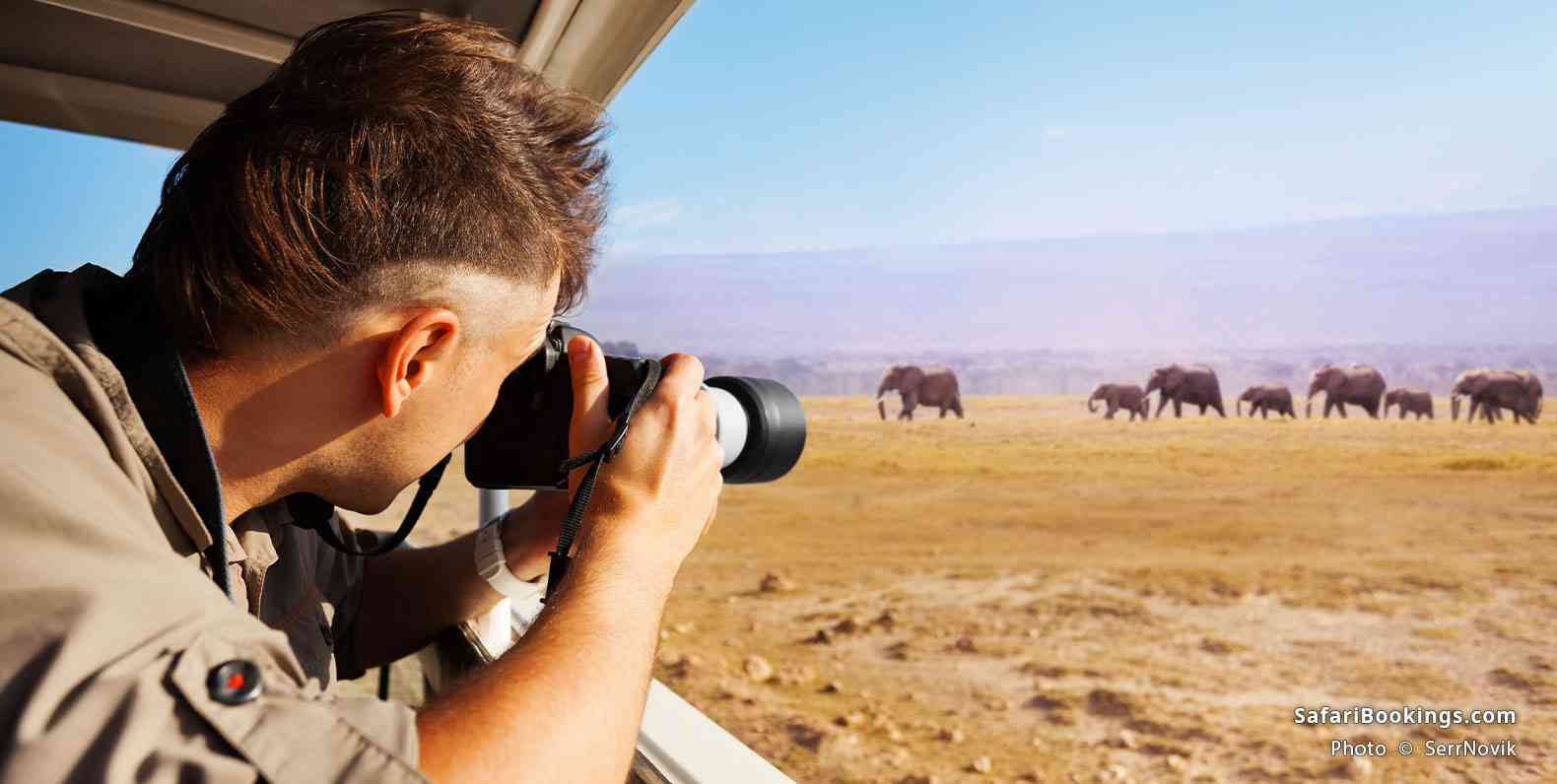
3. Cash, Credit Cards & ATM’s
Carry a combination of cash (preferably US$ for most countries…and Rand for South Africa) and at least one credit card.
Travelers cheques (checks) are not widely accepted in African countries (i.e. Tanzania ) anymore. The United States Dollar remains the most widely accepted, followed by the Euro and Sterling.
A very important Travel Tip relates to money. Take at least US$150 to $250 per person/per week in cash from home. Visas secured on arrival must be paid in cash and in the exact amount.
Some countries do not accept US$ bills dated before the year 2000, due to suspicions of counterfeiting.
Be wary of streetside money-changers! If you do use one, be sure to count each note separately to satisfy yourself that the whole amount is there before handing across any of your own cash. Once counted, be sure not to let the pile out of your sight. It is an old trick to switch bundles and for you to later discover that the new bundle is mostly newspaper. If the money traders are legitimate, they will not be offended!
Credit & Debit Cards
Most establishments accept international credit cards. Use them as a method of payment wherever possible. It makes sense to carry more than one brand of credit card as not all types are accepted by all outlets/hotels. On the downside, credit card companies do not offer the best exchange rates going around and will often add a foreign transaction fee for good measure!
Credit cards in Africa carry attract a surcharge - up to 5% in some cases, and possibly more! Be sure to ask about any surcharges before you hand over your credit card.
Important Travel Tip: Most banks and credit card companies advocate that you advise them before you travel overseas. This is so that their credit card monitoring systems do not suspend your card when they detect any unusual purchases. Such purchases will trigger the suspension of your card and leave you with embarrassing consequences.
Also, be cautious of providing your credit card details when travelling. And do not let your card out of your sight when paying your bill.
ATM Machines
In Africa, ATM machines supply only local currency and you may need an international PIN code. Be sure to check with your bank/credit card facility at home about how this should work. Not all ATMs in Africa will accept every credit card type. VISA has the best coverage in Africa. Use an ATM at a bank, so if your card is retained for any reason, you can go in and get it back. Don’t rely on ATMs as your main source of cash while on safari!

4. Electric Current
Electricity in Africa is all 220-240V/50Hz AC, as is much of Europe, the UK, Australia and New Zealand and virtually all the Asian countries and India. Those of you from North America must bring an adapter for the proper plug configuration and a converter.
Plugs/Types:
C (European) : Two-prong round (unearthed) D (Old British plug) : Three-prong round (small) F (Schuko plug) : Two-prong round (with 2 x earth contacts) G (UK plug) : Three-prong rectangular M (South African plug) : Three-prong round (large)
Type M (standard in South Africa) , Type D (standard in Namibia ) plug sockets and Type G (the UK standard) plug sockets are the dominant plug types in Africa. However, some countries do offer Type C & F plug sockets (see Table below). A number of hotels have international wall sockets which will take an array of both two-prong and three-prong plugs. North America and Japan use Type A & B plugs, and Australia a Type I plug. All will require an adaptor plug!
Country : Plug Type
Botswana : D & G Rwanda : C Kenya : G South Africa : D & M Malawi : G Swaziland : M Mozambique : C, F, & M Tanzania : D & G Namibia : D & M Zambia : C, D, & G Uganda : G Zimbabwe : D & G
Not all safari camps and lodges have electrical outlets in the tents/rooms but they always have a place where you can recharge your camera/video and phone/iPod batteries.
Some camps run their generator at certain times of the day – so be sure to check with the manager when you arrive.
A number of mobile safari operators have inverters in their vehicles, so you can charge your camera/video batteries on the move.
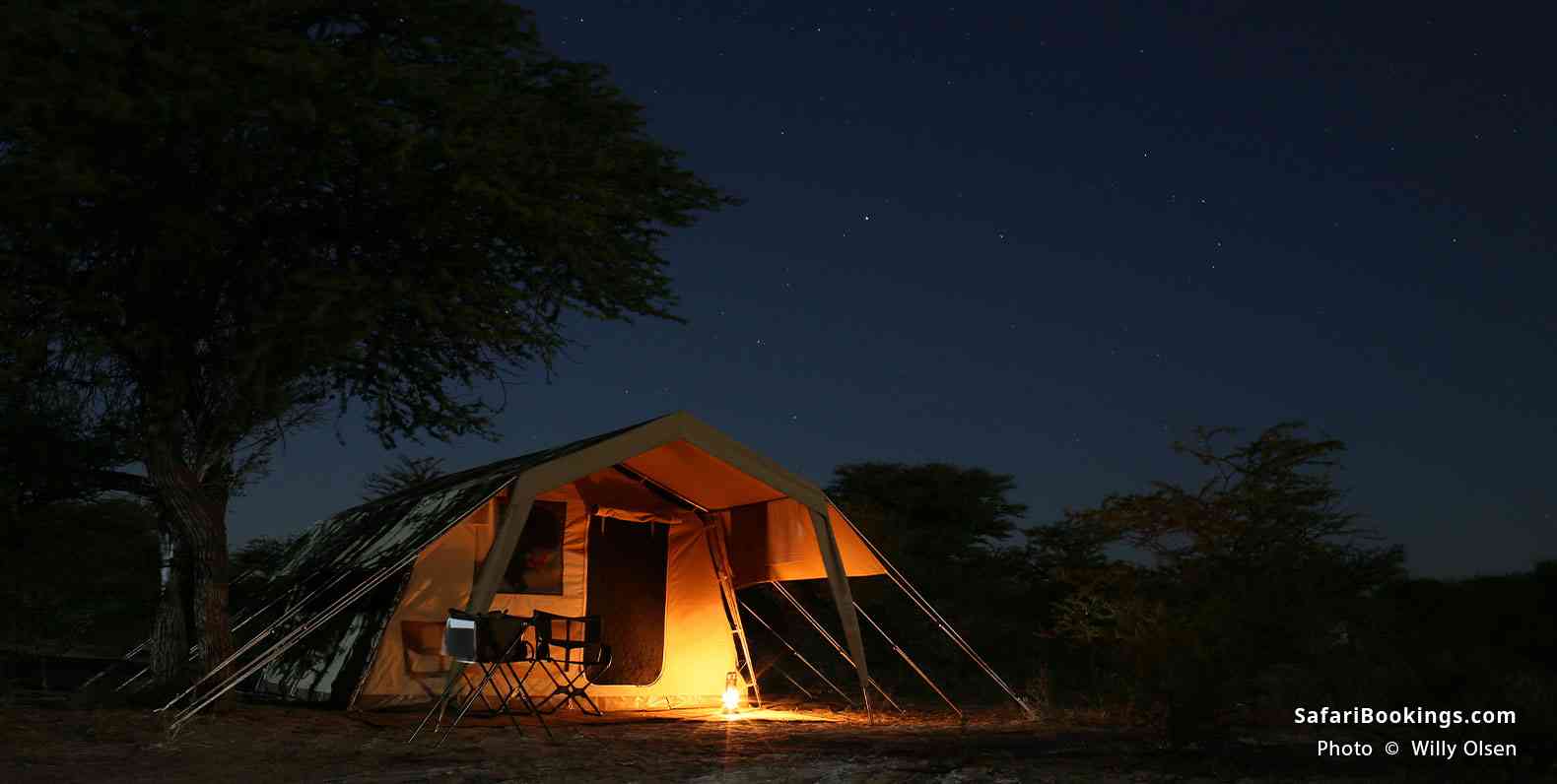
5. Mobile (Cell) Phone & Internet Access
Generally speaking, communications in Africa are not what you are accustomed to at home but mobile (cell) phone coverage (and even Wi-Fi) is certainly more widespread throughout Africa – although not in some of the more remote safari destinations (thankfully).
A Travel Tip before you leave home: check with your service provider that your phone is registered for international roaming (and check that the phone you have is compatible with the networks in Africa. Most operate on GSM digital networks, running at a frequency of 900 MHz (and some 3G networks too). If your phone is a dual or tri-band GSM phone it will work just fine.
More and more we are seeing Wi-Fi being offered at safari camps/lodges – some as an extension of that countries communications grid, and some connected via satellite. Check with your Africa Travel Specialist before you leave home about which camps/lodges have WiFi. Better to use WiFi than your mobile phone. Avoid exorbitant international roaming charges!
Please note: Not all conventional communication options (phone, fax, internet and email) are available at the more remote safari camps (and mobile camps particularly). Communications are sometimes only available via HF radio.
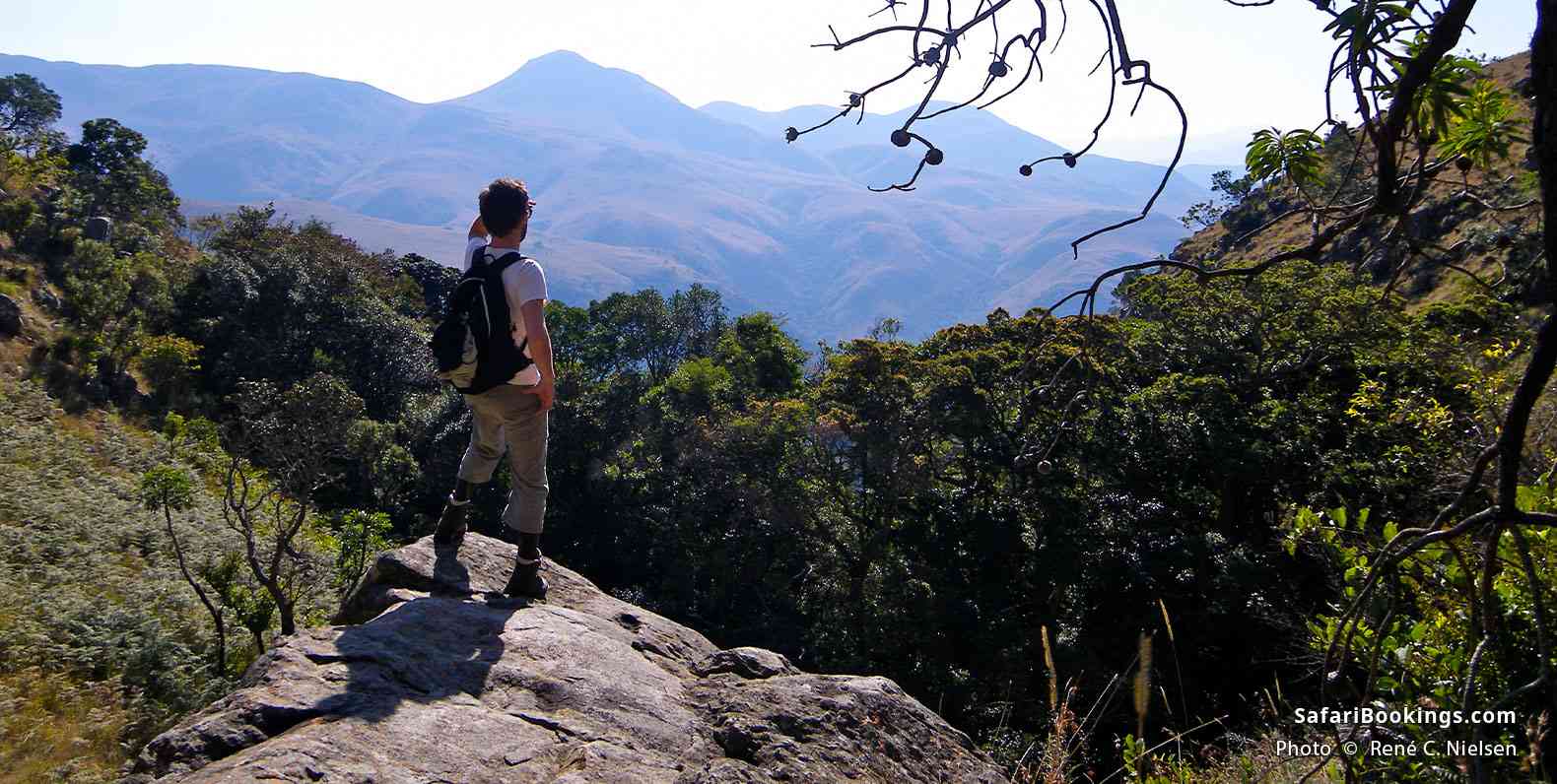
Drink bottled water. You are always safe drinking the bottled water that is readily available at all the camps and lodges. Carry a bottle of water with you at all times – including on transfers between camps. If you are at all apprehensive about the quality of water where you are staying, check with the staff. And if the water is not treated or bottled, then avoid ice in your drinks or cleaning your teeth with the tap water. Take water purification tablets for emergency use if you think bottled water will not be available.
The safari industry is making a concerted effort to reduce the use of plastic water bottles - try to work with them.
A number of safari operators are making sterilized water bottles (mostly stainless steel) available for you to fill with purified water at their camps and lodges. This is an initiative that you should adopt wherever possible as this will have a significant and positive environmental impact. By doing away with the factory-filled (sealed) plastic water bottles you will not only save fuel in transporting these bottles to remote regions (by their thousands) but also solve the problem of the enormous pollution to roadsides and towns that these plastic bottles foster.
Caution: Dehydration is a real danger on safari. Make sure to drink at regular intervals and have water at hand at all times.
In the winter months (June to October), the game reserves can be extremely dusty. Contact lens wearers should bring eye drops and eyeglasses, to avoid eye irritation. Clean camera and video lenses regularly and store in a camera bag, while on safari.
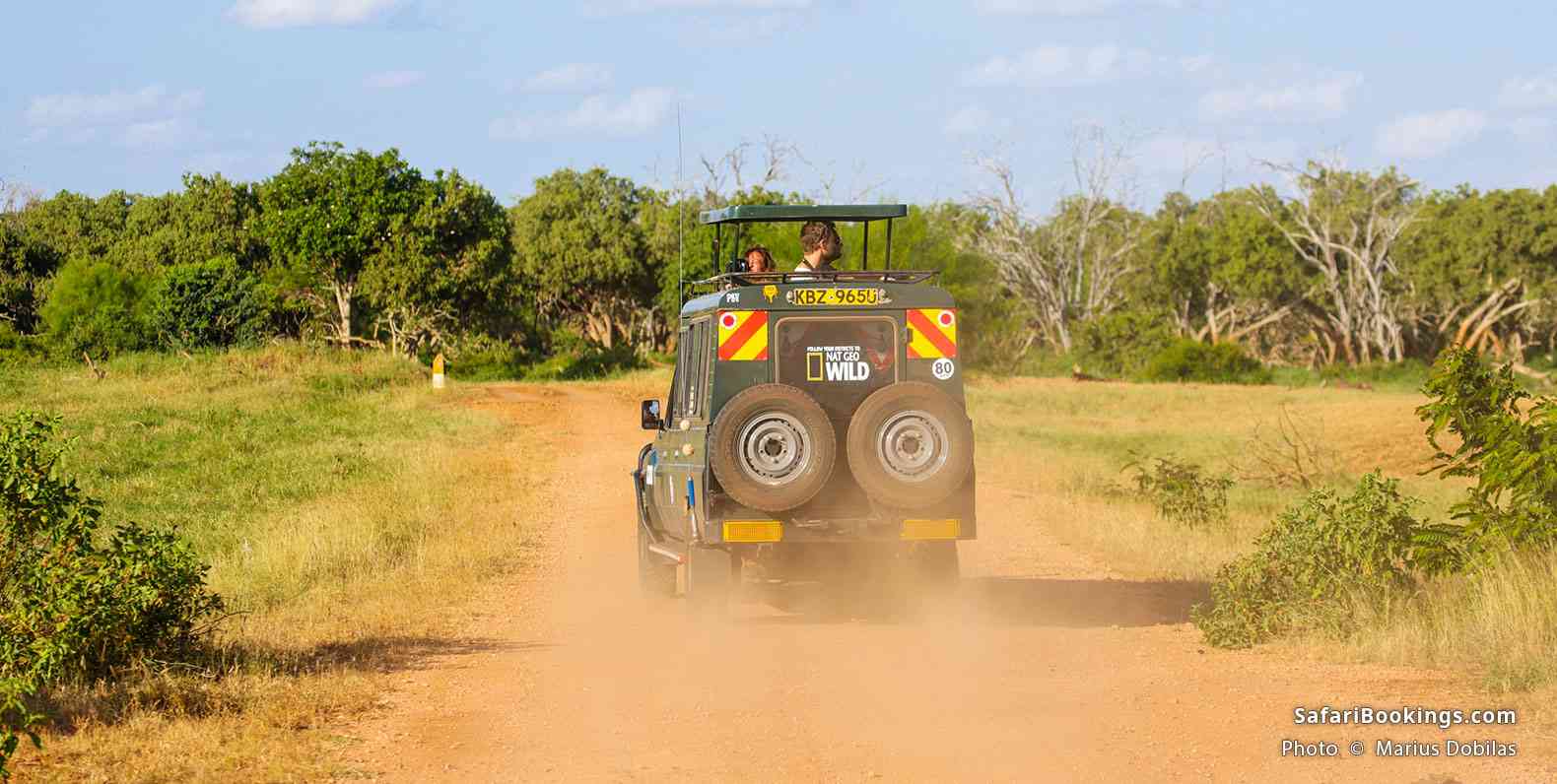
Should we tip, and if so - how much?? This is a common dilemma for most visitors to any foreign country! In Africa, tipping is not expected but is customary. The traditional gratuity to safari guides or camp staff is not included in the price of your tour and is completely discretionary.
Bear in mind that what may seem like an inconsequential amount to you may be significant to local African staff and will certainly be received with a display of gratitude that is genuinely humbling.
Most safari lodges will have a ‘tip box’ at reception for the staff – this covers all the ‘unseen’ services you have enjoyed during your stay, including the housekeeper and kitchen staff.
Guidelines: Tip moderately and in accordance with the level and quality of service provided – and only if you are satisfied with that service. Tips can be paid in US dollars or local currency. Use the following guide:
Driver/guide - US$10 and upwards per day. Private safari guide - US$25 and upwards per day; Camp staff - US$10 to $20 per day, as a pooled tip to be shared among the housekeepers, waiters, bartenders, etc.
If you spend a great deal of time with a single guide, consider increasing the above amounts in accordance with the enthusiasm and effort displayed (or your overall satisfaction level).
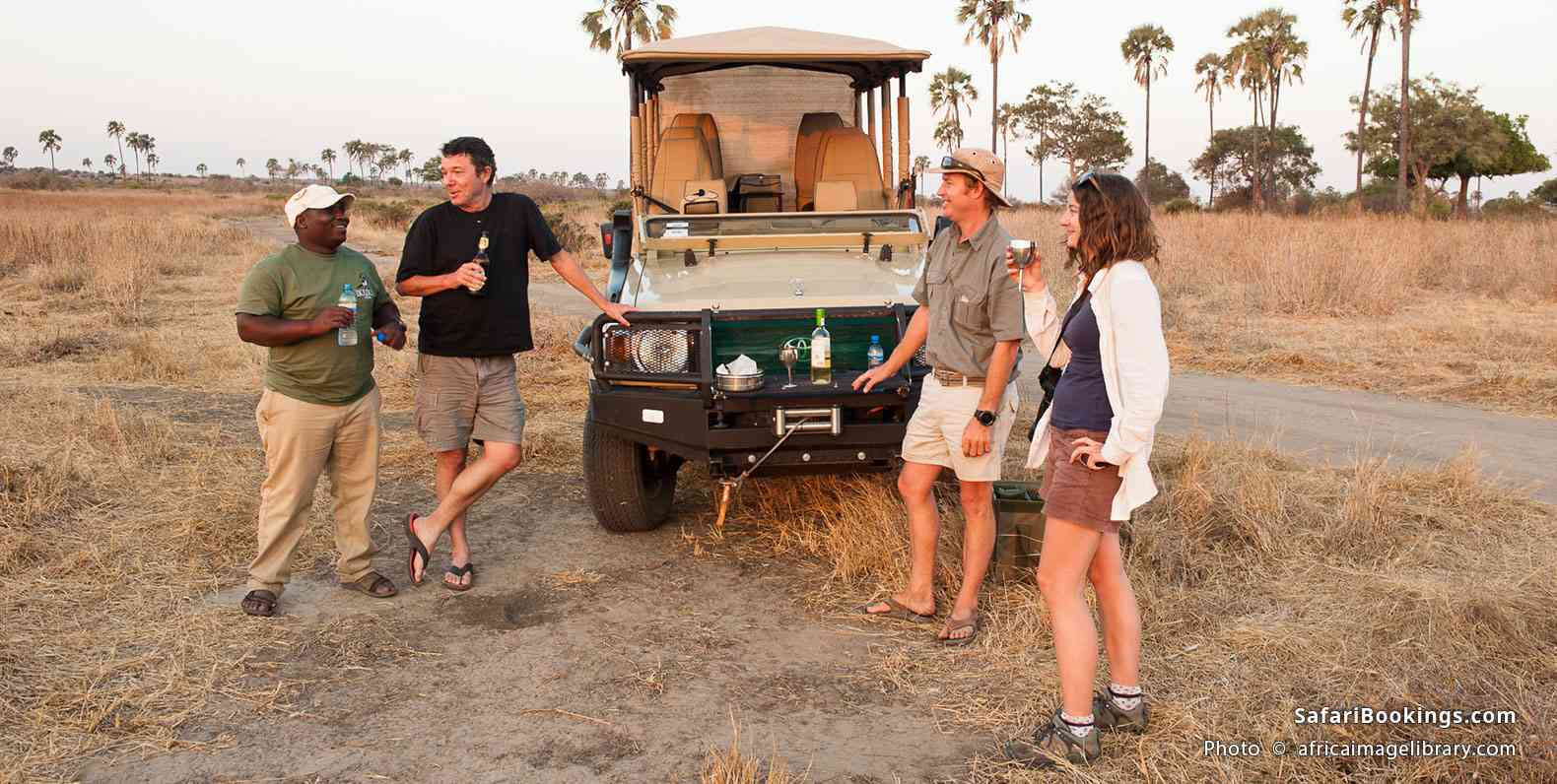
9. Charity on Safari
Many visitors to Africa feel a strong urge to help the less fortunate whom they encounter on a safari, or when visiting a local village or school. It is best to seek an appropriate opportunity while you are traveling, rather than carry along gifts from home. Many safari camps and lodges are actively involved in working with their local communities to sustain schools, clinics and other projects. Ask about this when you are there and visit the school, clinic or project if you can. A donation to something you have seen on the ground will bring you more satisfaction (and directly help the neediest). Contribute in a way that helps a person (or community) help themselves, and enhance their way of life.
Resist the temptation to offer ‘handouts’ to kids on the side of the road. This only encourages dependency on such generosity and teaches these children that begging brings reward. There is no dignity in begging and the harassment it fosters will not endear you to the next group of tourists either!
A rather fun idea is to gift a football (soccer ball). Africans love soccer yet not all the children have a ball with which to play. For more ideas, visit Pack For A Purpose website.
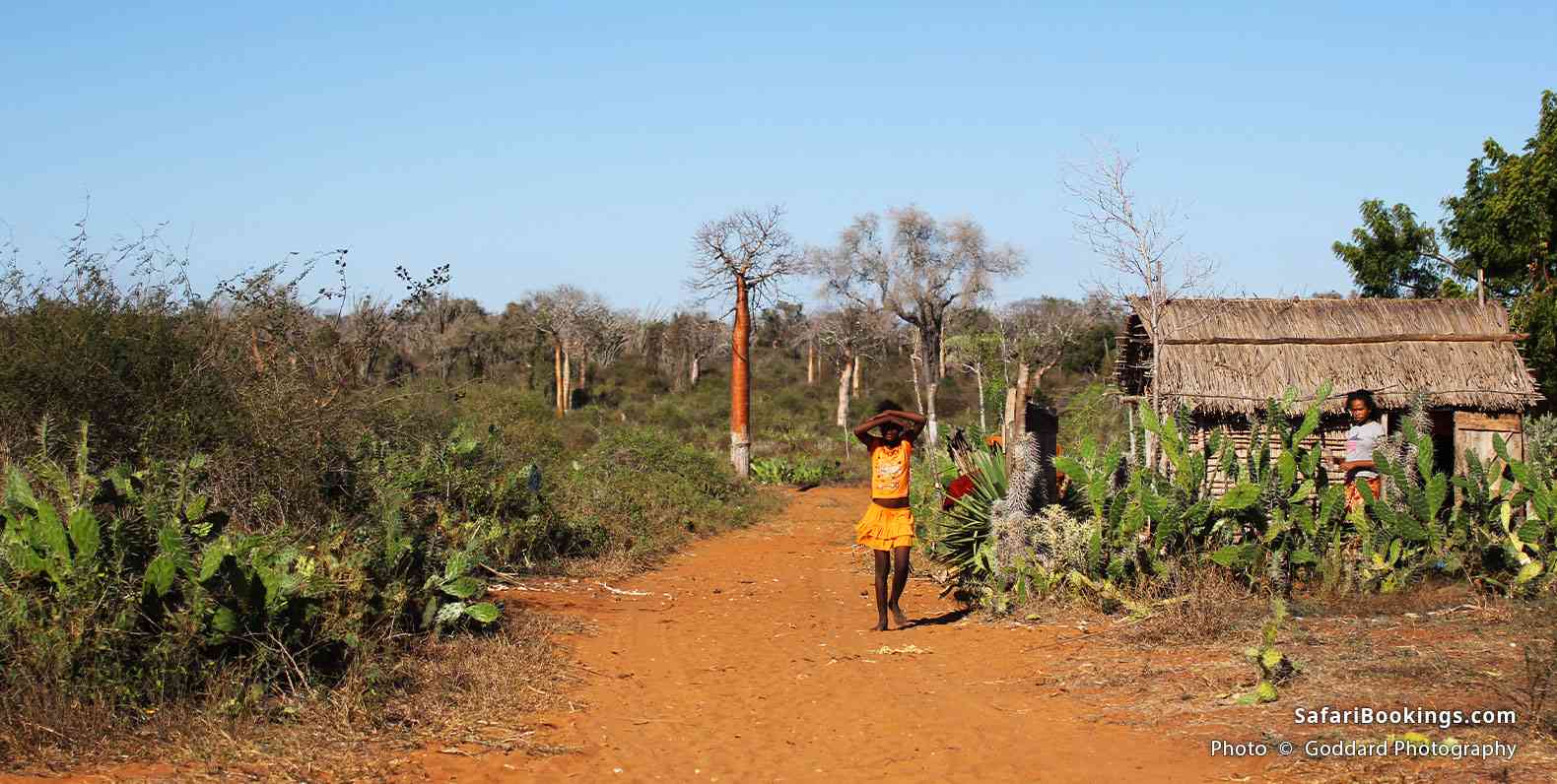
10. General
Most African countries have stringent exchange control regulations and it is illegal to enter or leave the country with anything other than nominal amounts of local currency. To avoid problems, do not exchange too much money into local currency at any one time. There is normally no restriction on the amount of foreign currency that may be imported.
Are You Ready for Your Safari Adventure?
We hope these 10 Travel Tips have been helpful to you. For more information or to book a safari tour , Contact Us . It is our pleasure to assist you with your safari plans.
Safaris & Tours
Post on Pinterest:
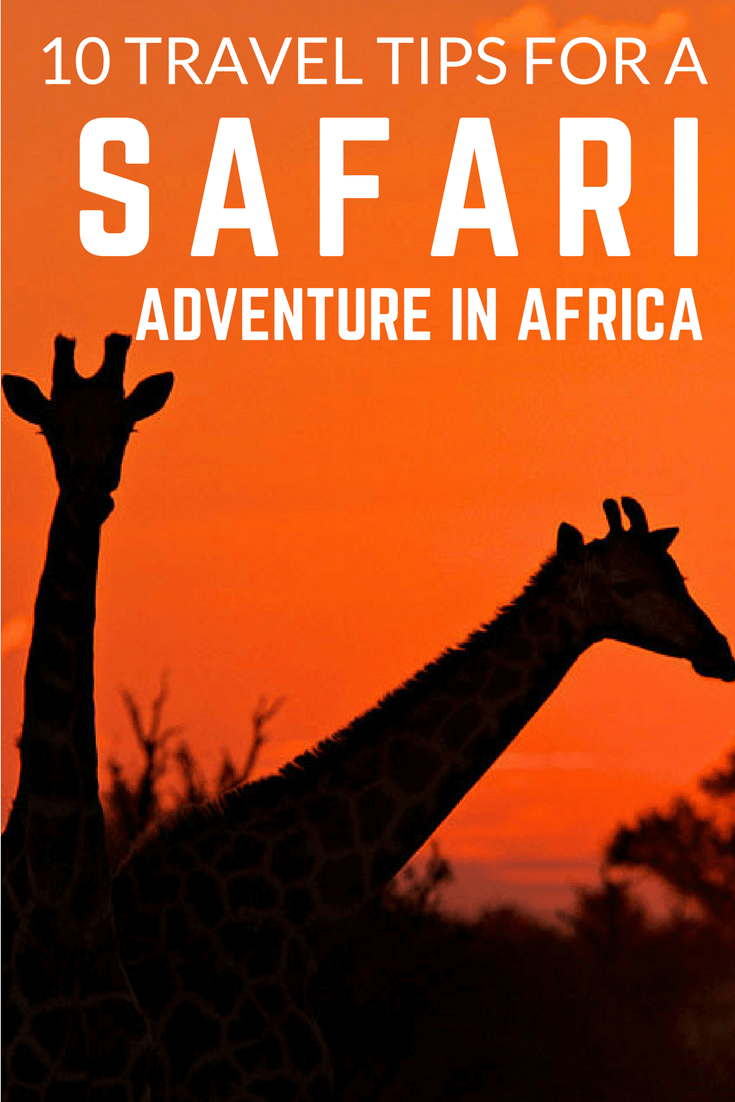
About SafariBookings
SafariBookings is the largest online marketplace for African safari tours. Easily compare offers from top-rated tour operators. Make decisions like a pro by using our 104,396 reviews and 223 destination guides. More About Us
Safaris by Type
- Luxury Safaris
- Budget Safaris
- Gorilla Trekking
- Chimp Trekking
- Family Safaris
- Private Safaris
- Group Safaris
- Photo Safaris
- Overland Tours
- Camping Safaris
- Fly-in Safaris
- Walking Safaris
- Birding Safaris
- Self-drive Safaris
- Canoe Safaris
Most Popular Blog Posts
- Best Time for African Safari
- Best Safari in South Africa
- Family Safari in South Africa
- African Safari Tips
- Game Reserves Near Cape Town
- What to Pack for a Safari
- Best African Safari Parks
- Top 5 Best African Honeymoon Safaris
- Top 5 Best Tanzania Family Safaris
- Best Places to See Cheetahs in Africa
- How Much Does an African Safari Cost?
- Best Places To Visit In Africa in 2024
Blog Categories
African safari tours.

10-Day Luxury Bush and Beach Safari
$3,996 to $4,730 pp (USD)
Kenya: Private tour Luxury Lodge & Resort
You Visit: Nairobi (Start) , Masai Mara NR, Lake Nakuru NP, Lake Naivasha (Naivasha) , Amboseli NP, Diani Beach, Nairobi (End)
Rochar Africa Expeditions
4.9 /5 – 15 Reviews
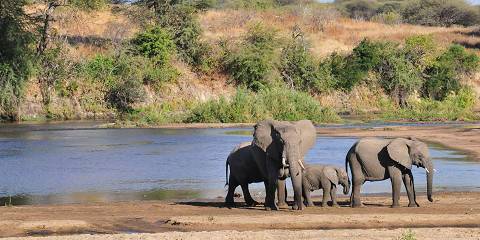
4-Day Midrange Safari, Tarangire, Serengeti, Ngorongoro
$1,195 pp (USD)
Tanzania: Shared tour (max 6 people per vehicle) Mid-range Lodge & Tented Bush Camp
You Visit: Arusha (Start) , Tarangire NP, Serengeti NP, Ngorongoro Crater, Arusha (End)
Mountain Warriors Tours and Safaris
5.0 /5 – 76 Reviews

9-Day Flexible Migration Roundtrip Safari
$3,253 pp (USD)
Tanzania: Private tour Mid-range Lodge & Tented Camp
You Visit: Arusha (Start) , Tarangire NP, Lake Manyara NP, Lake Natron, Pololeti GR (Greater Serengeti) , Serengeti NP, Ngorongoro Crater, Arusha (End)
Paradise & Wilderness
4.9 /5 – 132 Reviews

Africa Safari Trip: A Comprehensive Guide To Crafting Unforgettable Memories
H ave you witnessed a lion’s roar echo across the savanna or watched a herd of elephants lumber by? An Africa safari trip is an otherworldly experience, but where do you even begin? This guide will equip you with all the essentials to plan your unforgettable adventure . Even though it can seem overwhelming at times, if you’re equipped with the right guidance and information, the procedure is rather easy.
To help you plan the perfect safari tour in Africa, in addition to answering the majority of your frequently asked questions, we’re put together some of the greatest tips and useful suggestions.
Choosing the Location of Your African Safari Trip
An Africa safari trip promises an enchanted world of discovery, where each expedition and place holds the potential to reveal a captivating tale. Every area of this enormous continent, from the lush deltas of the south to the brilliant savannahs of the east, offers a different fabric of fauna and culture. This is more than just a journey—it’s an exploration of the core of nature, where opportunity abounds at every turn.
African safaris are unique among travel experiences because of the authentic, natural spectacle of the wild. These excursions aim to fully immerse you in the world of animals, not just observe them. Planning your destination is among the most crucial aspects of preparation for any holiday, including this one. Africa is vast, so it’d be helpful to start with a “where to go on an Africa safari trip” Google search if you have no idea what to do.
To select the ideal safari destination, you must consider the things you wish to see. Are there any specific animals or cultural events you would like to see? Kenya and Tanzania from July to October are your best choices if you’ve always wanted to see the Great Wildebeest Migration. Visit either Botswana or South Africa to see a huge herd of African elephants throughout the year.
In East Africa and the majority of Southern African nations, the “Big Five” are also widely distributed. Travel to Uganda, Rwanda or the Congo for gorilla trekking; these countries are all in Central Africa. If you want to see chimpanzees on your Africa safari tour, Uganda is the ideal place to do it.
Top 5 Choice Destinations for Your Africa Safari Trip
Here are our top five African wildlife safari destinations to help you plan your trip.
Kenya’s Maasai Mara National Reserve
At the Maasai Mara Reserves, the Big Five roam free, and boundless plains extend into the horizon on a wildlife safari. Traveling off-road and appreciating the lack of fences and lodging at any of the Mara conservation areas allows you to experience the breathtaking sight of countless wildebeests roaring across the East African savanna around the Great Migration.
From open safari vehicles, watch as lions hunt their prey with unparalleled subtlety. Elephants socialize within their close-knit groups, and elegant giraffes peruse acacia trees with grace. A fascinating insight into the Maasai people’s dynamic local culture, which is entwined with the land, its profusion of wildlife, and the natural beauties of the wildness itself, is provided by Maasai Mara.
Tanzania’s Serengeti National Park
Tanzania’s Serengeti National Park is home to a large environment that is brimming with life. See the boundless plains packed with antelopes, zebras, and wildebeests as they migrate in a never-ending dance of survival throughout your Africa safari trip. It’s what you anticipate seeing on game drives following your viewing of National Geographic or PBS programs. You might be amazed watching the big cats lounging in the shade following a good hunt, or you might experience the exhilaration of seeing a cheetah racing across the landscape in a flurry of speed.
There are other methods to observe wildlife, such as taking a hot-air balloon flight across the savanna for breath-inspiring, all-encompassing views of this iconic African terrain. Seasonality is essential when thinking about visiting the Serengeti; never schedule an unplanned online vacation.
Zambia’s South Luangwa National Park
You can feel the African wilderness in Zambia, not just see it. In contrast to safaris that are limited to metal enclosures, South Luangwa encourages you to stroll among the animals rather than drive by them. Imagine your heart racing as you make your way through verdant riverine forests full of leopards hiding in their disguises, only to be astounded by vast herds of buffalo crossing wide-open savannas.
As you approach elephants bathing, listen to the Luangwa River’s rushing waters, which will lead you to the echoes of night safaris. You can unwind in the unexpected comfort of fly tents or treehouse retreats when the stars adorn the sky.
South Africa’s Greater Kruger National Park
You can journey across acacia woodlands and tour places with sun-filled savannas along the rushing waters of the Sabi River in South Africa’s Greater Kruger National Park. Hear the echoes of prehistoric existence and see the exhilarating dance of adventures amidst the rare species. Renowned for its almost assured Big Five meetings, you get to experience the exhilarating thrill of seeing elephants trumpeting by a waterhole or lions relaxing in golden light—you don’t have to imagine it.
There is more to Kruger’s artistry than the Big Five. Higher populations of predators and a more varied array of species can be found in the superb private game reserves found in the Greater Kruger National Park. Wander along the river where crocodiles and hippos sunbathe before becoming lost in the rainbow of more than 500 different bird species.
Botswana’s Okavango Delta
Emerald islands emerge from the reflecting waters of the spreading waterways of Botswana’s Okavango Delta, a UNESCO World Heritage Site. A mokoro is a native dugout canoe in which you may sail softly and intimately while spotting sleeping hippos afar and thirsty elephants sipping at the riverbanks .
Search among the trees for one of the greatest spots to see leopards or take in the aerial views of storks, eagles, and pelicans.
In such a distant location, the Okavango Delta boasts one of the largest concentrations of upscale safari resorts in Southern Africa, providing you with exclusive access to convenience and uncrowded rivers for a singular embrace of unspoiled wildlife.
Tips For An Outstanding African Safari Adventure
The foundation of a great African safari is effective communication. It makes sure you get the best possible experience out of your trip by bridging the gap between what you expect and the actual conditions of the environment. There are three communication techniques to help you receive the experience you want by interacting with an Africa safari trip guide or travel advisor .
Clearly state your demands and desires. Tell us about your ideal speed, cultural attractions, the wildlife you hope to see, and any unique interests you may have, such as birdwatching or photography. This enables your guide to customize your safari adventures based on your interests and budget. Mention any possible restrictions. Any physical restrictions or sensitivity should be disclosed to your guide to guarantee a fun and safe trip.
Pose inquiries. Never be afraid to ask questions about anything that piques your curiosity, be it local customs or the behavior of animals. Your guide holds a wealth of information that is just waiting to be discovered.
African safaris are an ode to the diversity and grandeur of nature. Every excursion offers a chance for a profound and intimate connection with nature. However, in a world full of breathtaking locations, the real art of travel is in how you take in each one. Each destination has a spirit of its own, and you can make transforming vacation experiences with the correct itinerary in addition to ones that are simply memorable.
Whether you’re traveling to the wild African savannahs or the charming countryside of Tuscany, creating a one-of-a-kind, dreamlike trip requires careful planning and vital information. It all comes down to creating a seamless, stress-free, and uniquely personalized tapestry of memories.
People Also Ask
How far should my Africa safari trip be scheduled? It’s advisable to make reservations eight to twelve months in advance of when you wish to go or depart for your selected African safari location. Enough time guarantees availability and your place at the top of the line for the most desirable experiences that Africa presents. It is always better to schedule your safari trip earlier than undergo a last-minute rush.
When is the ideal time to go on an Africa safari trip? The dry season, which runs from June to October, is the ideal time to go on a safari. Since it’s a warmer period of the year, there’s a greater chance that you’ll spot creatures looking for water. You can also witness the famous Masai Mara migration during these months.
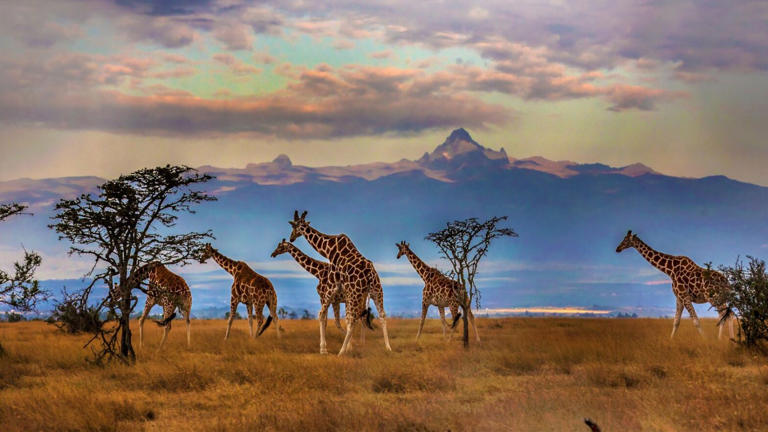

Safari Photography: Tips, Best Cameras and More
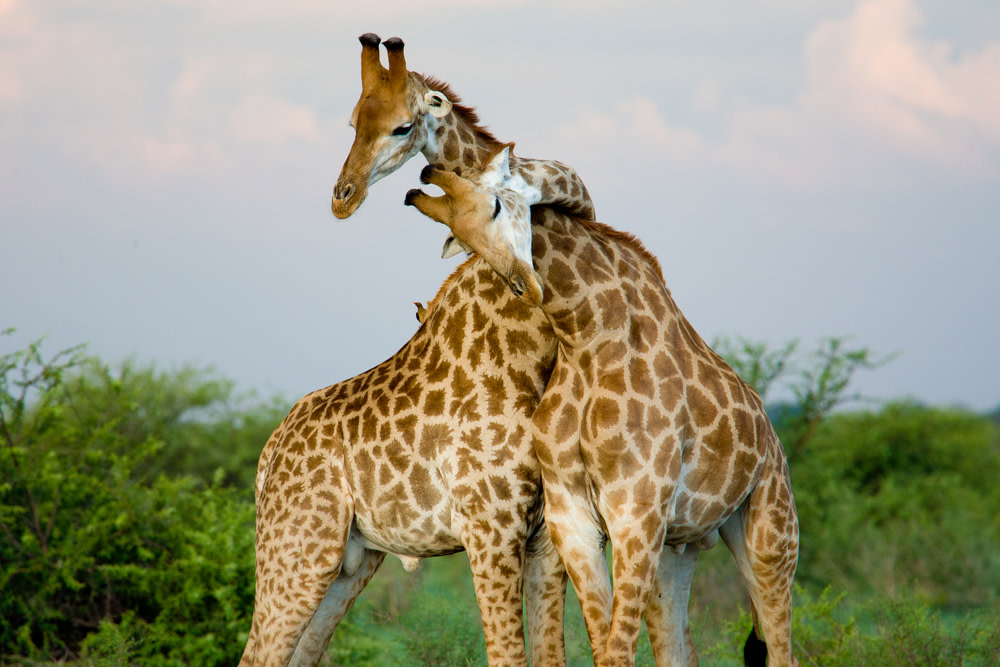
Africa’s emerald savannahs, a thick-maned lion silhouetted against a fiery sunset, elephants meandering by a serene waterhole or the intense gaze of a leopard concealed in the underbrush — these are moments that avid travelers and photographers dream of capturing. Safari photography isn't just about snapping pictures; it's about immortalizing the raw beauty, power and fragility of the wild. And, it offers a unique challenge, melding the unpredictability of wildlife with the nuances of an untamed environment, making safari photography distinct from any other photographic genre. Whether you're preparing for your first luxury safari adventure or seeking to elevate your existing skills, this chapter will guide you through the maze of best practices, camera equipment choices and insights that can transform fleeting encounters into timeless images you’ll treasure forever.
Safari Photography Tips and Techniques
Capturing high-quality images is a must on your luxury safari. They serve as priceless, tangible memories you can showcase in your home and look back fondly on years after your journey. Of course, snapping the perfect photograph of the effervescent African landscape and thriving wildlife is no small feat. No matter if you’re exploring the lush jungles or the sweeping savannah, Africa’s wild landscape is constantly in motion. The sun, shadows and moving creatures can make it difficult — but far from impossible — to take a great photo. All of this is to say that safari photography differs from your typical portrait session. And to help you along, many safari guides are themselves experienced photographers with an in-depth lived knowledge of the hows and whens of wildlife photography. However, you don’t have to be a professional photographer to take stunning pictures on your safari with these tips:
- Let the sun be your storyteller. Lighting can drastically affect your image quality, but there are no ring lights to be found on Safari. Furthermore, flash can appear unnatural and disturb wildlife.
It’s best to let the sun be your guide. The golden hours of dawn and before dusk provide the ideal light conditions for your photography. Embrace the magic of the golden hour as the sun paints the world in an amber palette and find beauty in the shadows.
- Respect the rhythm of the wild. Patience is key on a luxury African safari and the same is true for photographing wildlife. In the canvas of the wild, moments unravel at their own pace and you simply can’t rush nature. You may not get that “perfect shot” on your first day on safari, but you will certainly capture amazing moments and vignettes you didn’t know you were looking for.
The heartbeat of nature should guide your shutter and not be rushed. Each photograph is a testament to your patience and profound connection with the wild.
- Follow the rule of thirds. Simple photography tips can help you capture an impactful image. The rule of thirds is perhaps the most well-known “rule” of composition that helps transform a simple photo into a work of art.
While balance and composition are key, you can also discover new perspectives with your photography. Let nature inspire unique angles and heights in your photography.
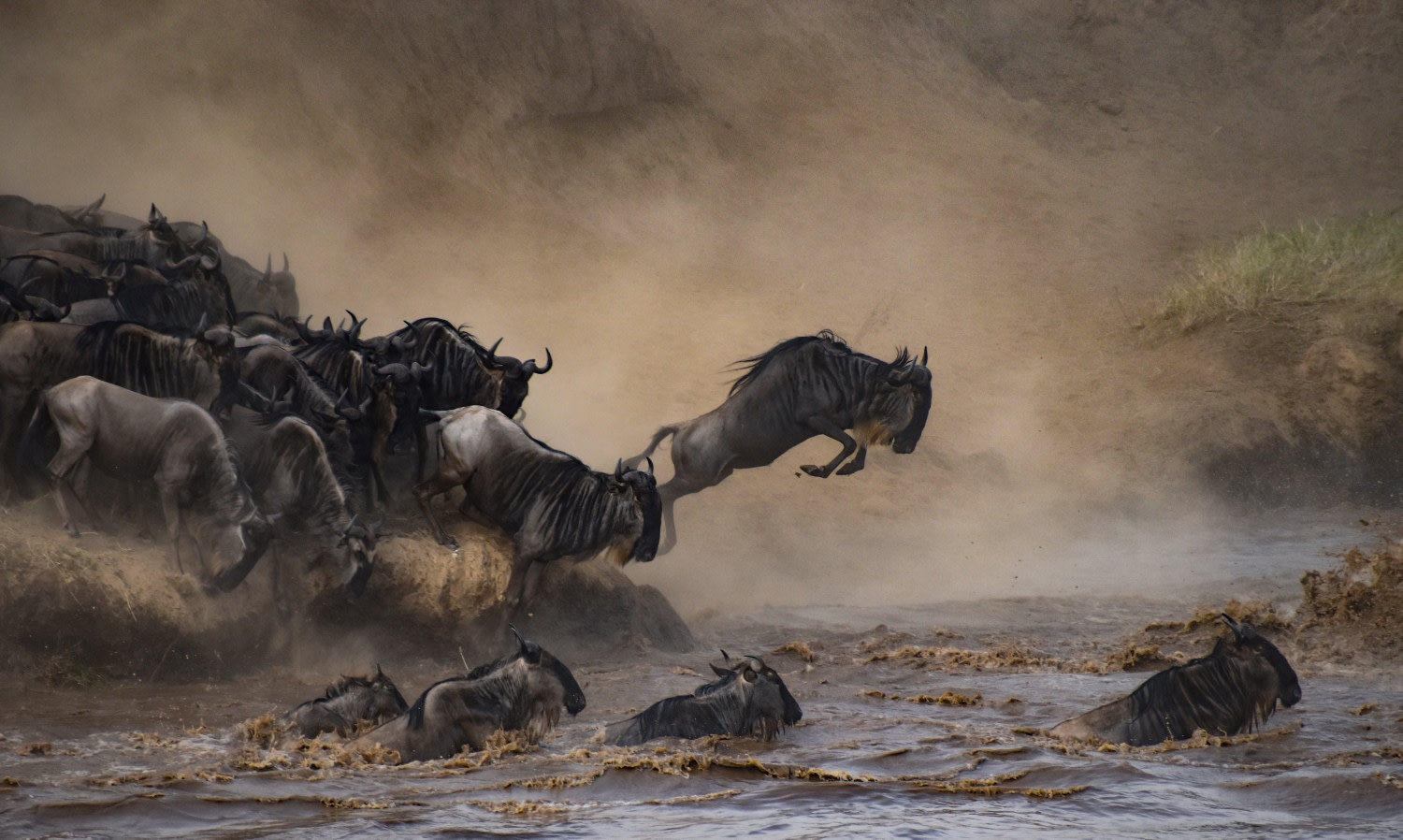
Best Cameras for Safari Photography
When you want to capture the essence of the untamed world, a smartphone, although convenient with a good camera, doesn’t quite do it justice. While you can certainly snap memorable moments on your phone to share with family and friends, nothing compares to a high-quality camera.
For outdoor photography and capturing wildlife in particular, enthusiasts and professionals alike often choose between two types of cameras: DSLRs and Mirrorless. Experts agree both have distinct advantages for taking wildlife photos and can be good options.
DSLR cameras offer fast shutter speeds to capture wildlife on the move. They also tend to be larger and have a longer battery life, ideal for a long day in the bush. However, Mirrorless cameras have come a long way and are often preferred for travelers on the go. They are more compact with an equally fast shutter speed and amazing image quality.
Ultimately, the choice is what you are more comfortable with.
Regardless of the type of camera you choose, keep these tips in mind for capturing the best photographs:
- The best lens for safari photography is a long one. A long lens allows you to capture high-quality images of wildlife from yards away on a game drive. You can switch to a wide-angle lens to better capture sweeping landscapes.
- Fast shutter speeds are a must for capturing moving animals or taking pictures from a moving safari vehicle.
- Get to know your camera settings . Many wildlife photographers consider aperture priority mode the best camera setting for safari photography. This allows you to capture properly exposed images of moving animals more easily while still allowing for a lot of manual control. Settings like autofocus also help immensely.
- To continue preserving priceless moments, you should take care to maintain your camera on safari. Keeping dirt and dust off your lens and preserving battery life is perhaps most important in the bush.
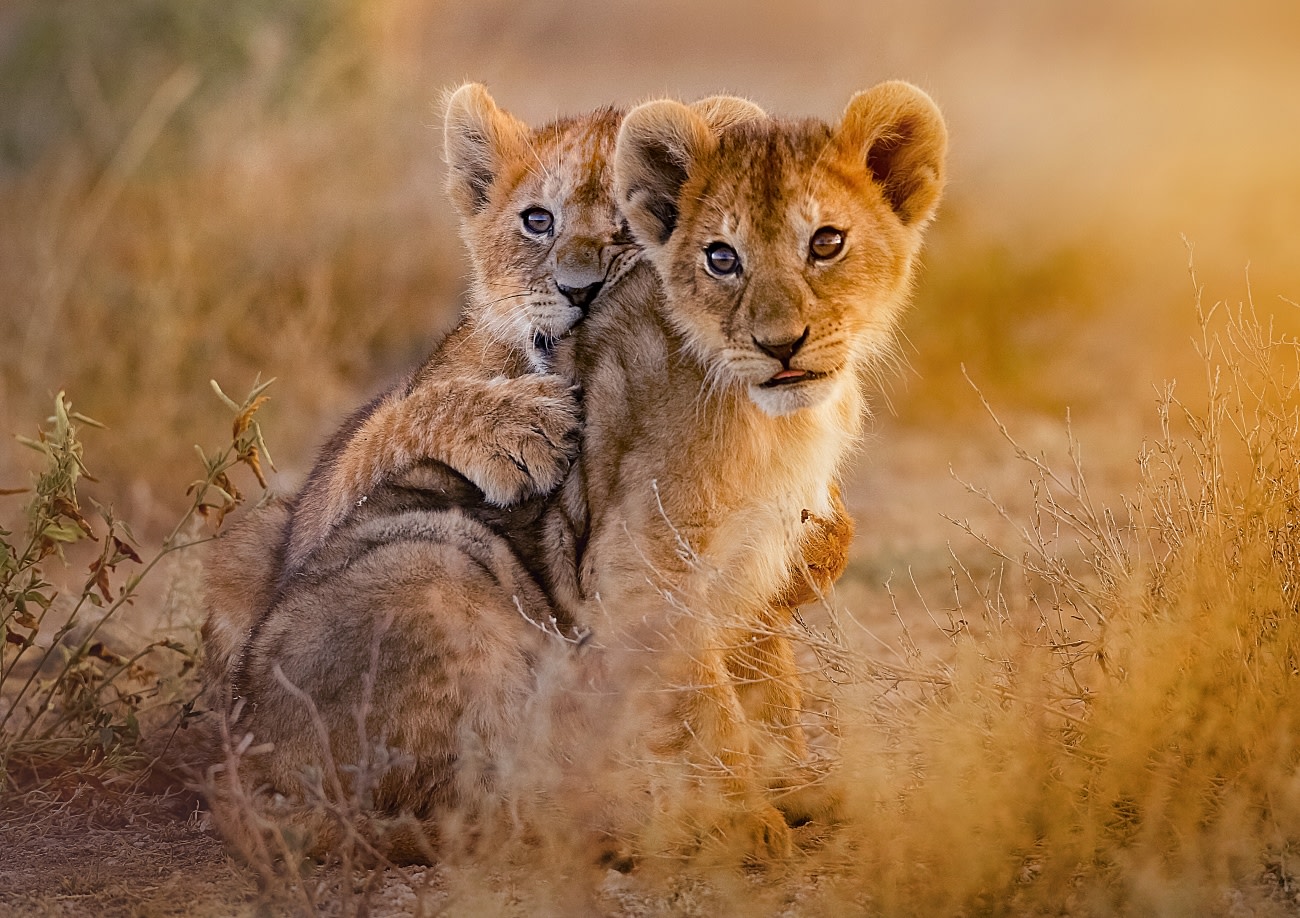
Essential Accessories
Finally, we cannot overlook the importance of the accessories that can elevate your safari photography. While it’s important to pack light for a day in the bush, these few additions can truly transform your images and overall experience.
- Binoculars: A pair of high-quality binos, often provided by your guide on safari, deliver an enhanced view of wildlife from yards away and the opportunity to see colorful birds in detail. This enhanced view allows you to spot the perfect image.
- Tripods and monopods: Stabilize your shots and snap stunning images of sunsets and landscapes. Also ideal for long-exposure images of the stars.
- Camera bags: Protect your equipment from the elements or wandering hands when not in use.
- Filters: Enhance colors and reduce glare during your photography session.
- Spare batteries and memory cards: Be prepared for long shooting sessions on your game drive.
Consider an African Safari Photography Tour
It can feel daunting trying to capture the untamed heart of Africa’s wilderness through the lens. A specialized luxury safari photography tour can help you capture the perfect shot on your trip. On a Tanzania photography safari, you can snap stunning pictures from high above in a hot air balloon. Or, keep things classic on a Kenya photography safari to take action-packed photographs of the Big 5. On a luxury safari photography tour, you will have the time and resources to take priceless images with the help of experienced guides who know the landscape inside out. Explore more of our Kenya photography safaris and more destinations where the opportunity to capture epic images awaits with ROAR AFRICA.
Subscribe to receive the latest updates

Contact Details
Connect with us, press inquiries, general inquiries.


- Find Your Tour
- Heavy Discount
- Enquire / Contact Us
- Send an Inquiry
- Map of Africa
- Contact Details
- African Safari Cost
- Travel Insurance
- Custom Safaris
- All Budget Safaris
- Africa Camping Safaris
- African Safaris for Seniors
- Exclusive Small Group Camping Safaris
- Gorilla Trekking Safaris & Tours
- Lodge Safaris
- Short Stay Tours
- All Overland Tours
- Camping Overland Tours
- Exclusive Overland Safaris
- Lodge Africa Overland Tours
- All Family Safaris
- Family Camping Safaris
- Family Lodge Safaris
- Family Safaris in East Africa
- Family Safaris in Southern Africa
- All Adventure Travel
- Great White Shark Diving
- Walking Safaris & Hiking Tours
- Chobe National Park
- Etosha National Park
- Garden Route
- Kilimanjaro
- Kruger National Park
- Ngorongoro Crater
- Okavango Delta
- Sabi Sands Game Reserve
- Serengeti National Park
- South Luangwa National Park
- Victoria Falls
- Zanzibar Island
- Masai Mara Conservancies
- Namib Desert
- Pilanesberg National Park
- South Africa
- Kingdom of eSwatini
- Dar es Salaam
- Johannesburg
- Livingstone
- Antananarivo
- Port Elizabeth (Gqeberha)
- Adventure Travel & Activities
- Africa Beaches & Islands
- African Animals & Conservation
- African Culture
- Best Things to Do
- Big 5 Safari
- Bucket List Ideas
- Family Safari
- Overland Africa & Budget Safaris
- Places in Africa
- Safari Costs & Budgeting
- Travel Tips & Planning
- Where to See
- Botswana (Okavango Delta +)
- Cape Town + Garden Route
- East Africa
- Kenya (Masai Mara +)
- Kruger + Sabi Sands
- Morocco + Ethiopia
- Namibia (Etosha +)
- Rwanda + Uganda
- South Africa, Lesotho + Eswatini
- Southern Africa
- Tanzania (Zanzibar, Serengeti +)
- Zambia, Zimbabwe + Malawi
- Safari Costs
- Client Reviews

Top Tips for Your Walking Safari in Africa
A walking safari offers a unique and immersive way to experience the African bush. Unlike traditional vehicle-based safaris, walking safaris provide a more intimate way for travellers to connect with nature. In the African bush, on foot, your senses become heightened, colours more vibrant, sounds clearer and smells more intense.
The allure of a walking safari lies in immersion. It's just you and the wild, the primordial thrill of tracking animals on foot, and the unmatched sense of freedom that comes with being free of the trappings of modernity.
Importance of Preparation for a Walking Safari
Every walking safari should be a safe, enjoyable, and enriching experience. Preparation for your walking safari is about knowing what to expect and acting accordingly. It's important to consider things like physical fitness, clothing, and essential items, as well as safety measures and understanding the environment. Taking time to plan, and prepare for, your walking safari will enhance the experience and leave you to relax in the capable hands of your walking safari guide.
In this blog post, we'll delve into the essential aspects of preparation to help you make the most of your walking safari adventure in Africa.

Walking Safari Costs
Breakdown of typical expenses of walking safaris.
The cost of a walking safari depends on many factors. The level of comfort and accommodation style, food and drinks, the size of your group, transport, park fees, guide fees, and the time of year will all affect the cost of your walking safari.
As a rule of thumb, the more remote the destination, the higher the cost. This is due to transport and other logistical expenses required to create successful African walking safaris. Walking safaris can be short (an hour or two), longer (half to full-day), or even multi-day hikes that use fly-camping and remote bush camps. Generally speaking, however, it is possible to do a walking safari as an add-on to your pre-booked safari adventure, meaning it can be done affordably without too much fuss.
One of the most important aspects of your walking safari is your guide. Walking safari guides are highly trained to keep both you and the animals safe while getting you as close to the wild as possible. A good guide will tell you everything you need to know and reveal things you never even thought of about nature, the ecosystem, and the wildlife you encounter. Guide fees will cover these services but a good walking safari guide is worth their weight in elephants and should be tipped handsomely. You can read more about tipping on safari, here .

What to Wear on a Walking Safari
It's no exaggeration to say that the wrong clothing can ruin a walking safari. When walking in the African bush, it is vital to get the right balance between protection and comfort.
The colours you wear are also hugely important as they affect how both insects and wildlife see you. Bearing in mind that your destination will affect your wardrobe – Gorilla trekking in Rwanda presents a different challenge to walking in the Kruger National Park – here are a few things to consider. When packing for a walking safari, choose clothing made from lightweight, breathable materials that provide comfort and functionality in the African bush. If it is hot and dry, you will need to stay cool, but in humid and rainy conditions, you need to dry out as fast as possible.
Consider moisture-wicking fabrics designed to pull moisture away from the skin and keep you cool, even in humid conditions. These fabrics can be found in shirts, pants, and socks.
Long-sleeved shirts and pants are a fantastic barrier against the elements, vegetation, and insects. Wearing a loose-fitting long-sleeved shirt with a collar will give excellent protection against the sun, and keep mosquitoes or tsetse flies at bay.
Trousers will offer protection from the sun and insects, but will also guard against thorn bushes and other scratchy vegetation on walking safaris. It helps to wear clothing with an Ultraviolet Protection Factor (UPF) for added sun protection.
Choosing neutral colours is important in the bush for several reasons. While on a walking safari, you want to blend in as much as possible. Loud, bright colours frighten or agitate wildlife and attract insects like bees and wasps. Rather stick to khakis, greens, subdued browns and beige which all blend naturally with the surroundings.
Stay away from white, which gets dirty quickly, and black which is a favourite of mosquitoes and some flies.
A wide-brimmed hat that will shade your face, ears, and neck is a must. Having a chin strap can also be handy if conditions get windy or when passing under thorn bushes and trees.
Good footwear is essential. Depending on the length of your walking safari, a pair of comfortable trainers or sturdy hiking boots is important. Closed shoes will protect your feet and give you better traction when navigating uneven surfaces like rock, gravel, and sand. Be sure to break them in before your walking safari to avoid blisters and discomfort. Moisture-wicking socks will help keep your feet dry and prevent blisters. Consider bringing a spare pair to change into during the day if needed.
Dressing in layers allows you to adjust your clothing according to changing temperatures throughout the day. Bring a lightweight, waterproof jacket or fleece for cooler mornings or evenings. In addition to layering your clothing, consider convertible pants that can be zipped off into shorts for versatility in changing weather conditions or activities. Similarly, convertible shirts with roll-up sleeves offer adaptability throughout the day. Being flexible when on the go will ensure your comfort in any weather.
On a walking safari, you want to prioritize comfort, protection, and functionality. Being well-prepared and selecting the right clothing will allow you to enjoy your walking safari to the fullest while staying comfortable and safe in the African wilderness.

*A note on Photography: On a walking safari, you may get more out of the experience without the burden of a camera. Photographic equipment can be cumbersome. Ensure that your guide is aware of your intentions and that you are walking with a group that shares your enthusiasm for photography. If you are an avid photographer, consider booking a photography-specific safari.
Efficient packing is essential for a successful walking safari. To maximize space and minimize bulk, opt for lightweight, quick-drying clothing that can be layered for warmth or ventilation as needed. Roll your clothes instead of folding them to save space in your luggage and prevent wrinkles. Utilize packing cubes or compression bags to organize and compress your clothing, allowing you to fit more items into your bag while keeping them easily accessible. Choose versatile items that serve multiple purposes, such as convertible pants or a multifunctional scarf. Remember to pack travel-sized toiletries and only bring the essentials to avoid unnecessary weight. Prioritize items based on their importance and versatility, leaving behind anything you can live without.

Walking Safari Safety Precautions and Health Considerations
When embarking on a walking safari in the African wilderness, safety is paramount. Unlike traditional game drives, where the safety of a vehicle provides a barrier between wildlife and humans, walking safaris involve direct interaction with the natural environment and its inhabitants. Therefore, adhering to strict safety measures is crucial to mitigate potential risks and ensure a memorable and incident-free experience.
The most important thing when on a walking safari is to listen to your guide. Field guides are specially trained to read tracks, the behaviour of animals, and to navigate safely through the bush. They will give you clear instructions on what to do and what not to do. Trust their skills and expertise to keep you safe and to get you the best wildlife sightings. If a guide issues instructions in the field, respond quickly and calmly.
Walking safaris are surprisingly safe. Following the instructions of your guide, respecting the animals and the environment, and staying open and aware of your surroundings, will ensure both your safety and an incredible walking safari experience.

Choosing the Right Walking Safari Destination
Africa has a plethora of exceptional walking safari destinations that range from the accessible Kruger National Park in South Africa to Botswana’s Okavango Delta, and the home of the walking safari, South Luangwa in Zambia. How do you choose the right walking safari destination for you?
Factors to Consider When Selecting a Walking Safari Destination
Wildlife .
When choosing where to go for your walking safari, start by considering what wildlife you’d like to see. The Big 5, leopards, elephants, and lions, rare species like rhinos or gorillas, or a specific event like the Great Wildebeest Migration in the Serengeti, whatever your choice, will inform your walking safari destination.
Safari Destination
Once you have chosen what sort of wildlife you’d like to encounter, your walking safari destination options will be self-evident. For gorilla trekking , head to East Africa Rwanda, Uganda, or the DRC. If you are after the Big 5, nowhere is better than the Kruger National Park or the private reserves of Greater Kruger like Sabi Sands in South Africa. For elephants and all-around wilderness appeal, the Okavango Delta in Botswana is best. For the best classical walking safari in Africa, head to Zambia’s South Luangwa National Park for an epic off-the-beaten-track experience.
For top walking safari options see Where to Go & When to See the Wildlife of Africa on Foot
Safety and Seasonality
You know what animals you want to see, and which destinations are best, now it's time to examine some other factors like safety and seasonality. Rwanda, Uganda, and DRC, for example, all offer excellent gorilla trekking experiences. The DRC, however, has been mired in political conflict for decades. Rwanda and Uganda offer a safer option with less risk. Seasonality is also important. Taking a Zambia walking safari in South Luangwa in the peak wet season from November to April – which is also the hottest time of year – is nobody’s idea of fun. As a rule of thumb, walking safaris will be better in the drier winter months when vegetation is dry and sparse and animals are easier to see.
Travel Budget
Once you have narrowed your walking safari options down, it is time to get down to the budgeting nitty-gritty. Your budget will have a big impact on your choice of walking safari destination. East Africa is as a rule more expensive than Southern Africa because it is priced in US$ instead of the local currencies. More remote locations will be more expensive. Places like Botswana have looked at high-end, low-impact safari tourism, and budget options have only recently come into vogue. Similarly, the remoteness of some of Zambia’s national parks, means that Zambia is a more expensive option. For gorilla trekking, Uganda offers more affordable options than Rwanda. South Africa, being a major travel hub with extensive infrastructure and plenty of accommodation options, is still one of the most budget-friendly safari destinations in Africa.

Ready to Book Your African Walking Safari?
Walking safaris make for a thrilling African adventure. Now that you have a better idea about your walking safari options, it’s time to get down to specifics. Talk to one of our African safari consultants. They are experienced and ready to help you find the walking safari that is perfect for both you and your budget.
Talk to us today and let us take you there
Andrew Hofmeyr Naturalist, Artist & Writer

Related Destinations
Explore these destinations mentioned in this post.

Volcanoes National Park

Bwindi National Park

Private Group?
A private, tailor-made safari is within your reach. Experience all of your bucket-list safari related items on a budget now.
Similar & Related Blog Posts
Below you'll find further reading and articles related or similar to this post.

6 Reasons to Enjoy a Zambia Safari in South Luangwa National Park
As one of Africa’s best safari destinations, the reasons to enjoy a Zambia safari in South Luangwa National Park are plentiful! Undoubtedly one of…

8 of the Best Zambia Safari Destinations for wild African Safaris
Famous for walking safaris, and with 20 national parks, Zambia has plenty of safari destinations to choose from. However, years of poaching and mismanagement…

Budget Zambia: How Much Does a Zambia Safari Cost?
Zambia is one of southern Africa’s less talked about safari destinations. The safari parks in Zambia do not have the same reputation as Serengeti,…

Africa Walking Safari: the Guide to exploring Southern Africa on foot
Nothing beats experiencing Africa on foot. Walking safaris and hiking trips are two of the best ways to experience the African bush and scenic wilderness…

Will I see the Big 5 of Africa On My Walking Safari?
‘Will I see the Big Five of Africa on a walking safari?’ This is a question we are often asked. The answer: ‘Maybe, but only if…

Zambia Walking Safari: When to Go and When Not to Go?
Are you looking for a unique way to experience nature and wildlife up close? Look no further. A Zambia walking safari is one of the best ways…

Top 7 African Walking Safaris: Where to Go & When to See the Wildlife of Africa on Foot
Are you looking for an unforgettable adventure in the heart of the world’s most epic continent? Then you can't beat African walking safaris!…

Plan your Affordable Botswana Safari in 7 Easy Steps
With so many magnificent wildlife areas to choose from, planning a Botswana Safari requires some difficult choices. Luckily it's…

Top tips for your Okavango Delta safari in Botswana
The Okavango Delta is a huge, untouched floodplain on the northern border of Botswana. At the top of many African safari bucket lists, the Delta is…

The Fascinating African Culture of Botswana, its People and Totems
When it comes to African culture, Botswana is a rich and intriguing destination. The people of Botswana are collectively referred to as Batswana or Motswana…

The ancient Botswana zebra migration is back in full swing - catch it on safari now!
The Botswana zebra migration, at around a thousand kilometres, is the longest mammal migration in Africa. While the Great Wildebeest Migration of…
__medium.jpeg)
Top Travel Tips: 10 Things to Do Before Your Safari in Botswana
Our useful checklist of 10 things to do before you go on your safari in Botswana. Once you've booked your Botswana safari you can use this list…
These trips cover similar ground…

15 Day Zambia & Zimbabwe Safari - Livingstone to Victoria Falls
This budget Zambia & Zimbabwe Safari is a camping tour from Victoria Falls (Livingstone) to Lower Zambezi, Hwange National Park, Great Zimbabwe Ruins and…

16 Day Zambia & Malawi Safari (Small Group Tour)
This Zambia & Malawi Safari (small group tour) explores South Luangwa National Park, Mulanje Massif, Liwonde Park, Lake Malawi, and the Zambezi River by…

8 Day Zambia Walking Safari in South Luangwa Valley
A truly wild Zambia Walking Safari to South Luangwa Valley Tented Camps combining expertly guided bush walks and 4x4 game drives in South Luangwa National…

9 Day Zambia Safari in South Luangwa National Park
The ultimate 9-Day Zambia Safari in South Luangwa National Park for the best Zambia walking safaris and thrilling game drives at treehouse and luxury bush…

3 Day Kruger Walking Safari to Klaserie Private Game Reserve
A unique budget Kruger Walking Safari offering full-length morning bush walks in Greater Kruger Park's Klaserie Private Game Reserve. This Kruger Safari…

4 Day Kruger Safari - Walking & Camping Safari
An expertly guided, Kruger Safari, walking and camping in a Private Game Reserve of Greater Kruger Park. This unique mobile bush camping safari explores…

Connect with us
Useful resources.
- Get Travel Insurance
- Book Flights
- Get Car Hire
- Signup for our newsletter
Popular Destinations
Latest blogs.
- How to plan an African safari on a very tight budget: the 8-step guide to safari planning
- The 10 Safest Countries in Africa to Visit (2022 Global Peace Index Rankings)
- Best Countries to Visit in Africa? Here are 15 Amazing African Countries
- South Africa Tipping Etiquette: 8 Top Tips for Tipping in South Africa
- How Much Does an African Safari Cost? Your Budget Africa Safari Guide

Call us toll free from US/Canada on 1-888-414-6513 , or from the UK on 0-808-189-1052 . All other countries can contact us on +27 21 791 0878 .
© 2024 African Budget Safaris | Privacy | Terms
Help Center
Speak to an expert 24/7
(844) 450-1133

Across Africa, Part 1: 10 Unmissable Sub-Saharan Travel Destinations
Daria Bulatovych
Embark on a journey through the wonders of Africa! With its rich tapestry of landscapes, cultures, and adventures, this vast continent offers an unparalleled array of travel experiences. Divided into Sub-Saharan Africa, North Africa, and Southern Africa, each region boasts its own unique charm and allure. We’ve already penned the Part 2 article on North Africa , showcasing breathtaking destinations that offer incredible diving, archaeological, historical, cultural, and scenic travel experiences.
Today, we set our sights on Sub-Saharan Africa, a realm brimming with extraordinary opportunities for exploration and discovery:
- Explore our FAQ section to see if this vibrant region resonates with your travel interests.
- Uncover the top destinations awaiting your discovery within Sub-Saharan Africa.
- Discover vital pre-travel info: safety, money-related, transportation, and other tips.
Table of Contents

Common Queries Before Traveling to Sub Saharan Countries in Africa:
What is Sub-Saharan Africa? This is the region of the African continent that lies south of the Sahara Desert. It encompasses a diverse range of countries and ecosystems, including savannas, rainforests, deserts, and coastal areas.
How many countries are in Sub Saharan Africa? The region has 48 countries, including low-income ones like Malawi, Ethiopia, Madagascar, Rwanda, and Tanzania, as well as lower-middle-income ones like Kenya and Nigeria. It also has upper-middle-income nations like South Africa, Namibia, and Botswana, all providing great travel experiences covered in this article.
What are US citizens’ entry requirements? A US passport is necessary for travel to all African countries. Many sub-Saharan African nations require US citizens to get a visa. Do it beforehand, as obtaining a visa en route can be challenging or impossible. Arriving without a visa may result in denial of entry. Apply for a visa well in advance, with an average of two weeks recommended for each visa application. The embassy or consulate of the destination country is a reliable source for visa and entry requirements. Alternatively, you can use reputable visa-assistance services like VisaHQ . Learn general visa-related information for US citizens and how to easily use VisaHQ in this blog post .
What are the most interesting places to visit in Sub-Saharan Africa? The region offers diverse and captivating destinations to explore, from iconic wildlife havens like Serengeti National Park and Maasai Mara National Reserve to the majestic Kilimanjaro. City enthusiasts will enjoy Cape Town’s offerings, while Sossusvlei beckons Instagram-photo hunters. Explore each of these attractions further in this post.
Which country to choose? To make an informed decision, it’s crucial to consider three key factors:
- First-time in Africa? If so, choose destinations with robust tourist infrastructure like South Africa or Kenya. For seasoned travelers, nearly every country is an option, except those in conflict zones or with health risks. They include Democratic Republic of the Congo, South Sudan, Somalia, and Mali.
- What weather type are you? In the region, the climate varies significantly. It’s typically extremely hot and dry throughout the year in the north (e.g., Namibia and Botswana). Rainfall is abundant, leading to high humidity and warm temperatures year-round in the central and equatorial regions (e.g., Madagascar and Rwanda). In more temperate climates like South Africa and Malawi, there are distinct seasons, with hot summers and colder winters, along with moderate rainfall patterns.
- What type of vacation do you prefer? Consider the following destinations based on your interests. Botswana – for wildlife seekers. Ethiopia and Nigeria – for history enthusiasts. Namibia, Malawi, and Madagascar – for nature landscape enthusiasts. Want a three-in-one experience? No problem! Travel to South Africa, Kenya, and Tanzania. Combine wildlife viewing, cultural experiences, and relax on the beautiful beaches.
What to pack to travel to Sub-Saharan Africa? Essential items to pack for your African adventure include binoculars for wildlife spotting, lightweight cotton t-shirts, swimwear, and shorts. Remember, Africa’s weather can vary, so pack layers such as a waterproof rain jacket, thermals, long trousers, and woolen jumpers for colder temperatures, especially during winter when it can drop below freezing. Additionally, dress modestly to respect local customs and avoid drawing unnecessary attention to yourself, considering the prevalence of poverty in many areas.

Read also: Your Guide to Budget-Friendly and Comfortable Air Travel with Airlines Operating in the US
Top 10 Sub-Saharan Africa’s Travel Destinations
Choose to travel to Nigeria if you prefer:
- Vibrant city life. Nigeria boasts dynamic cities such as Lagos, Abuja, and Port Harcourt, known for their bustling markets, vibrant nightlife, and modern amenities.
- Wildlife gems. Explore national parks and reserves, such as Yankari National Park, home to diverse wildlife species.
- Historical sites. Nigeria is home to ancient civilizations and historical landmarks. They include the UNESCO World Heritage Site of Sukur Cultural Landscape and the historic city of Benin.
General info:
- Visa requirements: US citizens need a visa
- Official language: English
- Currency: Naira
- Weather: tropical climate, wet and dry seasons
- Main travel hub: Lagos, Nigeria’s largest city
From Lagos, travelers can easily access by a variety of transportation options:
- Abeokuta: This city is renowned for Olumo Rock and other historic sites.
- Badagry: This coastal town is known for its role in the transatlantic slave trade and historic landmarks.
- Ibadan: Nigeria’s largest city by geographical area, with cultural sites and landmarks.
- Osun-Osogbo Sacred Grove: A UNESCO World Heritage Site known for its sacred forest and annual Osun-Osogbo festival.
- Idanre Hills: Famous for its scenic beauty and cultural significance.
- Lekki Conservation Centre: A nature reserve in Lagos, home to diverse wildlife and a canopy walkway.
2. South Africa
Choose to travel to South Africa if you prefer:
- Comfortable travel. South Africa boasts well-developed infrastructure. This includes modern airports, transportation, roads, and accommodation options.
- Diverse attractions. Enjoy vibrant Cape Town and Johannesburg, iconic landmarks like Table Mountain and Robben Island, stunning coastlines for beach relaxation, wildlife safaris in Kruger National Park, and wine tours in Stellenbosch and Franschhoek.
- Ease of travel. South Africa’s tourism industry is well-established and tourist services are readily available.
- Visa requirements: US citizens are allowed stays up to 90 days without a visa
- Currency: South African Rand
- Weather: Varied climate with dry and wet seasons
- Main travel hub: Johannesburg, South Africa’s largest city
From Johannesburg, travelers can easily fly to:
- Cape Town: Known for landmarks like Table Mountain and Cape Point.
- Kruger National Park: Home to diverse wildlife, including the Big Five.
- Durban: A coastal city with stunning beaches, cultural diversity, and exquisite cuisine.
Destinations reachable by road travel:
- Garden Route: A scenic coastal stretch along the southeastern coast of South Africa, offering picturesque landscapes, charming towns, outdoor adventures, and wildlife encounters.
- Pilanesberg National Park: A malaria-free wildlife reserve, offering safari experiences and opportunities to see the Big Five.
- Drakensberg Mountains: A stunning mountain range offering breathtaking scenery, hiking trails, and outdoor adventures.

Choose to travel to Kenya if you prefer:
- Wildlife safari. Kenya is home to some of Africa’s most famous national parks and reserves, including the Maasai Mara and Amboseli National Park.
- Kenya migration safari. It’s an awe-inspiring natural phenomenon where millions of wildebeest, zebras, and other animals migrate across the Serengeti-Mara ecosystem. To witness the migration, plan your visit from July to October.
- Versatile travel experience. From admiring iconic Mount Kilimanjaro and Rift Valley, to hot air balloon safaris, hiking, camel trekking, and swimming in coastal areas like Diani Beach.
- Visa requirements: US citizens must get an Electronic Travel Authorization
- Currency: Kenyan Shilling
- Main travel hub: Nairobi, Kenya’s largest city
From Nairobi, travelers can easily access by a variety of transportation options:
- Amboseli National Park: Known for its stunning views of Mount Kilimanjaro and large herds of elephants.
- Maasai Mara National Reserve: One of the most famous safari destinations in Africa, known for its abundant wildlife and the annual Great Migration Safari.
- Lake Nakuru National Park: Famous for its flamingos, rhinos, and other wildlife species.
- Tsavo National Parks: The largest national parks in Kenya, known for their diverse landscapes and wildlife.
- Mount Kenya National Park: Home to the second-highest peak in Africa, Mount Kenya.
- Nairobi National Park that offers a chance to see lions, giraffes, and rhinos against the backdrop of the city skyline.
4. Tanzania
Choose to travel to Tanzania if you prefer:
- Tanzania’s great migration and safari adventures. Tanzania is home to world-renowned safari destinations such as the Serengeti National Park, Ngorongoro Crater, and Tarangire National Park. Witness the Big Five and the Great Wildebeest Migration, best observed from July to October.
- Unique wildlife. Tanzania is also home to chimpanzees in Gombe Stream and Mahale Mountains National Parks, and the tree-climbing lions of Lake Manyara National Park.
- Beach bliss. Tanzania’s coastline, including the island of Zanzibar, offers pristine beaches, crystal-clear waters, and opportunities for snorkeling, diving, and relaxation in tropical paradise settings.
- Visa requirements: US citizens need a 3-month visa, available on arrival or in advance
- Currency: Tanzanian Shilling
- Main travel hub: Dar es Salaam, Tanzania’s largest city
From Dar es Salaam, travelers can easily travel by road, boat, or flight to:
- Mikumi National Park that offers opportunities for wildlife safaris and is known for its diverse wildlife, including lions, elephants, and giraffes.
- Selous Game Reserve that offers excellent game viewing opportunities, including boat safaris along the Rufiji River.
- Bagamoyo , a historic coastal town with UNESCO World Heritage Site status.
- Saadani National Park offers views of wildlife such as lions, elephants, and hippos against a backdrop of Indian Ocean beaches.
- Zanzibar with its stunning beaches, historic Stone Town, and vibrant culture.
- Kilwa Kisiwani: This ancient Swahili settlement is a UNESCO World Heritage Site.

5. Ethiopia
Choose to travel to Ethiopia if you prefer:
- Off-the-beaten-path experiences. Ethiopia offers unique experiences that appeal to adventurous travelers seeking authenticity and cultural immersion. For example, visiting the Danakil Depression, a geological marvel characterized by its otherworldly landscapes, offers a truly unforgettable experience.
- Historical attractions. Explore ancient civilizations, rock-hewn churches of Lalibela, ancient obelisks of Axum, and the historic city of Gondar.
- Unique landscapes. Admire Simien Mountains, Danakil Depression, and the Rift Valley, offering stunning scenery and outdoor adventures.
- Visa requirements: US citizens need to obtain an e-visa in advance
- Official language: Amharic (most Ethiopians speak some English)
- Currency: Ethiopian Birr
- Main travel hub: Addis Ababa, Ethiopia’s largest city
From Addis Ababa, travelers can easily access by road or flight:
- Lalibela: a famous rock-hewn church and also a UNESCO World Heritage Site.
- Bahir Dar: this city offers ancient monasteries, boat lake trips, and a bustling market.
- The Blue Nile Falls: these waterfalls are a famous Ethiopia’s natural attraction.
- Gondar: this city is known for its medieval castles and churches.
- Awash National Park: it offers wildlife viewing and beautiful landscapes.
6. Madagascar
Choose to travel to Madagascar if you prefer:
- Unique biodiversity. Many plant and animal species found nowhere else on Earth, including lemurs, baobab trees, and chameleons.
- Landscape diversity. From lush rainforests and pristine beaches to spiny forests and otherworldly rock formations.
- Adventurous travel. Madagascar offers a wide range of outdoor activities, including hiking, trekking, snorkeling, diving, and wildlife spotting. Explore national parks, dive in coral reefs, and relax on remote beaches!
- Visa requirements: US citizens need to obtain a visa in advance or on arrival
- Official language: Malagasy & French (English is not widely spoken)
- Currency: Malagasy Ariary
- Weather: Varied climates with notable wet seasons and significant rainfall
- Main travel hub: Antananarivo, Madagascar’s largest city
From Antananarivo, travelers can easily access by road:
- Andasibe-Mantadia National Park , known for its lush rainforests and diverse wildlife, including lemurs.
- Antsirabe , a charming town known for its thermal springs, colonial architecture, and artisanal workshops.
- Ranomafana National Park , famous for its biodiversity and the chance to see rare species of lemurs, chameleons, and frogs.
- Morondava , a coastal city known for its stunning Avenue of the Baobabs and nearby Kirindy Forest.
- Andringitra National Park , offering spectacular mountain landscapes, hiking trails, and the opportunity to see endemic wildlife.

Choose to travel to Malawi if you prefer:
- Scenic landscapes. Malawi’s diverse landscapes include Lake Malawi, lush forests, rolling hills, and picturesque tea plantations. Visitors can explore national parks, home to diverse wildlife, including elephants, hippos, and antelopes.
- Cultural experiences. Malawi has a rich cultural heritage with vibrant traditional music, dance, and art. Visit rural villages, attend cultural festivals, and interact with friendly locals.
- Affordability. Compared to some other African destinations, Malawi offers relatively affordable travel options, including accommodation, food, and transportation.
- Currency: Malawian Kwacha
- Main travel hub: Lilongwe, Malawi’s capital
From Lilongwe, travelers can easily access by a variety of transportation options:
- Liwonde National Park: Enjoy game drives, boat safaris, and walking safaris to see elephants, hippos, crocodiles, and a variety of bird species.
- Zomba Plateau: Explore the plateau’s forests, streams, rock pools, and the historic Zomba town nearby.
- Lake Malawi National Park: This UNESCO World Heritage Site encompasses a portion of Lake Malawi’s shoreline and islands, including the picturesque Likoma Island and Chizumulu Island.
Choose to travel to Namibia if you prefer:
- Unique landscapes. Namibia boasts the Namib Desert, the world’s oldest desert, with towering sand dunes at Sossusvlei; the otherworldly landscapes of Damaraland; and the rugged beauty of the Skeleton Coast.
- Wildlife and safari. The country offers excellent wildlife viewing opportunities, including the chance to see desert-adapted species such as elephants, rhinos, lions, and giraffes.
- Remote and off-the-beaten-path. Want to escape the crowds and connect with nature? Choose Namibia! Compared to some other African destinations, this country offers vast stretches of wilderness and a sense of remoteness and solitude.
- Currency: Namibian Dollar (NAD)
- Weather: Varied climate with dry and wet seasons, mainly arid or semi-arid
- Main travel hub: Windhoek, Namibia’s capital
From Windhoek, travelers can easily access by a variety of transportation options:
- Sossusvlei and Namib-Naukluft National Park: Known for its towering red sand dunes, especially at Deadvlei and Dune 45, Sossusvlei is a must-visit destination in Namibia.
- Swakopmund: This coastal town offers a blend of German colonial architecture, adventure activities, and stunning seaside landscapes. Visitors can enjoy sandboarding, quad biking, and dolphin cruises, and explore nearby attractions like the Skeleton Coast and Walvis Bay.
- Etosha National Park: One of Africa’s premier wildlife reserves, Etosha National Park is home to a wide variety of animals, including elephants, lions, giraffes, and rhinos.

9. Botswana
Choose to travel to Botswana if you prefer:
- Wildlife and safari. Experience some of Africa’s best wildlife viewing opportunities, including sightings of elephants, lions, leopards, buffalo, and numerous bird species.
- Cultural encounters. Botswana is home to diverse ethnic groups, including the San (Bushmen), Herero, and Batswana, each with their own unique cultures, traditions, and lifestyles. Learn about traditional customs, arts, and crafts, and participate in cultural experiences such as village visits and storytelling sessions.
- Remote and untouched wilderness. From the unique vast salt pans of the Makgadikgadi to the rugged beauty of the Kalahari Desert, Botswana’s landscapes are non-pop, diverse, and awe-inspiring.
- Currency: Botswana Pula (BWP)
- Main travel hub: Gaborone, Botswana’s capital
From Gaborone, travelers can easily access by a variety of transportation options:
- Chobe National Park , famous for its vast elephant herds and diverse wildlife, including lions, leopards, and hippos.
- Moremi Game and Mokolodi Nature Reserves allow for spotting great landscapes and a wide variety of animals, including elephants, buffalo, giraffes, and numerous bird species.
- Kgalagadi Transfrontier Park is known for its vast wilderness and desert-adapted wildlife, including lions, cheetahs, and gemsboks.
Choose to travel to Rwanda if you prefer:
- Mountain gorilla trekking. Rwanda is one of the best places in the world for mountain gorilla trekking, enabling us to see these endangered primates up close in their natural habitat.
- Breathtaking landscapes. Despite its small size, Rwanda boasts stunning landscapes, including lush rainforests, rolling hills, and serene lakes. Enjoy scenic drives, hiking trails, and boat cruises.
- Efficient infrastructure. Rwanda boasts modern roads, reliable transportation, and high-quality accommodations. You can explore the country comfortably and safely, with options for guided tours and self-drive adventures.
- Official language: Kinyarwanda, French, English
- Currency: Rwandan Franc (RWF)
- Main travel hub: Kigali, Rwanda’s capital
From Kigali, travelers can easily access by a variety of transportation options:
- Volcanoes National and Nyungwe Forest National Parks are famous for gorilla, chimpanzee, and golden monkey trekking, birdwatching, and scenic hikes.
- Lake Kivu offers boat cruises, kayaking, swimming, and relaxation on its scenic shores.
- Akagera National Park is known for its diverse wildlife, including elephants, lions, giraffes, zebras, and antelopes.

Read also: Benefits of Ovago Customer Service: 10 Reasons to Book With Us
General Sub-Saharan Africa’s Travel Tips:
- Safety. Limit outdoor activities to daylight hours and avoid carrying valuables in your pockets to reduce the risk of pickpocketing, a common occurrence in many African cities. Be cautious of strangers offering tempting suggestions, as they may be scams aimed at extracting money. Get vaccinated before traveling to certain African countries and to check for health hazards at your destination before your trip.
- Transportation. For efficient travel, conduct thorough online research before your journey to minimize waiting times at bus stations. Choose your transportation method based on your preferences, budget, and time constraints. In many African countries, various transportation options are available, including motorcycle taxis like Boda-Boda and Okada. Besides saving time, riding these taxis offers a captivating way to experience Africa’s vibrant urban environment.
- Flights. Airfare to Africa can often come with a hefty price tag, but with Ovago’s budget-friendly flight options , you’ll have extra cash to splurge on exciting activities and unforgettable safaris during your trip.
- Money-related tips. Consider bargaining when booking safari trips. Travel agencies often inflate prices, so it’s wise to compare offers from multiple agencies and negotiate for a lower rate. For handling money, ATMs are increasingly available in urban areas, but carry enough cash for remote countryside journeys. Banks offer the best exchange rates, so exchange money there. If needed, withdraw only a minimal amount at the airport and wait for better options elsewhere.
Embark on an unforgettable journey through Sub-Saharan Africa’s diverse landscapes and cultures! With Ovago’s affordable flight options , you’ll have more to spend on thrilling activities and safaris. Experience the wonders of Africa without breaking the bank.
Last Updated
Articles you might like

Get Ready for the Best Black Friday Flight Deals Ever!
Get Ready for the Best Black Friday Flight Deals Ever! The day after Thanksgiving is known for blowout deals on TVs, toys, and tech gadgets. But recently, some of the best Black Friday steals have been on airline tickets for international travel. This year, Ovago is offering unbelievable Black Friday flight deals to destinations around…

February 2024: The US Local Event Digest
It’s time to celebrate the season with a dazzling array of local February events As winter wraps the country in a snowy embrace, February brings a cascade of vibrant events to chase away the cold and infuse the season with warmth and festivity. Let’s plan a journey across the United States! Choose your unique destination…

Crafting Your Exhilarating Journey to Rio Carnival 2024
Get ready to experience the world’s most considerable extravaganza at Rio Carnival 2024. This event promises an unforgettable week-long celebration, from mesmerizing parades to vibrant parties. Learn how to secure tickets, find the best accommodations, plan activities and itineraries, and more in this comprehensive guide.
Get deals you won’t see anywhere else!
Subscribe to our newsletter and get the best airfare offers
Exclusive Deals
Promo Codes
Check your email to confirm subscription!
Already subscribed. Look for deals!
Oops, something went wrong. Please try again.
By providing your email you consent to receive occasional promotional Emails from us
- Tanzania Tourism
- Tanzania Hotels
- Tanzania Bed and Breakfast
- Tanzania Vacation Rentals
- Flights to Tanzania
- Tanzania Restaurants
- Things to Do in Tanzania
- Tanzania Travel Forum
- Tanzania Photos
- All Tanzania Hotels
- Tanzania Hotel Deals
- Last Minute Hotels in Tanzania
- Things to Do
- Restaurants
- Vacation Rentals
- Travel Stories
- Rental Cars
- Add a Place
- Travel Forum
- Travelers' Choice
- Help Center
Spending money, tips and cloth on safari and Kilimanjaro - Tanzania Forum
- Africa
- Tanzania
Spending money, tips and cloth on safari and Kilimanjaro
- United States Forums
- Europe Forums
- Canada Forums
- Asia Forums
- Central America Forums
- Africa Forums
- Caribbean Forums
- Mexico Forums
- South Pacific Forums
- South America Forums
- Middle East Forums
- Honeymoons and Romance
- Business Travel
- Train Travel
- Traveling With Disabilities
- Tripadvisor Support
- Solo Travel
- Bargain Travel
- Timeshares / Vacation Rentals
- Africa forums
- Tanzania forum

5 replies to this topic

Hotels and camps or lodge with tip box where all staff will share at end
Each Tour company/operator with terms and conditions of Tipping guidelines for they clients

As for tipping, as Safari Eyes says you can use US dollars with people in the tourism industry, or if you prefer you can use Tanzania shillings. So Kilimanjaro guides, porters etc. and safari guides are happy to take dollars or shiilings. Most safari lodges have a staff box where you can use dollars or shillings.
If you go out to local bars or restaurants in Moshi or Maragu, or if there's someone you'd like to tip who's not involved with tourism, you'll probably want to use Tanzania shillings.
As for wardrobe, you absolutely don't need to buy stuff. Wear what's comfortable. Jeans aren't such a good idea because they take a long time to dry. For the "girls" on safari, make sure you bring something warm, since it can get chilly at night — as cold as 8 or 9 degrees C on the rim of Ngorongoro Crater .

If you scroll down below you will see a search box where you can search for previous posts.
You will want to get some local Tanzanian Schillings from an ATM to use for smaller purchases and tips. Your safari you should arrange and pay for ahead of time.
For clothes I liked lightweight pants and long sleeved shirts. Be sure to have a good sunhat and sunscreen. No one cares how you are dressed so I would come back from a day on safari, have a shower and wear clean clothes to dinner. Those would be the clothes I would wear the next day.
Here are a couple links to help you plan:
https://www.tripadvisor.com/ShowTopic-g293747-i9226-k5845268-Before_you_decide_on_TO_or_safari_a_couple_of_tips-Tanzania.html
https://www.tripadvisor.ca/ShowTopic-g293747-i9226-k13155443-Looking_for_a_Tour_Operator_Mark_11_and_things_I_ve_noticed-Tanzania.html

I bought all of my safari wardrobe at thrift stores -- lots of quick-dry khaki and green pants and capris, tees and tanks, and button-ups and light fleece for layering. Bring both a sunhat and a warmer hat for cold mornings. While earth-toned neutrals are best, the most important thing is not to wear any blue or black, or you'll be a tsetse fly magnet. And yeah, don't bring anything heavy like jeans that take forever to dry.
Thank you very much
- RIU jambo 2:12 am
- Getting a Tanzania visa on arrival 12:39 am
- New Camp Locations?? Elephant Springs & Acacia Ngorongoro 11:16 pm
- Checking Itinerary for August 2025 and Accommodations 10:21 pm
- Tarangire or Central Serengeti (Can’t do both, wish I could) 5:31 pm
- Kilimanjaro Day Hike? yesterday
- Tanzania E-Visa Application - Payment Processing Problems yesterday
- Spending money, tips and cloth on safari and Kilimanjaro yesterday
- Currency exchange yesterday
- Serengeti African Tour company in Arusha May 15, 2024
- Zanzibar with kids - which area? May 15, 2024
- Hot air Balloon - Which area is best: Lahia vs Melia May 15, 2024
- Kilimanjaro Vip lounge May 15, 2024
- Swala vs Basecamp vs Pristine Trails May 15, 2024
- Malarone Vs Lariam 39 replies
- What does "non commissionable rate" mean? 6 replies
- Precision Airways - Luggage Restrictions 20 replies
- How safe is Tanzania? 162 replies
- ET African Journeys -- too good to be true? 34 replies
- Tanzania Discovery Safari with Thomson Safaris 20 replies
- Considering National Geographic expedition 6 replies
- Any experience with booking through Africa Travel Resource? 8 replies
- Coastal airways 9 replies
- Roy's safaris Ltd. 42 replies
Tanzania Hotels and Places to Stay
- Yellow Fever, General Health Advice and Vaccinations for Tanzania.
- If you have started to plan a safari, here's some good tips on how to go about this>
- Kenya Versus Tanzania which is better
- Looking for a Tour Operator...Here's a good starting point. Mark 11 and other info.
- Can I take a drone there to use for photography
- I want to learn about the Tanzanian people and their culture, is that possible?
- THINKING OF GETTING A HENNA PAINTING WHILE YOU ARE IN TZ? READ THIS FIRST!!!
- What can I do for medical care while I am in Tanzania
- What to pack - how can I squeeze in everything I want to take
- All the parks and all the safari operators are confusing, isn't there a summary?
- Is malaria a serious disease, what can happen if I skip my malaria medications?
- What are the electrical requirements for Tanzania
- How do I keep bugs away? And how do I handle bites?
- What you need to know about Self Drive.
- Books on Tanzania and Africa in general
- Are you planning a Lake Natron Trip?
- Are you thinkg of taking a young child on safari
- Ellie's Blog Great description of some popular camps and the Eastern Serengeti
- Shep's Blog Great information on recent (2021) off the beaten path travel
- Lodges and Camps Close to KIA and Arusha National Park
- Volunteering in Tanzania especially an orphanage good advice in new and older posts.
- All You need to Know about Visa on Arrival
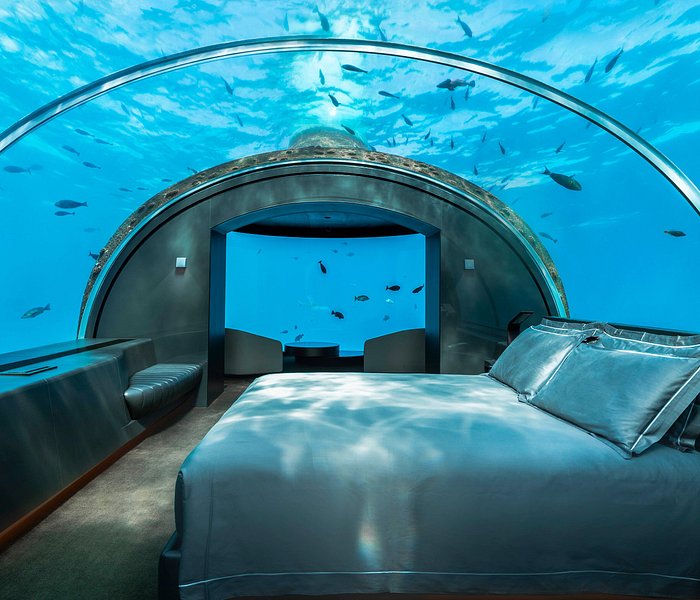

IMAGES
VIDEO
COMMENTS
First Time Safari Tip #3: Now! Now! Anyone familiar with "Africa time" will understand that there are several meanings to the word now. There is "now," "just now," and "now now." "Now" could mean anywhere from five minutes to two months later. "Just now" means in the next hour or so.
Tip #7: Know the safari daily schedule. Before you head out on your African safari, it's a good idea to get a sense for how your days will be scheduled. Most often, your daily schedule will be planned for you, so having a rough idea of each day's activities will help you with packing and planning.
15. Be Medically Prepared. Being medically prepared is one of the key African safari travel tips for first-timers. Before your trip, make sure you visit a travel clinic or consult with your healthcare provider, and check the CDC's recommendations to ensure you are up to date on any recommended vaccinations.
Best African safari tips for first-timers. Here are the best African safari tips you need to know before your trip. 1. Find out the best time to go for an African safari. Although Africa's wildlife will stay throughout the year, not every time is best for wildlife viewing and this is why you need to research the best time to go for a safari ...
Safari Tips. 1. Be open-minded and flexible. Every safari drive is unique and therefore unpredictable, so try not to stress about the things you cannot control. Sometimes you won't see much, sometimes you'll see a lot, sometimes the ride will take longer than expected, and sometimes it will be tougher than expected.
Our Top 10 Essential African Safari Tips — ALONG DUSTY ROADS. You first ever safari should bring you tears. The experience of witnessing creatures and beasts, part mythical, part prehistoric and becoming fewer in number each decade, literally six feet in front of you with no cage, barrier or interlocutor is something which should stir, emote ...
Yellow Fever vaccination card. COVID-19 vaccination card (CDC cards were accepted in both countries) First things first: Make sure your passport has six months of validity past your arrival date in Africa. Kenya and Tanzania both require travelers to have six months of passport validity to enter the country.
Here are some tips to keep in mind that can help make your trip stress-free and enjoyable: Tips 01: Choosing the destination. Tips 02: Timing your safari. Tips 03: Planning the trip length. Tips 04: Considering group size. Tips 05: Setting your budget. Tips 06: Choosing accommodations.
12. Bonus tip: Keep your blanket from your flight! A final word of wisdom: If you're given a blanket on your flight, keep it for early morning safaris. This is of course, if your luggage allows. Early mornings are bone-chilling cold, combined with the wind from being in an open-air jeep.
While many of these tips will be helpful for any African safari trip, they are primarily focused on Tanzania and Kenya. Select a Quality Tour Operator. Experienced guides with knowledge of the terrain and an understanding of the animals' movements will maximize your safari adventure by increasing your wildlife encounters.
In general, the greater the magnification, the narrower the field of view. For an African safari, choose a pair with a field of view of at least 330ft at 1000 yards. 5. Magnification Power. Binoculars are fitted with a series of numbers, like 8 x 42 or 10 x 50. The first number represents the magnification.
Use our Africa Safari Travel Guide to make it the best it can be as you connect with one of Zicasso's safari experts for access to off-the-grid preserves, the best big game experiences, and so much more. Help Me Plan My Trip. Best Time to Go on an African Safari. The best time for an African safari is during the southern hemisphere's winter ...
An African safari offers a wide range of exciting activities and unique experiences that allow you to immerse yourself in the beauty and wonder of the African wilderness. Here are some of the top safari activities and experiences to consider: Game drives: Game drives are a quintessential safari experience.
Tips on choosing an African safari. Below is a brief description of our African safari experiences and what we learned as a result, much of it framed as tips on choosing and booking an African safari. Tip 1: Choose your region. Africa is a massive continent of 54 countries. Ten are renowned for world-class safari experiences: Botswana, Kenya ...
An African safari is the ultimate adventure, and as you consider your dream trip, our top African safari tips can help you personalize your experience for an unforgettable wilderness vacation. A perfect safari conjures images of remote regions that offer intriguing and breathtaking landscapes, where classic lodges and luxury tented camps sit ...
A binocular is one of the most important things you should add to your Africa packing list. In fact, an African safari is not complete without them. I am sure you've seen so many photos of tourists in Africa with binoculars. It is not just for style but rather to get a closer look at the beauty that reigns in Africa.
Packing for Africa depends on where you're going as well as what time of the year you're travelling. If you're going on safari, it's wise to pack decent walking shoes, light or neutral coloured clothing, and a warm top or jacket for the evenings. A sunhat is vital, as are sunglasses, binoculars, a camera, spare batteries or a charger ...
If you're getting ready for an African safari we have you covered. We'll never forget our first safari in Africa. It was our third day on the continent and w...
Packing for an African safari is somewhat different to most other trips you'll take. Navigating rural roads in an open-top jeep means that you'll get covered in dust, so you'll need clothes that hide dirt well. Because temperatures can change dramatically throughout the day, layers are essential (after all, pre-dawn game drives are often chilly even in the height of summer).
3. Best time to visit. The best time of the year for safaris is during the dry season. Indeed, in the rainy season, water and food are plentiful. Animals tend to be more dispersed throughout the parks and game reserves. Also, grass is much longer in some areas, making it more difficult to spot the wildlife.
At SafariBookings, we know this only too well. That's why we want to equip you with some of our tried and true Safari Travel Tips. They will help you plan a safari without any mishaps. 1. Travel Insurance. As soon as you confirm your travel plans, take out travel insurance. Select a policy that covers cancellation, medical illness, emergency ...
Tips For An Outstanding African Safari Adventure. The foundation of a great African safari is effective communication. It makes sure you get the best possible experience out of your trip by ...
Safari Photography: Tips, Best Cameras and More. Africa's emerald savannahs, a thick-maned lion silhouetted against a fiery sunset, elephants meandering by a serene waterhole or the intense gaze of a leopard concealed in the underbrush — these are moments that avid travelers and photographers dream of capturing.
Top tips for the best African walking safaris to ensure your walking safari is a safe and affordable adventure of a lifetime. Toll Free Numbers: 1-888-414-6513 -808-189-1052, All Other Countries - +27 21 791 0878. Find Your Tour Find Tours Heavy Discount Specials Inquire / Contact Us Inquire. Client Reviews; Safari Blog;
In Africa, it is customary - but not obligatory or mandatory - to give tips to service staff in gratitude and thanks for good service. Gratuities can be increased or decreased depending on the level of service you are given: a high tip for exceptional assistance or a low one for going-through-the-motions, just-doing-my-job mediocre service.
Reveal the beauty of Sub-Saharan Africa with our guide to the top 10 travel destinations. From awe-inspiring safaris to cultural treasures, explore Africa's diverse wonders. Plus, get valuable tips and destination-related travel information to make the most of your adventure.
Spending money, tips and cloth on safari and Kilimanjaro. May 15, 2024, 9:39 AM. Hey fellow travellers, we are going to Tanzania as a family of 4 in July. 2 adults, 2 teenagers. The boys have booked 9 days Kilimanjaro track and we girls are going on safari. My questions would be if anyone has recently been to Tanzania and what currency the ...